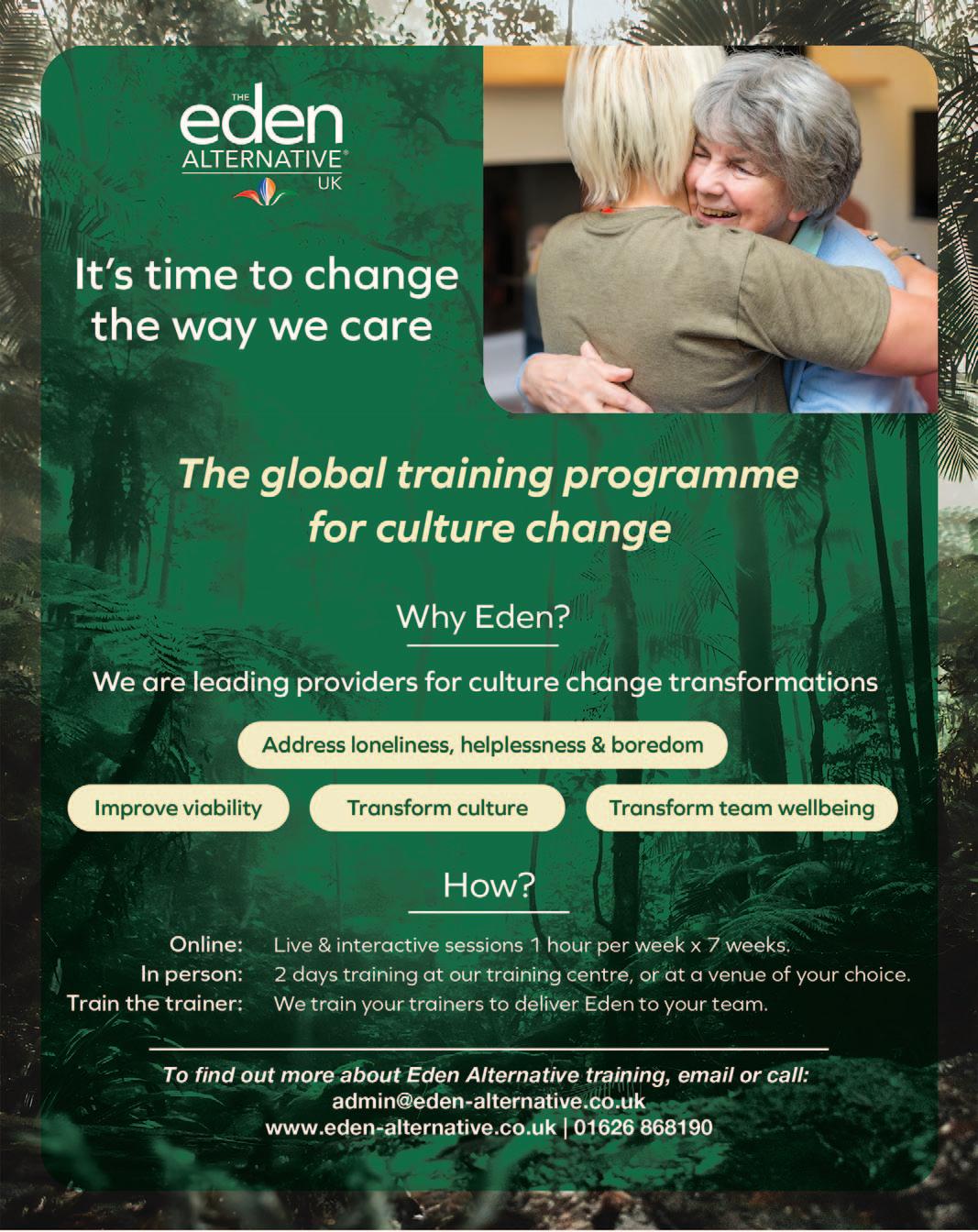















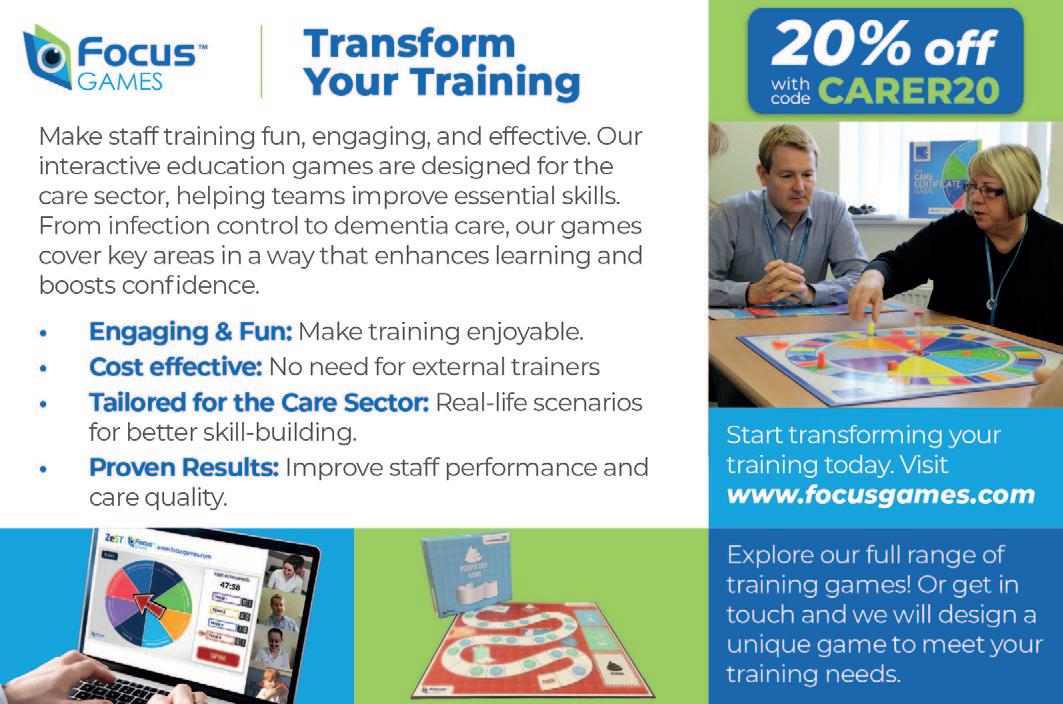
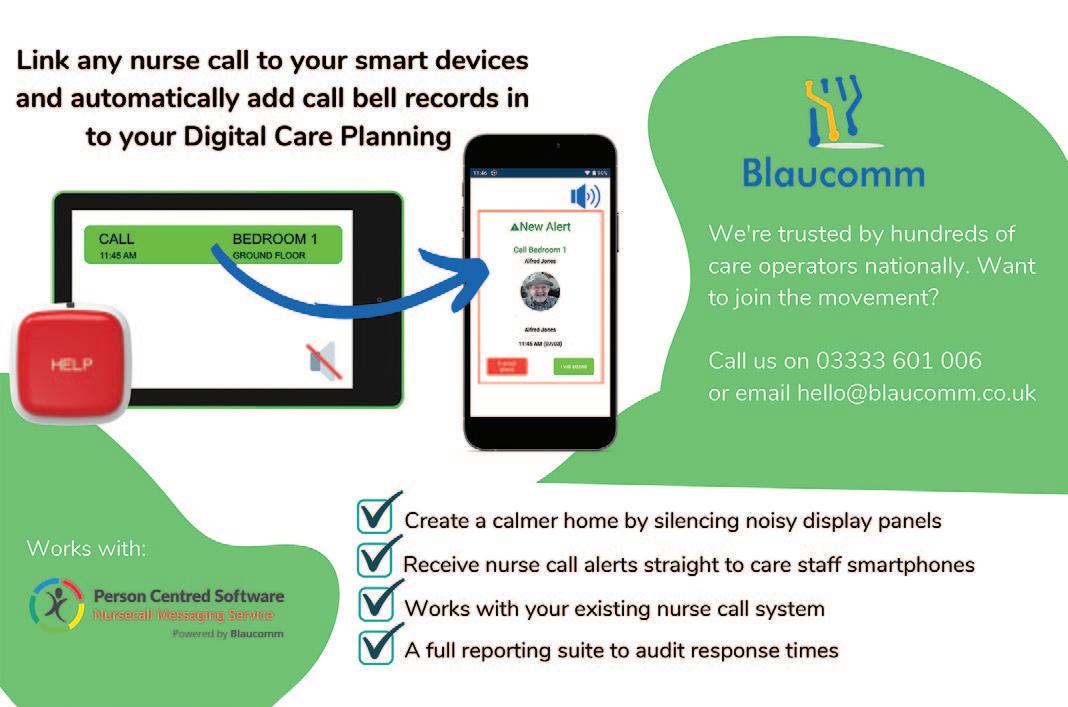
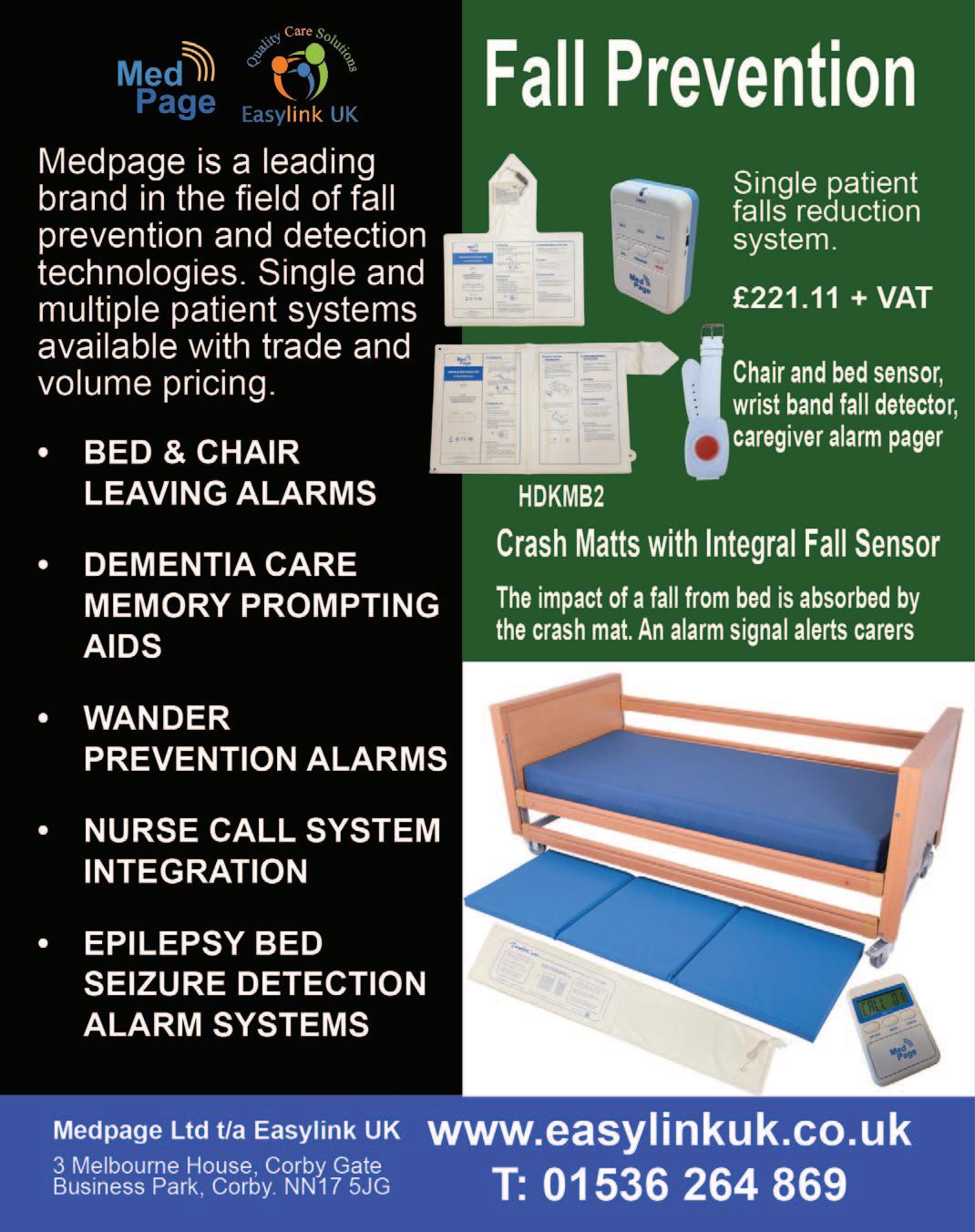
The Carer is published by RBC Publishing Ltd, 3 Carlton Mount, 2 Cranborne Road, Bournemouth, Dorset, BH2 5BR. Contributions are welcome for consideration, however, no responsibility will be accepted for loss or damage. Views expressed within this publication are not necessarily those of the publisher or the editorial team. Whilst every care is taken when compiling this publication to ensure accuracy, the publisher will assume no responsibility for any effects, errors or omissions therefrom. All rights reserved, reproduction is forbidden unless written permission is obtained. All material is assumed copyright free unless otherwise advised.

In my years reporting on the highs and lows of the social care sector—its achievements, its disappointments, and its resilience—I have never witnessed a crisis as profound as the one we now face.
The latest King’s Fund Social Care 360 report (front page) paints a stark picture of a system in turmoil, where the combined pressures of rising costs and reduced local authority funding threaten the very fabric of care provision in the UK.
Chancellor Rachel Reeves' recent budget, with its increases in National Insurance and the Minimum National Wage, has placed an unmanageable burden on care providers.
The report warns of a “real risk that even more people who need care will have to go without” as providers increase fees to cover rising staffing costs and councils, under mounting financial strain, cut the number of individuals they support. This is not just an administrative challenge; it is a direct threat to the most vulnerable in our society—the very people the sector exists to protect.
Fortunately, these unsustainable measures have led to the inception of Providers Unite, an urgent coalition of care providers demanding immediate government intervention. Immediately following the Chancellor’s budget announcement, Nadra Ahmed CBE, alongside the Board of the National Care Association and 150 other providers, wrote a joint letter to the Chancellor, urging a review of these damaging policies. Their message was clear: without intervention, we face the systemic collapse of community care services across Britain.
This call to action culminated in a Day of Action on February 25, an event I was honoured to attend and support. (See page 26).
Speaking directly to providers, workers, and sector leaders gave me a unique insight into the sheer scale of the crisis—an insight those in power rarely seek. These conversations confirmed what we have long feared: without urgent reform, social care is heading towards an unsustainable future, where those in need are left without the support they deserve.
While it was disappointing—though unsurprising—that Parliament rejected the House of Lords motion to exempt social care from the Chancellor’s tax increases, this fight is far from over. In fact, it has only just begun. I am pleased to welcome an article in this issue from Providers Unite founder Nadra Ahmed CBE, Executive Co-Chair of the National Care Association, and her dedicated team. (See page 4.)
Their work is vital in ensuring that social care remains at the forefront of political and public discourse.
Now, more than ever, we must make our voices heard. I urge you to visit Providers Unite, lend your support, and show the government why they must #ValueSocialCare. The future of our sector—and the wellbeing of those who rely on it—depends on it.
I can always be contacted at editor@thecareruk.com

Published by

In her October 2024 autumn budget, Chancellor Rachel Reeves increased the rate of employers’ NICs by 1.2 percentage points to 15% and slashed the threshold at which the tax starts being paid from £9,100 to £5,000 to raise £26 billion a year.
She also announced that the national living wage will increase by 6.7% for employees aged 21 or older – from £11.44 an hour to £12.21 –from April.
Multiple voices across the sector have continually expressed concerns about the consequences of costs from national insurance contributions (NICs) and wage increases, which led to a ProvidersUnite day of action attended by thousands of care workers and organisations across the UK outside of parliament in February.
Simon Bottery, Senior Fellow at The King’s Fund and lead report author, said:
‘The increase in the minimum wage has been richly deserved by care workers but hasn’t been fully funded by government. As a result, we have seen a ‘doom loop’ in which social care providers have sought large fee increases from local authorities, which in turn have had to cut the number of people they support to make ends meet.”
‘Now, just as that situation was starting to improve, it runs the risk of worsening again because of the big increase in staffing costs stemming from the rise in employers’ National Insurance contributions, which has hit social care particularly hard. Unless the government makes sure local authorities have enough money, there is a real risk that even more people who need care will have to go without.’
“Together the findings paint a picture of a social care system under immense strain, with local authorities struggling to meet demand, providers worrying about staying in business, and many people in need of care forced to either pay for their own care, rely on family and friends or go without. Yet the government has cancelled reforms that were due to be introduced in 2025. Instead, it has appointed a commission to be led by Baroness Louise Casey, which will not fully report until 2028.”
Bottery added: ‘The timescale of the commission is disappointing, but it presents the best available opportunity to bring about the vital reform that is needed. The issues themselves are not hard to identify; many of them are set out in our new analysis. The real challenge is to agree on solutions and for the government to have the political will to implement them.’
Local authorities, which fund most social care in England, have been forced to pay much higher fees for care because the introduction of the National Living Wage in 2016 has pushed up the cost of providing it. While the pay increase for care workers has been welcome and necessary, to balance their books local authorities had to reduce the number of people they support, despite increasing demand for social care services.
“DOUBLE WHAMMY”
This trend has changed in the past two years thanks to increased
funding, but The King’s Fund warns that the cycle may be about to repeat itself because local authorities are now seeing increasing financial problems and face, as described above, a ‘double whammy’ of staffing costs, with minimum wage increases combined with the rise in National Insurance contributions that the government announced in the Autumn Budget.
There are also fears from care providers that a planned ‘fair pay agreement’ in social care, while welcome, will further add to costs unless it is fully funded.
The new analysis shows that although councils spent more on care, the number of people they could afford to support with long-term care actually fell between 2015/16 and 2023/24. Social Care 360 finds that: between 2015/16 and 2023/24, care worker pay increased by 17% in real terms, due to the National Minimum Wage.
over the same period, 2015/16 to 2023/24, the fees local authorities had to pay to independent care providers increased by 33% in real terms for older people’s care homes, by 13% for working-age adults care homes, and by 18% for homecare.
however, across those same eight years, the number of people supported with long-term care by local authorities fell, from 873,000 in 2015/16 to 859,000 in 2023/24. The fall was driven by a 4.8% reduction in support for older people, from 587,000 to 559,000.
Professor Martin Green OBE, Chief Executive of Care England, said: “The King’s Fund report paints a bleak but accurate picture of a social care sector at breaking point. While the increase in the National Living Wage was both necessary and well-deserved for care workers, it has not been fully funded by the Government. This has created an impossible situation for providers, who are being forced to choose between financial survival and maintaining the level of care that individuals and families rely on.”
“The Government’s failure to fully fund wage increases, alongside its decision to delay critical reforms, is forcing care providers into an impossible corner. The notion that the sector can simply absorb rising costs without additional support is not only unrealistic but fundamentally negligent. Cancelling planned reforms and instead commissioning another review, one that won’t report until 2028, shows a complete disregard for the urgency of this crisis. The social care system does not have the luxury of time”.
“This report lays bare the brutal reality of the social care funding crisis. The Government’s refusal to prioritise adult social care is not just short-sighted; it is actively contributing to the deepening collapse of the sector. Without urgent intervention, we will see a wave of provider closures, increasing unmet care needs, and more pressure on families and the NHS. The Government cannot continue to turn a blind eye. It must act now to break this ‘doom loop’ and give social care the investment it so desperately needs, because the cost of doing nothing is simply too high.”
Kathryn Smith, Chief Executive of the Social Care Institute for
Excellence (SCIE)said: “The report lays bare the stark reality of unmet need in adult social care. With 2.1 million new requests for support in 2023/24—a 15% increase since 2015/16—it is clear that demand is rising rapidly. Particularly concerning is the 31% increase in requests from working-age adults, a group too often overlooked in discussions about social care. Yet, despite this surge, access to support remains deeply uneven, with many individuals falling through the cracks.”
“The report also highlights that the reliance on means-testing and local funding variations means that where you live and what you earn can determine the level of support you receive. This leaves many without the care they need to live with dignity and independence.”
“Although social care spending has risen to £32 billion, this increase has not been enough to close the widening gaps in provision. Persistent workforce shortages—exacerbated by low pay and a lack of recognition—further deepen these disparities.”
“The forthcoming Casey Commission is a critical moment for change. SCIE welcomes this opportunity to reimagine a care system that is fairer, more sustainable, and focused on tackling inequality. The Commission’s ambition to establish a National Care Service with consistent national standards is an important step in addressing the postcode lottery that leaves too many without the care they need.” OCCUPYING NHS BEDS
Royal College of Nursing General Secretary and Chief Executive Professor Nicola Ranger said: “Social care has long been the forgotten part of the health and care system. Thousands of people well enough to leave are occupying hospital beds due to a lack of suitable care at home or in the community, while patients being treated in hospital corridors has become routine.”
“At the heart of this is a social care system with funding falling increasingly short while the number of nursing staff is not keeping pace with demand. We must urgently see investment to boost the community nursing workforce, or the pressures on the NHS will only get worse and the most vulnerable in society will continue to pay the price.”
Other findings from Social Care 360, which looks at requests for support, usage with age and staff vacancies, include: requests for support continued to rise in 2023/24, reaching 2.1 million.
The highest increase was among working-age adults, which rose 8% to 658,000. Requests from older people rose 3% to 1.43 million
• new data shows how usage of social care increases with age: around 1.5% of the population is receiving publicly funded social care but this varies, from 0.7% of 18-24 years old to 11.7% of people over 85 care worker vacancies fell to 8.3% in 2023/24, driven by a large increase in the number of overseas staff. Between March 2022 and March 2024, around 185,000 people started direct care roles after arriving from abroad.
An independent commission into adult social care, led by Baroness Louise Casey, is due to begin in April.
A first phase is due to report in mid-2026, but the Government has said a second phase, making long-term recommendations, might not report until 2028.


The UK’s social care sector stands at a crossroads. Increasing financial pressures, legislative setbacks, and workforce challenges have placed immense strain on community care provision. Deliving essential community care and support services for more than 1.2 million individuals and employing a dedicated workforce of 1.59 million, these organisations make a direct contrubution to the economy valued at £68.1 billion.
The critical factors led to the inception of Providers Unite (www.providersunite.co.uk), trace back to November 12, 2024, when Nadra Ahmed CBE, alongside the Board of the National Care Association and 150 other providers, penned a joint letter to the Chancellor. They urgently called for a review of the impending increases in employer National Insurance contributions and the National Living Wage, cautioning that without intervention, these measures could precipitate a systemic collapse of community care services across Britain. Since then, the coalition has grown exponentially, bringing together more than 4000 thousands of voices to advocate for fair funding and policy reforms.
HOW THE PROVIDER UNITE DAY OF ACTION UNFOLDED
On February 25, 2025, over 3,000 individuals mobilised in a historic Day of Action. This monumental event aimed to spotlight the escalating challenges confronting the community care and support sector, exacerbated by Chancellor Rachel Reeves’ recent budgetary measures, and to advocate for sustainable solutions to ensure the sector's survival.
The day's proceedings commenced at Church House in Westminster, where participants congregated. The atmosphere was charged with a palpable sense of purpose as care providers, workers, recipients, and advocates prepared to voice their collective concerns. A peaceful march ensued, leading the assembly to meet with a delegation of Liberal Democrat MPs, including Alison Bennett, Helen Morgan, and Daisy Cooper, opposite the House of Lords. The march continued towards Westminster Hall, where over 1600 participants engaged in Green Carding MP’s, while others moved towards Parliament Square, where they continued their peaceful demonstration, singing “Who Cares,” led by Ivor Novello award nominee Boo Hewerdine, symbolising both the unity and the pressing needs of the sector.

Link https://thecareworkerscharity.bandcamp.com/track/who-cares
Testimonals on the day were numerous. Linda Bryant, CEO of Together for Mental Wellbeing, reflected;
“Tuesday 25th February 2025 was a historic day for the social care sector. It was the first time that thousands joined together, united in the cause of highlighting the essential lifeenhancing, life-enabling, and life-saving work of social care providers.” THE CRUX OF THE MATTER
The primary impetus behind the Day of Action was the sector’s escalating financial strain. The Autumn Budget of 2024 introduced measures

that significantly increased operational costs for care providers, putting services at risk and leaving millions uncertain about the future of their essential support.
The Providers Unite Survey (Feb 2025) captured responses from 570 providers which indicated; 47% will hand back existing contracts to local authorities or the NHS due to unsustainable fee uplifts.
Charting the path forward through strategic Initiatives and collaborative efforts
The demonstration coincided with a significant legislative development, a proposed amendment to the National Insurance Contributions (NIC) Bill, which sought to secure financial relief for care and support providers.
Following the Day of Action, the coalition quickly intensified engagement with MPs nationwide. Over 2000 individual providers and staff they employ wrote personal letters highlighting the real life challenges and seeking their MPs support to back the Bill amendments. Regional provider groups also engaged with MPs and show first hand the potential impacts on services in their constituencies. This concerted effort had by the 18th March seen more than 140 MPs responding in support of the campaign.

At the same time, Providers Unite continued with it’s nationwide awareness raising using social media and public outreach to educate citizens about the value of social care and the sector’s challenges.
Despite this widespread support, the House of Commons rejected the National Insurance Bill amendments on March 19, 2025, with a vote of 307 to 182. The Exchequer Secretary, James Murray MP, dismissed concerns, during the House of Commons debate prior to the vote, while disregarding the amendment’s potential to provide critical financial relief, not only to our sector but those running Hospices, Pharmacies and GP services.
Nadra Ahmed CBE, Executive Co-Chair of the National Care Association, did not mince words when addressing the rejection of the NIC Bill amendment:
“Today, we bear witness to a devastating blow that seals the fate of thousands of care providers. The government has dismantled the core principles of the Care Act 2014, abandoning millions who rely on vital support. This is intolerable, and we will take further action. We call on thousands more care and support providers to join us in ensuring that the most marginalised members of our communities are protected.”
The journey toward sustainable reform is ongoing. It necessitates unwavering solidarity, persistent advocacy, and collaborative efforts from all stakeholders including care and support providers, care recipients, policymakers, and the public alike.
To strengthen its advocacy, the Providers Unite coalition is gathering extensive data, tracking care service closures and monitoring council funding decisions. In response to the ongoing challenges, it is also considering escalation tactics, including potential legal action, to maintain pressure on the government and local authorities.
As the sector navigates financial uncertainity, the ethos of unity and resilience embodied by Providers Unite offers a beacon of hope. Through concerted action and steadfast commitment, there is a real opportunity to secure a sustainable and thriving future for everyone who depends on social care in our country. For more coverage of the Day of Action for care, see page 26.
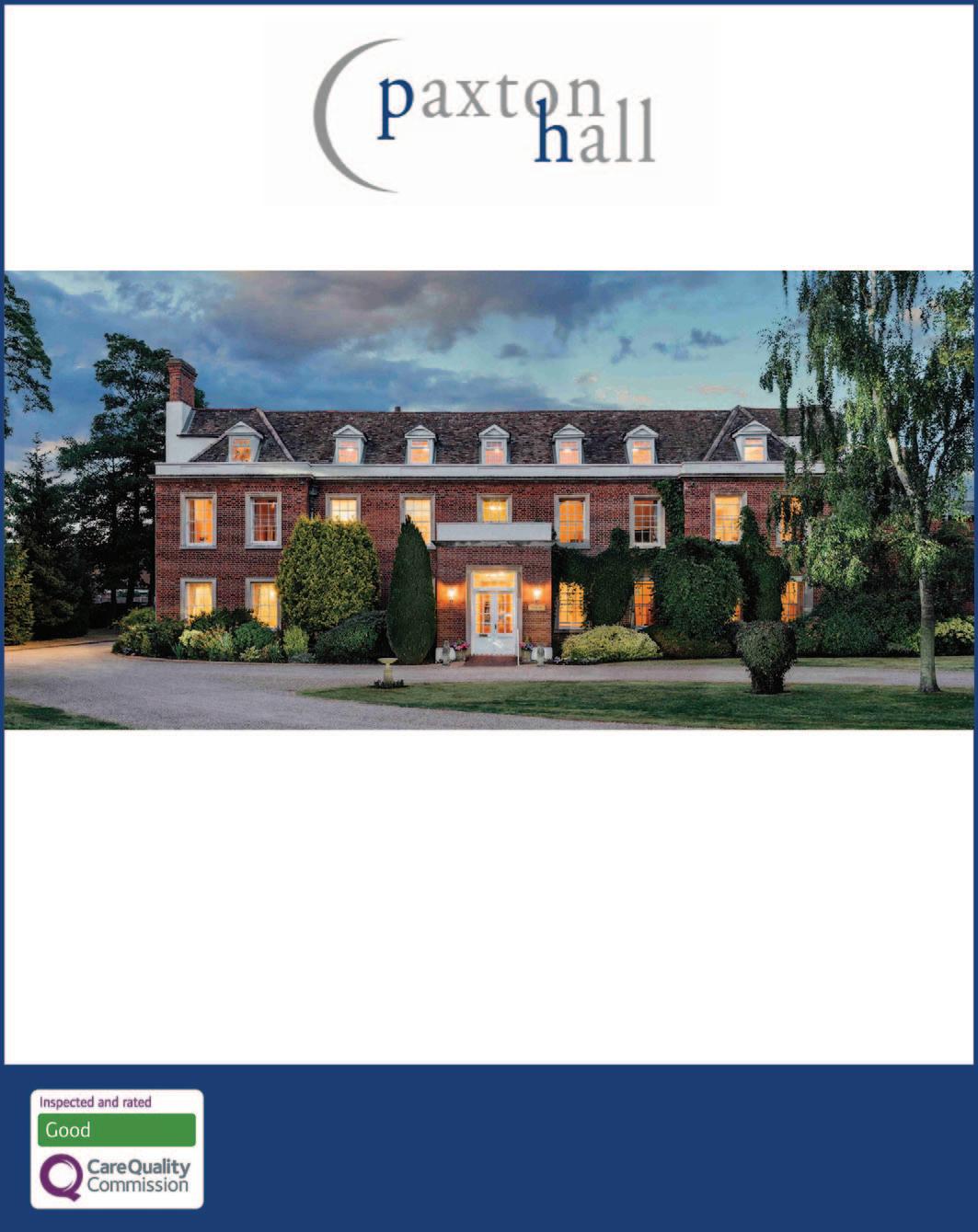
The government has announced new rules for care providers recruiting international care workers, which will take effect from 9 April 2025.
Under the revised sponsorship requirements, care providers in England must first try to recruit an international worker who is already in the UK and in need of sponsorship before hiring from overseas.
This, the government says, ensures that those who came to the UK to pursue a career in adult social care can do so and will help end the reliance on overseas recruitment as it seeks to “restore order” to the UK immigration system through its Plan for Change, which sets out a comprehensive plan to restore order to what is says is a “broken immigration system”, linking immigration, skills and visa systems to grow domestic skills, end reliance on overseas labour and boost economic growth.
As well as continuing to tackle exploitation, the government is also continuing its clampdown on abuse in the immigration system with changes to the Short-Term Student route.
Seema Malhotra, Minister for Migration and Citizenship, said:“Those who have come to the UK to support our adult care sector should have the opportunity to do so, free from abuse and exploitation.”
“We have already taken action to ensure employers are not able to flout the rules with little consequence or exploit international workers for costs they were always supposed to pay.”
“We are now going further, requiring employers in England to prioritise recruiting international care workers who are already here and seeking new sponsorship, before recruiting from overseas.”
‘The new requirements continue government action announced in November to crack down on employers who abuse the visa system; barring those who repeatedly break immigration or employment laws from hiring overseas workers and will help support those workers into new jobs.”
The changes announced last year also ban companies from charging workers for the cost of their sponsorship, which has never been intended and led to exploitation, unfair treatment of staff and unsustainable levels of debt in the care sector.
Between July 2022 and December 2024, the government has revoked more than 470 sponsor licences in the care sector to clamp down on abuse and exploitation. More than 39,000 workers have been associated with these sponsors since October 2020.
The new changes will also see the minimum salary thresholds updated to reflect the latest data from the Office for National Statistics (ONS). This will ensure those working on the Skilled Worker visa, including care workers, are paid a minimum of £12.82 per hour.
Health and education occupations, including doctors, nurses, allied health professionals and teachers, will also see their mini-
mum rates increased to reflect the latest national pay scales.
Stephen Kinnock, Minister of State for Care, said: “International care workers play a vital role in our social care workforce. We value their contribution and work supporting vulnerable people across the country every day.”
“As we crack down on shameful rogue operators exploiting overseas workers here in the UK, we must do all we can to get the victims back into rewarding careers in adult social care.”
“Prioritising care workers who are already in the UK will get people back to work reducing our reliance on international recruitment, and make sure our social care Responding to the announcement, the Royal College of Nursing head of independent health and social care, Claire Sutton, said: “It is encouraging that the government is taking steps to support those who have lost their sponsorship to stay working in the UK.
“However, without significant reform staff will still be left at the mercy of employers who unfairly withdraw visa sponsorship, leaving care workers just a matter of weeks to find a new sponsor.”
Oliver O’Sullivan, Director of Immigration, Migrate UK said: “Since the Skilled Worker Health and Care visa was introduced in August 2020, there was a very significant number of visas issued in the category. It has since transpired that a lot of people were being offered sponsorship, for which they were covering the entire costs and upon arriving to the UK were discovering that there was no position for them to fill. Other sponsors had been sponsorship multiple workers to fulfil a future contract, which then did not proceed. This means that there is an unknown number of Skilled Worker Health and Care visa holders who are in the UK without sufficient employment and held in limbo.”
“From 9 April 2025, the Home Office will introduce a requirement for future sponsors of workers in the Health and Care category to demonstrate that they have been unable to find a suitable worker from this pool of workers. Amendments are being made to the rules regarding approving a visa in this category, meaning that a visa can be refused if there is not sufficient evidence that they have attempted to recruit a worker under this provision."
Oliver O’Sullivan added: “The minimum salary requirement for Skilled Worker Health and Care visa holders will increase from 9 April to £25,000 per year (£12.82 per hour). Additionally, the going rate for several occupations for the Skilled Worker visa route are being amended, with minor increases in some cases and minor decreases in others. Employers will need to check the most recent salary before assigning a new Certificate of Sponsorship to a Skilled Worker applicant.”
Since 2022, Carlton Court has been proudly partnering with Hertfordshire University to provide nursing students with an enriching six-week placement in community care. This collaboration offers students a unique opportunity to engage with residents, build meaningful relationships, and gain hands-on experience in delivering compassionate, person-centred care.

During their placement, students from the university's nursing degree program learn how to connect with residents and provide empathetic care in a supportive environment. Through these interactions, students develop essential communication and interpersonal skills, creating a solid foundation for their future careers in healthcare.
One of the key aspects of the placement is the opportunity to explore the differences between hospital-based care and community nursing. Students witness firsthand the challenges faced by community nurses, managing diverse residents’ needs in a less structured environment. They gain invaluable experience caring for residents with different types of dementia, learning to

tailor care plans to meet the specific needs of each individual. This exposure enhances their understanding of dementia care, builds their clinical skills, and helps them confidently manage complex, long-term conditions.
The placement also encourages students to think critically and grow in leadership. By assessing residents’ needs, making informed decisions, and taking initiative, students improve their clinical judgment and their ability to collaborate effectively with multidisciplinary teams.
This partnership not only benefits the nursing students but also enhances the work environment at Carlton Court. Team members are encouraged to reflect on their own practices and benefit from training sessions offered by the university, covering the latest care techniques and research.
Ultimately, the collaboration strengthens the quality of care at Carlton Court while providing students with the tools they need to become skilled and compassionate nurses, ensuring the future of high-quality care in the community.

The National Institute for Clinical Excellence (NICE) published further draft guidance for public consultation that continues to not recommend Alzheimer’s treatments donanemab and lecanemab.
NICE said that its independent committee said last year that the medicines showed too little benefit to justify the significant additional cost to the NHS of providing and administering them.
The committee asked for some additional evidence to be provided, which has now happened, and the committee has considered this. Unfortunately this has confirmed that the medicines are not currently cost effective and the committee’s recommendation remains that they should not be provided on the NHS at this time.
NICE draft guidance will allow stakeholders to comment on the key new conclusions the independent appraisal committee reached at its second meeting, and will be providing the companies and other stakeholders the opportunity to submit new evidence or commercial proposals that might address the issues that have so far been a barrier to the use of these new treatments in the NHS.
The cost-effectiveness estimates for donanemab and lecanemab remain substantially higher than we can consider an acceptable use of taxpayers’ money and NHS resources.
The evidence presented so far shows neither donanemab nor lecanemab provide enough benefit to justify the substantial resources the NHS would need to commit to implement access to them, even with a managed access arrangement.
Social Care TV continue to fly the flag for highest quality online training for Health and Social Care, after unwavering commitment to excellence within the sector for over 25 years.
Their widely-used health and social care specific courses - produced and edited in-house - are expertly designed to make learning engaging, informative and, therefore, highly effective for learners.
Accredited by CPD, training with Social Care TV is quality assured, comprehensive and relevant.
As one of the leading online training providers in the health and social care sector in the UK, they supply training for local authorities, recruitment agencies, care home groups and other health and social care organisations.
Their feature-rich Manager platform has further been enhanced this year with the introduction of several new Manager tools designed to aid with compliance, reporting and trainee management. Features now available include:
• Compliance Dashboard with Traffic Light System
• Downloadable Trainee Matrix
• Custom Bundles
• Trainee Groups
• Bulk Uploads
Stakeholders are particularly encouraged to comment on the committee’s latest conclusions regarding managed access arrangements and evidence requirements.
Managed access arrangements can allow NHS patients to use promising and potentially cost-effective medicines for a fixed period, at a discount to manage the uncertainty to the NHS, while further evidence is gathered on how those medicines can be provided and how well they work outside clinical trials.
The public consultation on our draft guidance on donanemab and lecanemab will close on 27 March 2025.
The independent committee will consider all responses, including additional analyses, at a third committee meeting before producing its final draft recommendations.
Professor Fiona Carragher, Chief Policy and Research Officer at Alzheimer’s Society said: “These NICE recommendations will remain disappointing for people eager to see these treatments readily available, though we continue to respect the decisions of the regulator. We appreciate their rigour and flexibility in their review of the first disease modifying treatments for Alzheimer’s disease.”
“We hope that learnings from this process will pave the way for future treatments, and with over 120 other drugs in trials for Alzheimer’s disease we may see more drugs submitted for regulatory approval in the near future. Alzheimer’s Society will continue to be a voice for people affected by dementia in the appraisal of these emerging treatments.”

• Bulk Enrolment Onto Custom Bundles
• Course Enrolment Notifications
• Course Reminders
SCTV regularly release new and updated high-quality courses. Previews for all courses can be viewed at: Courses - Social Care TV (www.social-care.tv/courses/course-details)
To enhance their learners' experience further they have created free, comprehensive subject-specific workbooks which were rolled out across all courses this year. This unique addition provides excellent value and a fully robust training package.
SCTV are delighted to have won several awards over the last 12 months including:
• Best Online Health and Social Care Learning Platform’ – Global Health & Pharma Social Care Awards 2024
• ‘CPD Provider of the Year’ – The CPD Awards
• Social Care Training Provider of the Year’ - Corporate Livewire Innovation & Excellence Awards
Gold standard customer service remains a core staple of the business, with expert support and guidance provided via telephone, email and live chat. They place great importance on the training and development of their customer services team to ensure that they continue

to provide a personal, friendly and knowledgeable service. Their much-loved ‘Care Worker of the Month’ award recognises and rewards the selfless dedication shown by care workers across the UK and they proudly support the Care Workers Charity who aim to advance the financial, professional and mental wellbeing of social care workers.
SCTV believe that high quality training should be accessible to all and offer regular, free courses which include a digital certificate accessible via their website.
The company stands behind a clear mission and set of values which define their ethos and their dedication to both the Care Sector and those within it. These can be viewed at: Mission Statement and Core Values - Social Care TV (www.social-care.tv/about/mission-statement-and-core-values)
Social Care TV are a responsible business, committed to ensuring that their actions have a positive impact on their employees, customers, the wider health and social care community and the environment.
Above all, SCTV consistently strive to make a meaningful contribution to the wellbeing of those being cared for.
For



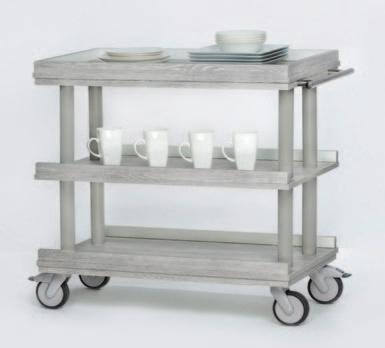







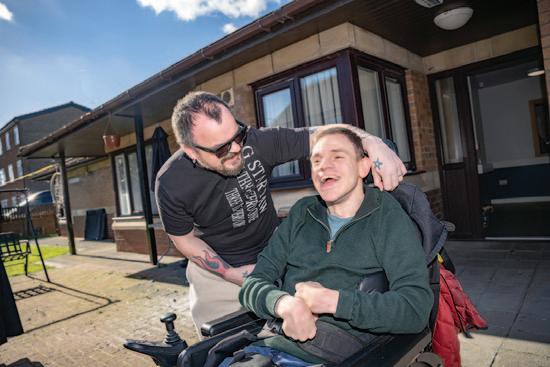
A new report launched by the independent national charity, Community Integrated Care, has exposed a persistent pay gap between social care support workers and their NHS counterparts. The charity is calling on the Government to take immediate action by uplifting care worker wages, arguing that fair pay is not only affordable, but a crucial investment in economic growth and the long-term sustainability of the NHS.
‘A Caring Economy – Unfair To Care 2025’ is the fourth edition of Community Integrated Care’s acclaimed Unfair To Care report series. It uniquely compares the pay of social care support workers to their NHS equivalents paid under Band 3 of the NHS Agenda for Change framework.
Using exclusive measurement by global leaders in job evaluation, Korn Ferry, the charity has determined that the role of a social care support worker is a skilled, accountable and complex one, revealing that the average care worker, currently earning £12.00 per hour, would take home £7,120 a year more doing a comparable sized role in the NHS.
The charity says that the consequences of this pay disparity are severe, including high turnover rates of 26.5%, equivalent to 285,000 leavers a year, combined with vacancy rates of 9.4% or 112,000 roles. These challenges create a cascade of far-reaching and negative impacts across society – reducing quality of life for people who access or work in care, undermining the viability of care providers and the efficiency of the NHS, and constraining economic growth.
Recent unfunded increases to employer National Insurance Contributions and the National Living Wage, totalling around £2.8 billion, have further exacerbated the problem, creating financial strain on care providers, with many having to make difficult choices to hand back contracts to local authorities, or in some cases, leave the care market entirely.
The release of this report comes at a critical moment as the Government reviews national social care policy, including proposals for a Fair Pay Agreement for care workers – acknowledging the urgent need for improved wages and the impact of low pay on the NHS. However, with the agreement not expected until 2027, at the earliest, Community Integrated Care warns that delaying action will only deepen the crisis; they claim that it will exacerbate workforce instability, continue to disrupt the lives of millions who depend on and deliver social care, and fatally undermine one of the Government’s three big shifts: moving care from hospitals to the community.
The charity argues that immediate action is needed and that increasing social care pay is both achievable and essential. Their estimates show that a 50p per hour uplift for the 1.29 million frontline care workers in England, would cost just £723 million per year (net) – a small proportion of the annual £32 billion in public spending on adult social care, and a fraction of the recent £25.7 billion NHS funding boost in the Autumn 2024 Budget. In return, fair pay would reduce costly staff turnover, improve retention, and enhance care quality – benefiting the entire health and social care system.
Previous reports have shown that providing parity of pay between social care workers and their NHS equivalents creates a ‘Social Care Triple Care Win’, improving economic growth, as lower paid workers reinvest additional wages in the local economy, increasing NHS capacity and efficiency, and transforming the lives of people who work in and draw on social care.
Teresa Exelby is the Chief Corporate Services & People Officer at Community Integrated Care, which employs over 6500 colleagues and delivers 10 million hours of publicly-funded support to 2500 adults with learning disabilities, autism, mental health conditions and complex needs. She said: “Once again, this year’s figures highlight the persistent undervaluing of one of society’s most vital workforces. Social care support workers are highly skilled, accountable, and emotionally resilient, delivering transformational care and support every day.
While steps toward a fairer pay framework are welcome, we cannot wait for 2027 for that to happen. That’s why we are urgently calling on the Government to fund an immediate interim pay uplift – not just because it’s the right thing to do for those working in and accessing social care, but because of the benefits it brings for wider society and the economy too.
Within our charity we’ve seen the transformational impact of raising pay and investing in carers – achieving an 80% retention rate, which is above the sector average. This stability enables us to reinvest, expand our impact, and support our teams to deliver high-quality care, but sustained progress requires proper funding. With the right investment, social care can thrive – offering sustainable, rewarding careers, empowering people to live their best lives, and driving economic growth and productivity.”
Phil Hope, former Minister of State for Social Care and co-author of the report, said: “A ‘Caring Economy’ is a two-way street – a strong economy funds the delivery of care and support, and the social care sector, in turn, drives economic growth and enhances NHS productivity.
The sector is vast and expanding, contributing an estimated £62.1 billion to gross value added in England. Yet, despite its undeniable impact, improved care worker pay remains a contentious issue, often deemed unaffordable. This report not only challenges that perception but also highlights the substantial economic returns it can offer – reducing welfare spending, creating employment opportunities, and stimulating spending in low-income communities.
In reality, the cost of increasing care worker pay could be far lower than assumed. Better wages lead to a more stable workforce, lower recruitment costs, and greater investment in training and innovation. It’s time to recognise social care spending as an investment in our economy and society – not just an expense.”

By Kathryn Smith OBE, Chief Executive

A major shift is underway at NHS England. With Dr. Penny Dash set to succeed Richard Meddings as Chair and Sir James Mackey set to succeed Amanda Pritchard as Chief Executive, an entirely new leadership team will now be responsible for developing and delivering the Government’s 10-Year Health Plan.
This transition comes at a crucial time—for both the NHS and social care. As Lord Darzi's investigation observed, the NHS’s financial and operational sustainability cannot be achieved without strengthening social care. Health and social care cannot function effectively in silos; they are interdependent—and adopting a holistic approach that considers someone’s journey across the health and social care systems is essential.
Social care plays a crucial role in alleviating the immense strain on NHS high-acuity services by reducing discharge delays and preventing unnecessary (and costly) admissions and readmissions—but also, and more importantly, allowing people to live rich and fulfilling lives. According to recent NHS England data, patients who are medically fit for discharge occupy 13,767 hospital beds per day.
The path forward is clear: Achieving the NHS reforms will depend on a parallel investment in social care services. This is the case for all three policy shifts expected in the NHS 10-Year Plan. Through local care services we can deliver personalised, high-quality, and financially sustainable services that meet the care needs of people in their communities and allow them to live independently for longer— thus improving NHS efficiency.
What’s needed is tangible investment and prioritisation of all community services to relieve the strain on local health and care systems.
However, in its current state, the social care sector faces significant and critical challenges: inflation, demographic and epidemiological changes, falling recruitment and retention, and rising demand are placing immense pressure on care and support services and impacting their quality and availability. As a result, the
sector relies heavily on unpaid carers who, sadly, often do not get the recognition or support they deserve.
As the new figures in the NHS leadership team settle into their posts, we encourage them to look backwards in order to pave a way forward. During the COVID-19 pandemic, SCIE observed both health and care leaders working more collaboratively. We found that NHS-funded post-discharge care packages significantly improved the timeliness of hospital transfers and reduced lengthy hospital stays.
The human case for joint investment is critical. Take intermediate care, for example. Intermediate care services are provided to patients, usually older people, after leaving hospital or when they are at risk of being sent to hospital. Our research indicates that 70% of people who received intermediate care after a hospital stay returned to their own homes, while 72% did not move to a more dependent care setting—giving them the crucial opportunity to maintain their independence, dignity, and quality of life.
The economic case for investment is also compelling: wider sector research demonstrates that every £1 invested in earlier action and support, including intermediate care, achieves an ROI of, on average, £3.17. Acting on known interventions shouldn’t depend on where the benefits accrue. We should consider the effects on ‘whole systems’ instead.
Beyond funding, we also need to find new ways to deliver social care more efficiently and effectively. For example, there are substantial opportunities to enhance post-discharge assessments and care, particularly through reablement services. Reablement is a short-term, intensive intervention aimed at helping individuals regain or maintain their independence after events like hospital admissions.
SCIE published a series of evidence-based and practical recommendations in 2024 in our ‘Supporting client and family engagement with reablement’ resource to address the barriers that can prevent people from fully benefiting from reablement. Resources like this can help streamline care delivery, ensuring that support is targeted, timely, and productive.
The Government’s vision is for an NHS that is both resilient and sustainable—but turning that vision into reality requires decisive action. The adult social care sector, employing approximately 1.59 million people and contributing approximately £68.1 billion to our economy annually, is a ‘sleeping giant’ of largely untapped potential.
If we get future reforms right, we can tackle the pressures facing both health and social care and create systems that are fit for the future.

Rad Tingle, kitchen manager at Ribble Court Care Home in Much Hoole, Preston, part of Sandstone Care, is set to take on a daring abseil challenge down Peel Tower in Bolton to raise funds for the Renal Unit at Lancashire Teaching Hospitals NHS Foundation Trust.
A committed fundraiser, Rad has supported several charitable causes over the past few years and has previously raised money for the hospital, where he was once a patient.
His dedication to giving back stems from personal experience—he suffers from von Hippel-Lindau (VHL) syndrome, a rare inherited genetic disorder that causes tumours and cysts to grow in various parts of the body, including the brain, spinal cord, eyes, inner ear, pancreas, and kidneys.
In 2020, Rad, who is blind in his left eye and deaf in his left ear, underwent a life-changing kidney transplant in Manchester after spending two years as a dialysis patient at Lancashire Teaching Hospitals.
Having seen first-hand the positive impact of charity funding on patient care and wellbeing, he has since embarked on a series of adrenaline-fuelled fundraising events, including skydives and zipline challenges. His dedication was recognised when he was shortlisted for Charity Fundraiser of the Year at the Best of Lancashire Awards 2023.
The pobroll® is the invention of Pat O’Brien, a physiotherapist, Moving and Handling trainer, and Conflict Management tutor with over two decades of experience in care homes and nursing homes
Care home managers often face challenges in delivering intimate care while balancing efficiency and managing costs, particularly when these essential tasks provoke behaviours that can be challenging to safely manage. Traditional methods—especially for bed-bound residents—often lead to lengthy processes and frequent linen changes, driving up costs and consuming valuable staff time. The pobroll® provides a transformative solution that supports dignified care, achieves significant cost savings, and reduces the need for additional staffing.
The pobroll® is an innovative bed-bathing wrap specifically designed to enhance comfort and dignity during personal washing for individuals who require in-bed care. Centred on the resident’s experience, it minimizes distress by providing sensory comfort. Crafted with two layers of high-quality cotton-terry toweling and a waterproof layer in between, it delivers a soothing, calming experience while keeping the bed completely dry. Sized for a standard single bed, the pobroll®’s dual-layer design offers warmth and a sense of security and privacy, allowing residents to maintain comfort and dignity during bed-based bathing routines.
BOOSTING COST SAVINGS AND OPERATIONAL EFFICIENCY
Rad said: “The Renal Unit played a vital role in my journey, and I want to give back in any way I can. Charity funding truly makes a difference to the lives of patients, and I hope my efforts will help support those going through similar experiences. I’ve tackled heights before, but this abseil will be a new challenge—one I’m ready to take on!
“Everyone at Ribble Court, and Sandstone Care has been very supportive and I hope to make them proud as well as raise lots of money for the hospital.”
Sandstone Care, which operates Ribble Court Care Home, is proud to support Rad in his fundraising efforts.
Steven Hamblett, operations director at Sandstone Care said: “Rad is an inspiration to everyone at Ribble Court and beyond. His resilience and passion for helping others are remarkable, and we are incredibly proud to support his latest fundraising challenge. We encourage everyone to get behind him and donate to this worthy cause.”

Rad’s abseil is set to take place at the end of March, with funds raised going directly to support the work of the Renal Unit at Lancashire Teaching Hospitals NHS Foundation Trust.
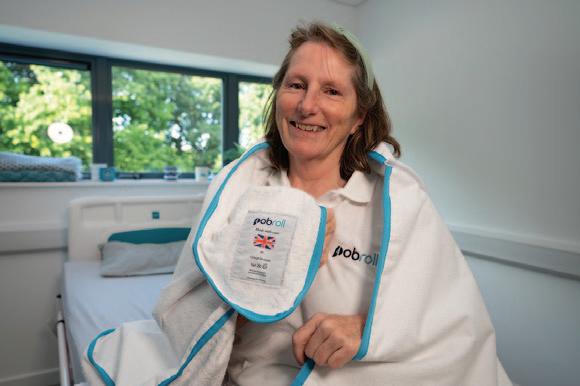
pobroll® provides an effective solution that supports both economic and environmental goals.
Managing resident agitation—particularly for those with dementia—often requires specialised training in restraint techniques. The pobroll® significantly reduces the need for physical intervention by providing a warm, secure covering that alleviates resident distress. This gentle approach minimizes aggressive or defensive reactions, reducing the number of staff needed for these interactions. As a result, facilities can potentially lower staffing levels without compromising care quality, yielding substantial cost savings. Additionally, reduced dependence on physical intervention decreases training costs associated with restraint techniques. By simplifying the process of intimate care, the pobroll® reduces the need for specialised training, making onboarding smoother and lowering turnover-related training expenses.
The pobroll® supports compliance with restraint reduction guidelines, helping facilities minimise documentation burdens and regulatory liabilities linked to physical interventions. This non-invasive solution improves safety for both residents and caregivers, fostering a culture of dignity and respect that boosts satisfaction among residents and their families.
CONCLUSION: A VALUABLE ASSET FOR QUALITY CARE AND COST MANAGEMENT
The pobroll®'s waterproof design enables caregivers to provide a complete wet wash without the risk of soaking the bed, minimising the need for frequent linen changes. This leads to fewer laundry loads, reducing labour and utility costs, as well as wear on linens. By reducing logistical tasks, caregivers have more time to focus on direct resident care, enhancing productivity overall. Additionally, reduced reliance on disposable wipes results in further cost savings and supports environmentally sustainable practices. With its durable, reusable design, the pobroll® maintains hygiene standards and allows for extended use across multiple residents. As care homes face increased pressure to adopt sustainable practices, the
For care homes, the pobroll® represents a strategic investment, offering measurable savings by reducing reliance on disposable products, lowering laundry and training costs, and enabling efficient staffing. Most importantly, it prioritises resident dignity and comfort, setting a high standard for compassionate, personcentred care. For facilities seeking to enhance financial performance and care quality, the pobroll® is an invaluable addition to their resources.
Fof further information, see the advert on the facing page.
The Care Workers’ Charity (CWC) has published a landmark report summarising key insights from a series of roundtable discussions on the future of adult social care in England.
Held in November 2024, these discussions brought together care workers, people drawing on care, unpaid carers, care providers, commissioners, and advocacy groups to examine the challenges facing the sector and ideas for reform.

The report outlines key priorities for reform, including the need to elevate the status of care work, ensure sustainable funding, and embed the voices of care workers and those drawing on care at the heart of decision-making. Any transformation must be properly resourced to be effective. Participants also called for a wider national conversation on how society values care, ensuring that reforms move beyond crisis management towards a system that supports dignity, autonomy, and fulfilling lives.
Among the core themes highlighted in the report:
• Centring Care Voices – Social care reform must be shaped by those most directly impacted: frontline care workers, people drawing on care, and unpaid carers. Their voices must be at the heart of decision-making.
• Workforce pay and conditions remain a critical issue, with strong support for a £15 per hour minimum pay
standard, career development pathways, and better training opportunities.
• Professionalisation of the sector, with calls for a national registration system and professional body for care workers.
• Funding reform is essential, with a need for multi-year financial settlements and equitable commissioning practices to ensure sector stability.
• Social care must be recognised as a distinct sector, working alongside, but not secondary to, the NHS.
• Addressing structural inequalities within social care, ensuring equitable access and working conditions for all.
Karolina Gerlich, CEO of The Care Workers’ Charity, said:
“This report is a call to action. Now could be a turning point for social care, but only if it is backed by sustained investment and shaped by those on the frontline. Our roundtable discussions demonstrated the urgent need for reform—not just in funding, but in how we value care as a society. This is about creating a system that works for care workers, for people drawing on care, their friends, family and wider community now and for the future.”
The Full Report is available to download at https://tinyurl.com/kny647n3
Hospice UK has welcomed the announcement of the allocation of the first £25m of additional government funding for the hospice sector in England, following the announcement late last year of an £100m funding package.
Toby Porter, CEO of Hospice UK, said: “The announcement before Christmas of £100m of additional funding for hospices in England was a significant boost, and today’s news of the allocation of the first £25m of this funding will be a huge relief for our members.
“Several years of rapidly rising costs have curtailed the extent to which hospices have been able to investin their infrastructure for the longer term. This additional support will enable them to do so – and relieve the immediate pressures on hospice finances.
“The hospice sector is ready to support the government’s ambition to shift more care into the community. This couldn’t be more important for people approaching the end of life, when it’s vital to have the right care, in the right place.
“The greater stability provided by the government’s funding injection this year and next gives us a golden opportunity to now reform the palliative and end of life care system, so it’s fit for the future.”
The initial £25m funding, which is being distributed via Hospice UK to eligible hospices this financial year (2024-5), will be followed by a further £75m next financial year (2025-6).
The capital funding is designed to help hospices improve their physical environment, improve efficiency by investing in digital technology, and increase hospices’ capacity to care for patients at home. The funds will help alleviate significant budget pressures in the sector.
Paul Bytheway, Chief Executive of Birmingham Hospice, said: “This additional funding is a boost after a very challenging year for Birmingham Hospice. We appreciate the government’s acknowledgement of the significant operating pressures the hospice sector has been under, and we welcome any investment that helps us to continue delivering services to those in our communities who need it most.”
Elinor Eustace, CEO of St Giles Hospice, in Lichfield, Staffordshire said: “We are incredibly grateful for this vital funding from the government, which comes at a crucial time for St Giles Hospice. This support will enable us to make meaningful improvements to our Inpatient Unit, enhancing the experience for patients and their families during what can be an incredibly difficult time. From upgrading patient facili-
ties to improving our family spaces, this investment will help ensure we can continue providing the highest quality end-of-life care for our local community.”
“While this immediate funding is essential and deeply appreciated, we remain focused on working with partners to develop sustainable long-term solutions for hospice care funding. Every pound invested in hospice care makes a real difference to families across our region when they need us most.”
Lisa Hunt, Chief Executive of Garden House Hospice Care in Letchworth, Hertfordshire, said: “Our costs have been increasing significantly in recent years as we grow our services to address the inequalities in accessing palliative care.”
“The acknowledgement of this pressure from the government is welcome and will make a real difference – helping us achieve our goal to keep patients out of hospital. We are eager to continue supporting the government’s mission to move more care into the community.”

Comment from Emily Cross, a dedicated end-of-life specialist and certified End-of-Life Doula with nearly a decade of experience supporting individuals and families through one of life’s most difficult experiences. (www.aura.life)

End-of-life care is a vital aspect of care home provision, ensuring that residents in their final days receive comprehensive physical, emotional, and spiritual support.
With over a fifth (20.5%) of deaths in England and Wales occurring in care homes in 2023, it is crucial to understand what end of life care entails, when it begins, and how it provides dignity and quality of life for residents and their families.
End of life care refers to the holistic approach taken to support individuals in the final phase of their life. This phase may last days, weeks, or even months, depending on the individual’s condition. The focus is on ensuring comfort, managing symptoms, providing emotional and spiritual support, and respecting the resident’s personal choices.
This care is delivered by a multidisciplinary team, including care home staff, GPs, nurses, and specialist palliative care professionals. The primary aim is to make the resident as comfortable as possible while upholding their dignity and preferences.
There is no single moment when end of life care begins—it varies depending on the individual’s health status. However, it typically starts when a resident’s condition significantly deteriorates, and medical professionals believe they are in the last year of life. Care plans are adjusted to prioritise comfort, symptom management, and quality of life over curative treatments.
For residents with chronic or terminal conditions, such as advanced dementia, end-of-life care may be a gradual process. In these cases, care homes work closely with families and healthcare teams to ensure personalised care plans are in place.
A major component of end-of-life care is symptom management, particularly pain relief. Many residents in care homes experience discomfort due to conditions such as cancer, heart failure, or neurological disorders. Care teams work with palliative care specialists to administer appropriate medications and therapies to ease pain and distress.
In addition to pain management, care home staff ensure residents remain comfortable by:
- Providing pressure relief to prevent bedsores
- Assisting with personal hygiene and continence care
- Managing nausea, breathlessness, and other distressing symptoms
- Ensuring proper nutrition and hydration, where possible
End-of-life care is not just about physical well-being; it also involves emotional and psychological support. Many residents face anxiety, fear, or depression as they approach the end of life. Care staff are trained to provide reassurance, companionship, and a listening ear.
Spiritual care is also a key aspect. Care homes often facilitate visits from chaplains or spiritual advisors, regardless of religious beliefs, to provide comfort and peace.
For families, the impending loss of a loved one can be overwhelming. Care homes offer bereavement support, regular updates, and opportunities for family members to spend time with their loved one in a calm and private environment. Some care homes even provide accommodation for relatives during this difficult period.
A fundamental principle of end-of-life care is respecting the resident’s wishes. Many care homes work with residents and their families to create an Advanced Care Plan (ACP), which outlines:
- Preferences for medical treatments
- Preferred place of care (e.g., remaining in the care home rather than
being hospitalised)
- Personal, cultural, and religious considerations
- Decisions regarding resuscitation and life-sustaining treatment
Dignity is central to every aspect of care, ensuring residents are treated with respect and compassion at all times.
As a resident nears the end of life, everyday tasks become increasingly challenging. Care home staff provide assistance with daily activities such as dressing, eating, and moving around. This practical support helps maintain as much normality as possible, allowing residents to experience comfort and familiarity.
Families are encouraged to participate in their loved one’s care, whether through feeding, reading to them, or simply holding their hand. These small actions can provide great comfort to both the resident and their relatives.
When a resident dies, care homes follow established procedures to ensure the process is handled with care and professionalism. These include:
• Notifying the family and offering immediate support
• Arranging for a medical professional to confirm the death
• Assisting with funeral arrangements and providing information on bereavement support
• Handling the resident’s personal belongings with sensitivity
• Many care homes also hold memorial services or tributes, allowing fellow residents and staff to pay their respects.
End-of-life care in care homes is about much more than just medical support—it is about ensuring a person’s final days are lived with dignity, comfort, and love. By focusing on physical, emotional, and spiritual needs, care homes provide a compassionate and structured environment for both residents and their families. Through careful planning, respectful communication, and unwavering support, end-of-life care offers a meaningful and dignified conclusion to a resident’s life journey.
Nothing could stop strong-willed 84-year-old Carol Stocks, who lives with dementia, from completing her mission to walk at least 30 minutes every day in February to raise funds for Dementia UK.
True to her word, Carol, a resident of Eckington Court Nursing Home in Derbyshire, walked for 28 straight days last month and surpassed her goal, raising over £150 for the charity.
Braving all weather conditions, Carol also inspired her friends and fellow residents at Eckington Court to join her on her daily walks.
Carol chose Dementia UK as the charity for her fundraising because, like many of her friends at Eckington Court, she is living with dementia. “The thought of the money raised going towards research into finding a cure for dementia kept me going,” she said.
Carol is a proud mother of two daughters and had a vibrant career as both a teacher and a window dresser.
Known for her outgoing personality, she’s always up for an adventure and loves to explore. Even now, she and her daughters regularly embark on exciting mini getaways, discovering new places and making lasting memories together.
At Eckington Court, Carol dives into every activity with enthusiasm - from crafting and knitting to bingo, music, and singing. Colleagues at the home describe her as ‘the life of the party, bringing energy and joy wherever she goes!’
Trudy Godley, Home Manager at Eckington Court Nursing Home, said: “We knew nothing was going to stop Carol once she put her mind to the task! Her enthusiasm was infectious, and quite soon many of us were taking part in Carol’s daily walks. We are incredibly proud of what she achieved.”

Many people with mental health needs are not getting the care they need, the Care Quality Commission (CQC) highlighted in a report published this week.
As part of its monitoring activity in 2023/2024, CQC interviewed over 4,500 people who were detained under the Mental Health Act or ‘sectioned’, covering 870 wards, and speaking to relatives and people who were previously detained. This year’s Monitoring the Mental Health Act report once again raises that a lack of staff, beds, and training, are leading to harmful gaps in care and treatment. With demand far outstripping capacity, there are not enough beds available, meaning people are placed far from home, their family, and their friends. One mother who was detained was placed 5 hours from home and because of this she didn’t receive any visitors during her time in hospital. Another woman had to wait hours in a police staff room, accompanied by two police officers, while a bed was sourced. There are not enough staff to support all patients, which is affecting people’s access to care and leading to people being restricted from going outside as there is nobody to supervise them, or in the most extreme cases, people being inappropriately confined.
While many people describe healthcare workers as “caring” and “wonderful”, there are ongoing concerns with staff numbers and training. In particular, not all staff have undertaken the mandatory training to understand the needs of autistic people and people with a learning disability.
The combination of overwhelming demand and limited resources has led ward managers to feel pressure to discharge the “least unwell” patients. One woman reported being discharged before she was ready and without support to find her way home; she subsequently overdosed. Another person said, “I was only discharged because I was 18, not because I was better.”
Despite a legal entitlement to aftercare, overstretched general practice and community mental health services are not always able to provide a supportive transition back into the community, meaning people do not have the best chance at recovery. In nearly half of cases where a child or young person was detained, they had to be re-admitted within a year.
Young people, people from ethnic minority groups, and people from areas of deprivation face the biggest barriers to accessing care and are sectioned at higher rates than the general population. Black people in particular are detained at 3.5 times the rate of white people. Meanwhile people from the most deprived areas are attending A&E services for their mental health at 3.5 times the rate of people from the least deprived areas.
CQC remains concerned that a lack of suitable community resources continues to lead to inappropriate hospitalisation of people with a learning disability and autistic people, although our early work on Independent Care (Education) and Treatment Reviews has seen people move out of long-term segregation.
The regulator is calling for national action to tackle system-wide issues in community mental health. Better funding, improved community support, and a specialised and sustainable workforce is needed to ensure that people receive the care they need.
Interim director of mental health at the Care Quality Commission, Jenny Wilkes said: “These issues will be all too familiar to people in mental health crisis, and their loved ones. We urgently need more community support and a better understanding of people’s needs to reduce the number of people being detained. And we know the situation is even starker for people from deprived areas, people from ethnic minority groups, autistic people and people with a learning disability. While the Mental Health Bill aims to address inappropriate detentions and improve mental health care, this can’t be addressed by legislation alone as there simply aren’t the resources to fix these issues.
“Without timely access to necessary mental health support, people may find themselves being bounced from service to service without ever receiving the level of care that they need. This is a particular concern for children with mental health needs who risk missing out on school and their social life, and carrying their trauma and feelings of isolation into adulthood.
“It is essential that the government addresses these significant gaps now to protect people for the future. With the right funding, a sustainable and well-trained workforce and enough beds to meet demand, we can break this damaging cycle.”
Social care experts at the University of Birmingham have launched a series of guides and a training video to improve support for older people, families and care staff when care homes close.
The three guides, released earlier this month provide advice to help improve outcomes for care home managers, staff members and care home residents and their families when their care home is going through a closure process.
The guides and video were produced as part of a research project called ‘Achieving Closure’, funded by the National Institute for Health and Care Research (NIHR). The research explored the different experiences of older people, families, care staff, social workers and managers, and the impact that closures can have on the well-being of staff and outcomes for older people.
Jon Glasby, Professor of Health and Social Care at the University of Birmingham, who led the project said: “Care homes support their residents 24 hours a day and 365 days a year, so by definition, these are people’s homes. But many care homes close every year, whether through an emergency like a fire or flood, councils or care providers making strategic choices to develop new service models, the financial position of the home no longer being viable, a private provider might sell up or go bust, or a home is forced to close by authorities following the discovery of poor care.
“The closure of a home can negatively impact not only residents, but their families and of course the staff working there. Despite this there is almost no prior research and very little guidance to help Councils manage closures as best they can, to limit the potential harms that can be caused.”
Drawing on the experience of older people, families and staff directly involved in care home closures in different case study sites across the
country, the policy guide sets out ‘ten top tips’:
1. Closures are inherently distressing for everyone involved and should only be a last resort.
2. Councils, care home owners and managers should support care staff as best they can, emotionally and in terms of their future employment and financial well-being.
3. Time really matters – creating as much space as possible to work at the pace of the individual can make a real difference.
4. However much you communicate, it’s never enough – Communication is crucial and should be planned and frequent, keeping people informed is vital.
5. People may not be able to influence whether or not the home closes, but any choice and control they can have over what happens next is really valued.
6. It’s important to pay attention to the so-called ‘basics’, such as being compassionate and empathetic and sorting any practicalities.
7. Some people may need additional support – for example if they have dementia or a sensory impairment, or do not speak English as a first language.
8. Families provide really important support; however, we shouldn’t ‘exploit’ families’ during closure, and we need to make sure people don’t lose out if they don’t have family nearby.
9. The ‘little things’ matter for residents (how you like your tea, what sort of pudding you like, where you like to put your handbag etc) – paying detailed attention to these can make a big difference.
10. Things can get worse, but things can then get better as people settle into a new home.
The guide for older people and their families focuses on managing the stress that can be caused, practical advice from people who have
gone through closure and ways to focus on things within their control.
For staff, the guide focuses on the stress that staff can experience when they find out the care home is closing, how care workers can make a difference to residents during the closure, the importance of making time to spend with residents, identifying people who made need extra support, and advice from staff who have come out the other side of closures.
The training video is for anyone involved in closures – but will be particularly helpful for care staff who may not always have access to time or resources for training and development.
Caroline Abrahams, Charity Director at Age UK, chaired the study’s Advisory Board: “It’s been great to be involved with this project because sadly, care homes do sometimes have to close. When this happens, it is tremendously important that older people forced to move elsewhere, and their families, have the information and tools available to help them make a successful transition.
“Local authorities, care providers and their staff also need to understand what they can do to make the process as painless as possible. The project’s outputs provide all of these things, drawing on thorough research. I hope these materials will be widely used as they have the potential to make difficult situations less distressing for care home residents and staff, and commissioners alike.”
Professor Glasby concluded: “When people move into a care home, they assume it’s a home for life. But sadly, a number of care homes close each year, and Councils have not previously had detailed, research-based guidance to support them in undertaking such difficult and important work. We hope these resources help to improve support, make care home closures more manageable and protect people from the worst of what is often a scary and confusing situation.”
This Spring, Recreo VR is offering care homes an exciting opportunity to enhance resident wellbeing through the power of Virtual Reality (VR). By signing up for one of our 24-month Recreo Theatres packages, you’ll receive a free VR headset and staff training.
Our platform provides person-centred, budget-friendly activities that are fun, engaging, and accessible, especially for residents who are bedbound or socially isolated. Co-created with Alzheimer’s Society and individuals with dementia, our service empowers staff to deliver personalised reminiscence and one-to-one sessions that promote memory recall and connection.
Our VR headsets have been recognised as good practice by the Care Quality
Commission (CQC), further validating their impact on care. Regular use of Recreo VR has a proven positive effect on wellbeing, with residents reporting increased activity, engagement, and social connection, often leading to a reduction in the need for PRN medication.
Whether combating loneliness, promoting relaxation, or enhancing cognitive health, VR offers a non-pharmacological solution to enrich care and elevate quality of life. Don’t miss out! Take advantage of this exclusive offer and see how VR can transform your care home experience.
For more information, visit recreovr.co.uk. Or contact us at info@recreovr.co.uk or 01482 526940.

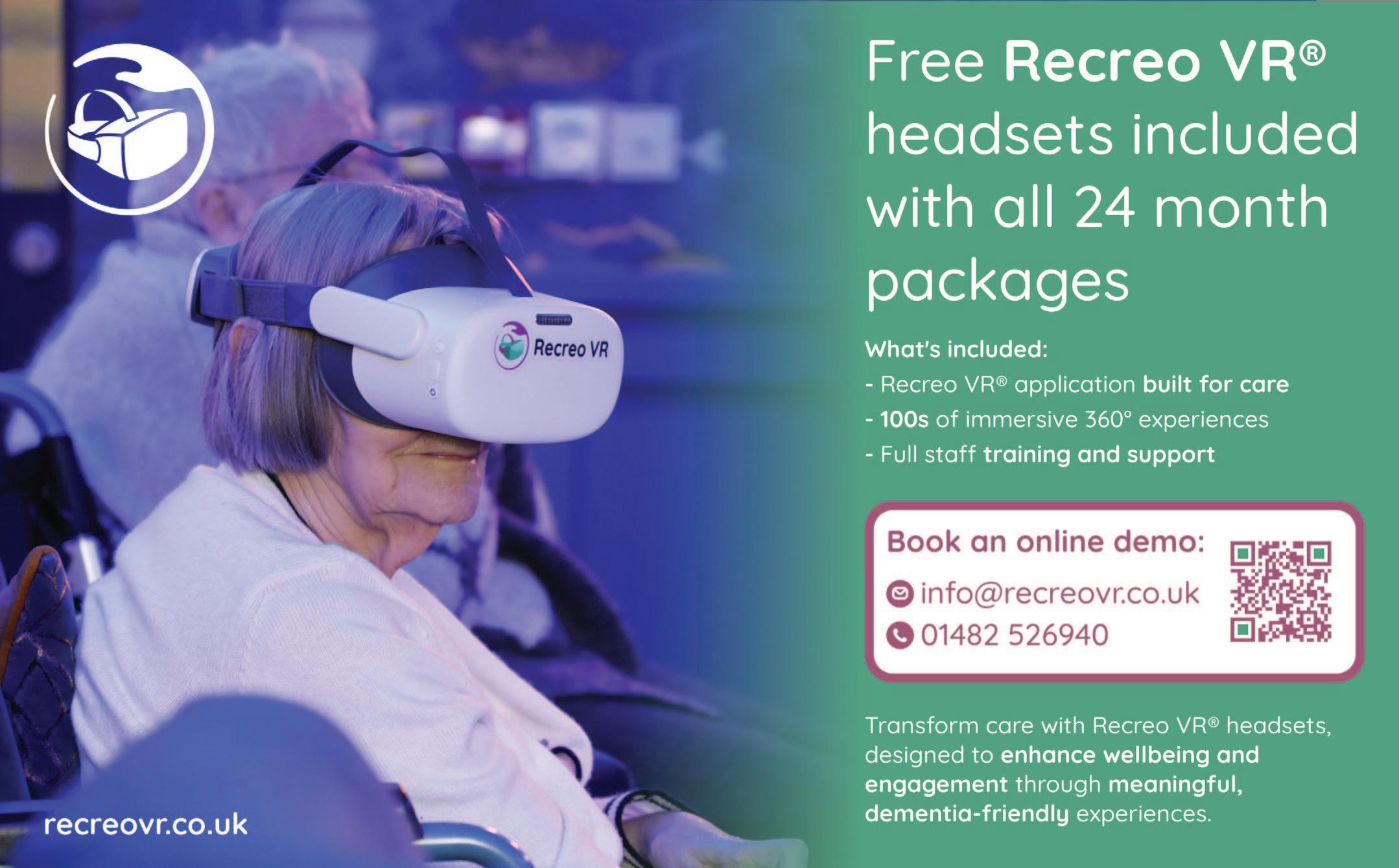
Research led by Lancaster University has revealed that the exceptional circumstances early in the COVID-19 pandemic led to distressing experiences of death and dying in care homes.
Not only did care homes suffer significantly high death rates amongst residents , but this was compounded by the impact of social distancing restrictions on family visiting and external support from palliative care teams for some care home residents dying in the early months of the pandemic.
The study was led by Lancaster Professor Nancy Preston of the International Observatory on End-of-Life Care with colleagues from Newcastle University and the University of Sheffield.
The research explored the impact on care homes of the early waves of the pandemic between Autumn 2020 and Summer 2021. Interviews were conducted with 16 UK care home staff , three residents , five family members and health service staff working with ten care homes , exploring their experiences of death and dying.

Experiences of death and dying in care homes were particularly distressing for staff and families at this time for a number of reasons.
The findings suggest that care home staff found the prospect of preparing for, and managing a large number of deaths particularly difficult, with one care home manager telling researchers that “Just before lockdown we had a nurse came to the home and said to us, ‘Right you need to be prepared to hold bodies in the care home. Do you have any cold bedrooms where you can hold bodies?’ … and I think that kind of hit us.”
Care home staff also found it very distressing enforcing strict social distancing restrictions on family visits
when a care home resident was dying, which often brought them into conflict with their personal and professional instincts for supporting residents and families at these times.
One care home worker said: “It’s just an awful position to be in because who are we to say they can’t say their goodbyes and for how long. That’s the bit that I find difficult.”
Social distancing regulations were clearly also very distressing for families. As well as time restrictions on visits, they also had to choose a single family member to visit, which was difficult for all involved, and could cause family conflict. The findings suggest that the impact of these factors continued to affect families some months after their bereavement, with one telling researchers: “To end his life without having anyone there with him that he knows. That is just a terrible way to go and I don’t think we’ll ever forgive that really.”
Staff also found resident deaths extremely distressing, particularly witnessing the rapid decline of residents whom they had often known and worked with for months or years. They reported not being able to offer the type of end-of-life care that they would wish to, and some felt they had limited external support in managing end-of-life care.
Professor Nancy Preston said: “We don’t yet know the long-term impact of this distress for care home staff and families, but planning for future crises should have clear policies for end-of-life care, including prioritising family visiting and ensuring consistent access to external support services including specialist palliative care.”
We are thrilled to announce that THE CARER will be producing a special digital supplement to commemorate Victory in Europe Day (V-E Day) on May 8. This historic occasion marks the unconditional surrender of Germany’s military forces to the Allies in 1945, bringing an end to the conflict in Europe during World War II. Over the years, we have been honoured and privileged to share incredible stories from care homes and their residents from across the UK—stories of heroism, resilience, and dedication from residents who served our country in times of conflict and need. From D-Day to Remembrance Sunday, awards and honours these personal recollections have been a
testament to the courage and sacrifices of a remarkable generation.
To mark this momentous anniversary, we are calling on care homes to send in as many resident stories as possible, accompanied by photos, to help us create a bumper V-E Day supplement. Whether it’s firsthand memories of May 8, 1945, stories of service, or reflections on what V-E Day meant to them, we would love to share and celebrate these treasured accounts.
Submit your resident stories and photos to veday@thecareruk.com
Let’s come together to honour and preserve the legacy of those who witnessed this historic day.



Burnout has reached crisis levels, with 41% of the health and social workforce reporting burnout in the past year. This staggering statistic is only expected to rise, intensifying recruitment and retention challenges across the sector. In response, it has never been more crucial to rethink how we support employees to retain and attract top talent.
At the heart of this solution lies compassionate leadership. Research indicates that compassionate leadership is centred on building strong relationships by listening, empathising, and offering support. Through compassionate leadership, employees feel valued, respected, and cared for, enabling them to reach their potential and deliver their best work. Evidence consistently shows that this approach not only fosters higher engagement and motivation among staff but also boosts their well-being—resulting in improved quality of care.
However, leadership is just one piece of the puzzle. To truly build a sustainable, compassion-driven organisation, we must address broader organisational practices and cultures. Three essential pillars for success include visibility, education, and connection.
VISIBILITY: SHINING A LIGHT ON WORKFORCE CHALLENGES
Raising visibility and awareness around key workforce issues is critical for fostering a compassionate environment. This includes normalising healthy conversations about mental health and shifting the narrative away from the constant expectation of "resilience." Instead, organisations should create safe spaces where employees feel comfortable expressing vulnerabilities, including how their day-to-day work affects their well-being.
Visibility also plays a vital role in prevention and early intervention. By identifying the signs of burnout and compassion fatigue early, organisations can implement measures that mitigate these challenges before they compromise employee well-being and patient care.
EDUCATION: EQUIPPING MANAGERS AND STAFF
By Lucy Carpenter, Compassionate Employers
The complex challenges faced by the health and social care workforce require managers who are confident and skilled in leading with compassion. Investing in training programs that equip managers with these essential skills is vital for creating flourishing teams. Compassionate leaders serve as role models and foster environments of trust, collaboration, and respect.
Education shouldn’t stop with leadership. Educating all employees about burnout, compassion fatigue, and their early warning signs is equally important. A culture focused on prevention and awareness empowers employees to recognise and address challenges early, reducing the long-term impact on their wellbeing and the quality of care provided.
CONNECTION: BUILDING BRIDGES OF SUPPORT
Connection is a powerful force for enhancing employee well-being. The NHS in England offers a noteworthy example of this, with over 700 staff networks providing protected spaces for employees to share their experiences. These networks cultivate belonging and trust, fostering a culture where individuals feel seen, heard, and supported.
Encouraging peer networks and support groups can also help employees navigate the emotional challenges of their roles. Providing spaces where individuals can openly discuss professional grief - such as the grief stemming from experiences in acute hospital settings or palliative care - reduces isolation and helps employees build resilience together.
KEY TERMS TO UNDERSTAND
To fully grasp the scope of compassion-driven workplaces, it's essential to recognise key concepts such as:
Professional Grief: The type of grief employees experiences due to the nature of their work. Commonly encountered in acute hospital settings, intensive care units, or palliative care, it can manifest as secondary or vicarious trauma.
• Burnout: A state of physical and emotional exhaustion caused by prolonged stress in demanding roles.
Compassion Fatigue: A specific form of burnout marked by emotional and physical exhaustion, reducing the ability to empathise or feel compassion for others.
THE PATH FORWARD
Five years on from the COVID-19 pandemic, the urgency of addressing workforce well-being in health and social care has never been greater. By embedding visibility, education, and connection into organisational strategies, leaders can create workplaces that truly value their employees. Compassionate organisations not only retain and attract top talent but also ensure that their workforce is equipped to deliver exceptional care—today, and in the years to come.
As families across the UK face the difficult decision of finding care for their elderly loved ones, an emotional toll is being borne disproportionately by women. Dubbed “the guilt gap,” this phenomenon is driven by deeply ingrained social expectations, leaving women feeling the strain of balancing careers, parenting, and the mental load of care arrangements.
According to recent research, 70% of emergency contacts and primary enrollers for care home residents are women. This striking statistic underscores the emotional and logistical burden that often falls on daughters, wives, and female relatives.
Adding to this, the concept of the “mental load” describes the invisible labour of planning and decision-making that disproportionately affects women in households. When applied to elderly care decisions, this invisible labour manifests in researching care homes, coordinating
with medical professionals, and managing family dynamics.
For many women, this weight is compounded by feelings of guilt, as they question whether they are “doing enough” for their loved ones while juggling other responsibilities.
Kevin Snowball, CEO of Lilian Faithfull Care, said: “We see this emotional burden on families, particularly women, every day. The guilt many feel is heartbreaking, but it’s important to know that you’re not alone. At Lilian Faithfull Care, we believe in supporting the entire family through these challenging decisions. As a non-profit, our priority is the well-being of residents and their families”.
As the sandwich generation continues to juggle raising children, careers, and caring for ageing parents, it’s crucial to shine a light on the emotional toll of care decisions and encourage families to work together.
Sharing the responsibility – practical advice for care decisions
Lilian Faithfull Care offers the following tips for families facing care decisions:
• Involve the whole family: Start discussions early and include all relatives. Assign specific roles to ensure the responsibility is shared, making the process smoother for everyone.
• Seek professional advice: Consult with care providers who can guide you through the process and offer practical, emotional support.
• Give yourself grace: Decisions about care are never easy.
Acknowledge your emotions, and remember you’re doing your best.
• Don’t delay: Leaving decisions to the last minute can increase stress. Research and visit care providers in advance to make a well-informed choice.
Avery Healthcare is celebrating as three of its care homes have been included in the prestigious 2025 edition of Knight Frank’s Luxury Care Home Guide, which highlights the UK’s top 100 luxury care homes. This exclusive guide showcases the very best care homes in the country, recognised for offering exceptional service, world-class facilities, and personalised care in luxurious, comfortable environments. Mousehold View Care Home in Norwich, Beckenham Park Care Home in Beckenham, and Barnet Grange Care Home in Barnet, all operated by Avery Healthcare, have earned their place in this prestigious guide, reflecting their unwavering commitment to the highest standards of care, design, and service.
The selection for the 2025 guide was highly competitive, with Knight Frank receiving a record number of submissions,

welcoming, homely environment, modern facilities, and beautifully landscaped gardens that enhance the residents’ overall quality of life, as well as a wide range of activities designed to support the physical, emotional, and mental well-being of their residents.
A spokesperson for Avery Healthcare said, “We are pleased to see Mousehold View, Beckenham Park, and Barnet Grange featured in The Luxury Care Home Guide 2025.”
“This recognition is a reflection of the hard work and dedication of our staff, who consistently provide a high standard of care in a welcoming and supportive environment.”
“We are grateful for their continued commitment and would also like to thank our residents and their families for their trust in us.”
March

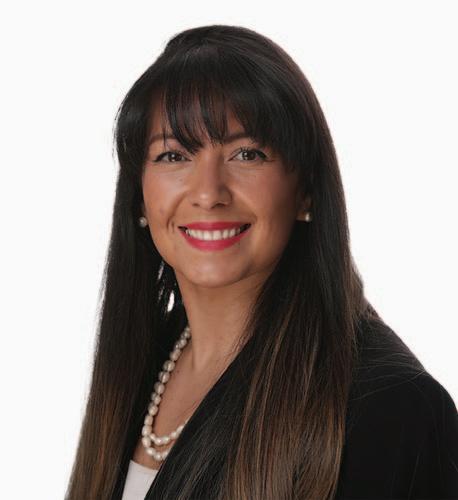
Ingrid McGhee, partner and employment lawyer at national law firm Weightmans (www.weightmans.com), shares her expert insight into the Domestic Abuse (Safe Leave) Bill, explaining what it means for care providers, why existing policies may fall short, and the essential steps organisations should take now to protect and support their workforce.
A proposed new law, the Domestic Abuse (Safe Leave) Bill, aims to provide victims with up to 10 days of paid “safe leave” to manage issues related to domestic abuse.
Recently, this Private Member’s Bill advanced to the next stage in Parliament, despite the government’s previous decisions not to introduce such a right.
Although its second reading is scheduled for June, the sponsoring MP, Alex McIntyre, has emphasised that the bill’s aim is to spark a nationwide conversation about making workplaces safer for victims of domestic violence.
Regardless of whether the bill becomes law, the growing focus on domestic violence has brought these issues to the forefront of workplace discussions, with many employers already introducing domestic abuse policies.
WHY THE CARE SECTOR SHOULD TAKE ACTION
Domestic abuse affects people from all walks of life, and the care sector – in which some 80% of workers are women - could be especially vulnerable. The sector also faces high turnover and retention challenges, making it even more crucial for employers to create a safe and supportive workplace.
Currently, many care employers do not offer employees a specific right to paid time off for domestic abuse. Victims are often forced to choose between taking time to seek help addressing their situation and retaining their income. In some cases, they may feel compelled to conceal the true reasons for their absence or declining performance, risking disciplinary action or performance management. Such processes not only intensify the pressure on an already vulnerable employee but also place additional strain on stretched management and HR resources.
Therefore, implementing a domestic abuse policy can offer vital support and reassurance.
A domestic abuse policy provides a formal framework that ensures employees can access the support they need without fear of stigma. This structured approach helps organisations handle sensitive disclosures and provide tangible assistance.
Such policies typically cover a range of practical considerations. For instance, training managers to recognise signs of domestic abuse - such as unexplained absences or behavioural changes - can help them respond appropriately.
Managers must be equipped to handle disclosures with empathy and discretion while ensuring that employees feel safe. Understanding the legal rights available to employees, such as flexible working and non-discrimination protections, is also crucial.
A supportive workplace culture begins with clear, confidential channels for employees to seek help. Care sector employers should offer guidance on how employees can access paid or unpaid leave, flexible working arrangements, or adjustments to work locations. In addition to internal support, employers should provide or signpost employees to external resources, such as Employee Assistance Programmes (EAPs) offering counselling, as well as local domestic abuse charities and legal services. Partnerships with specialist organisations can also help deliver training and additional support.
The benefits of a structured domestic abuse policy extend beyond immediate support. It fosters a culture of trust and compassion within the workplace. Employees who feel supported are more likely to stay in their roles, which helps improve staff retention and team stability — both crucial for a sector grappling with high turnover.
Care sector employers can take proactive steps to ensure they are equipped to support employees experiencing domestic abuse. Establishing a clear and comprehensive policy is a crucial first step, outlining how abuse – such as coercive control, stalking, harassment and malicious communications – will be addressed in the workplace. It should also set out the support available, including leave entitlements and flexible working arrangements.
Training for managers and HR teams is essential. Managers should be able to recognise the signs of domestic abuse and understand how to respond to disclosures appropriately, maintaining confidentiality and ensuring the dignity of the employee. HR teams need to be well-versed in the legal protections available, such as flexible working rights and protections against discrimination.
Furthermore, employers should provide or signpost employees to external support services, including counselling through EAPs, local helplines and legal support services. Access to these resources can help victims navigate difficult circumstances.
The Domestic Abuse (Safe Leave) Bill is an important step in raising awareness of domestic abuse in the workplace. While the government has historically resisted introducing paid leave, the bill’s progression perhaps signals a shift in how these issues are viewed.
Even if the bill does not become law, the conversation around domestic abuse in the workplace will continue to influence employer practices. Care sector employers who take proactive steps to support employees will not only protect staff but also foster a more compassionate, supportive workplace culture. By implementing robust policies, employers can improve retention and reduce turnover, helping to create more stable teams within the sector.
A resident at a Sandbanks care home guided a Premier League footballer to victory in a series of football-themed games.
James Hill, a centre-back for AFC Bournemouth, visited Marjorie House on Crichel Mount Road near Sandbanks to view the facilities and play some seated football and beanbag throwing sessions with the residents. He particularly struck up a friendship with Pam, a resident of Marjorie House and a keen football fan. Together they teamed up against the other care home residents and staff alongside AFC Bournemouth legend Steve ‘Fletch’ Fletcher. The afternoon was led by Steve Cuss and David Pudney from AFC Bournemouth Community Sports Trust, who host sessions across Care South’s Dorset-based care homes.
James said: “Pam and I had a good partnership going during the games. She was my team captain and she led me through to many victories, which I was very happy about.

“Marjorie House is the best care home I’ve ever seen in terms of how the staff accommodate the residents’ individual needs. It is amazing. It feels like a community with lots of nice communal areas to sit in and the views from the balcony are incredible. It feels like such a friendly environment and so homely. It doesn’t feel like it’s a care home.”
Reflecting on steering her team to success, Pam said: “James was wonderful. The games were such fun
and it was good exercise. The AFC Bournemouth team made it special for us. I have always enjoyed watching football on a Saturday night. I like living at Marjorie House very much.”
Marjorie House is owned and operated by not-for-profit care home and care at home provider, Care South. The visit was arranged as part of Care South’s ongoing partnership with AFC Bournemouth. This enables care home residents, care home clients, and staff to get involved in a range of activities including weekly seated football sessions, meeting players, coffee mornings, and tours of the stadium.
Sebastian Wincelewski, Home Manager at Marjorie House, said: “We were thrilled to welcome James Hill to look around our care home and meet our residents. It was wonderful to see Pam and our other residents engaged in the activities with James’s help and guidance. The seated football will now become a regular activity in Marjorie House, as part of Care South’s partnership with AFC Bournemouth, which brings joy, laughter and fun to the home while enabling the residents to stay active.”
The Marjorie House team are celebrating after the home was listed as one of the Top 20 Care Homes in the South West by industry website carehome.co.uk based on reviews from residents, relatives and their loved ones.
The highly anticipated Care Show London 2025 is set to return to Excel London on 30 April – 1 May 2025! This premier event is more than just an exhibition; it’s a vibrant community gathering dedicated to celebrating, inspiring, and advancing the care sector.
Free to attend for those who work for a social care provider (including but not exclusive to care homes, nursing homes and domiciliary care), in addition to healthcare, allied healthcare, NHS, public sector professionals, chefs, catering professionals, architects and interior designers, Care Show London 2025 will bring together over 3,500 care professionals from across the UK. The event promises to be a celebration of shared dedication, filled with opportunities to network, learn, and enjoy the company of like-minded individuals who share your passion for delivering exceptional care. Over the course of two days, attendees will have the chance to immerse themselves in a CPD-accredited conference programme, hosted across 6

dedicated theatres. This comprehensive line-up will offer a 360-degree view of today’s social care landscape through a variety of formats. The programme covers key themes including quality, compliance and collaboration, workforce development and wellbeing, funding, business management and sustainability, catering and nutrition, and technology and innovation Explore the expansive show floor, showcasing over 200 key suppliers ranging from leading names to pioneering start-ups making waves in the sector. Attendees will have access to a wide array of innovative products and services, including digital solutions, care equipment, waste management services, recruitment platforms, training programs, financial services, textiles, and more. It’s the perfect opportunity to discover fresh ideas and tools that will enhance your care services and streamline operations. FREE tickets are available here -
or see
advert on page 12.
Searches carried out by care seekers on care directory company Autumna, show that catering, the range of activities, environmental commitments and even pet policies are scrutinised more often than the ratings awarded by the Care Quality Commission (CQC).

“Our analysis of searches on our platform in 2024 confirms that CQC ratings aren’t relevant to those looking for care – they are too out of date and do not provide information on the criteria that matter to families.”
Last year, the most popular care home information sought out was fees, with nearly one in five users (18.2%) checking the fees of care homes that met their search criteria. The next most significant information looked for were rooms, checked out by one in ten care seekers (10.2%), followed by admission criteria (9.2%).
However, only 3.3% looked for more detailed information explaining the rating a care home had been awarded by the CQC.
By contrast, two and half times as many care seekers researched the dining choices (8.8%), while twice as many checked out the environmental commitments of care homes they were considering (7.2%). The choice of activities was also more important to self-funding families, with 5.75% investigating this.
With 3.6% of visitors checking out care homes’ pet policies, even the ability to take a furry or feathered friend proved to be more relevant for care seekers than the official ratings of the quality of care that they or their loved one could expect to receive.

“Fees are always the biggest concern for selffunding families looking for care, and they also want to know that they, or mum or dad, will feel at home,” comments Autumna’s Managing Director, Debbie Harris, “so it’s no surprise that fees and rooms were the most interrogated information on the Autumna website in 2024.”
“But the fact that only one in 30 people clicked to find out more details about the regulator ratings of the care homes they were looking at highlights just how irrelevant these are for people looking for care.”
“With inspections often woefully out of date – up to seven years in some cases – the CQC is failing to provide care seekers with information they can rely upon about the quality of care offered by providers. The regulator also doesn’t assess the things that matter most to families: detailed information on the type of care available, the quality of food, the range of activities, environmental policies – and whether pets are allowed. “
“While we welcome the admission by the CQC’s new chief executive, Sir Julian Hartley, that the regulator is not delivering, Autumna’s insights shows that it will never be able to provide all the information that care seekers need to help them choose care –and, crucially, that providers need to be able to evidence the quality of their care, facilities and service.”
“Our analysis shows that even if the CQC is able to turn itself around, the private sector will continue to have a vital role to play in ensuring care seekers can easily find information about the things that they or their loved ones need to feel truly at home in a care home.”

• We specialise in the sale and purchase of quality used wheelchair accessible vehicles and ambulances.
• They can be bought as seen or refurbished and sign-written to your own requirements.
• Fully serviced, new mot & warranty
• Engineers inspection supplied if required.
• Free delivery service available
• All buses comply with new legislation
• Lease hire and purchase available
• Always large stock of accessible vehicles



REM have been manufacturing furniture for the Hair & Beauty Sector for over 100 years and are now considered to be one of the largest manufacturers in both the UK & Europe. Understanding the growing requirement for Care & Residential Home Salons, REM’s Design Team have produced the Pendle Care Range for the Small, Compact Care Home Salon.
By Raje Ballagan-Evans, Policy and Impact Manager at Social Interest Group

As Social Care Providers are already delivering solutions for fractional costs, Raje Ballagan-Evans asks, why are we being snubbed by the NHS?
In 2023/24, there were 450,000 delayed transfers of care (DToC), meaning huge numbers of people fit for medical discharge but blocking beds in hospitals as they await social care assessments and adjustments to be put in place.
As NHS Chief Executive Amanda Pritchard told the Health and Social Care committee earlier this year, these delays prevent new patients being admitted for medical help to the extent that A&E 4 hour performance is decreased by an estimated 6%.
Many of the people waiting are older people or those with multiple needs. Any new or increased care needs carry commitment and finance demands that family may be unwilling or unable to meet. Residential services may be unable to step in because of unviable fees being offered to them to deliver care. Whilst disputes are settled, a family member remains in a free bed with care provided by hospital staff.
Preferences of patients and their advocates must rightly be taken into consideration and it is hard to emphasis enough how important this is when it comes to care and support needs. This is enshrined into law for regulated activities (Health and Social Care Act 2014).
So what is the solution to managing the tension between the dignified and caring support we need to ensure for those leaving hospital to have appropriate provisions in place to be safe and independent, and freeing up beds for medical treatment, and preventing loss of life for those in an emergency?
Firstly, we need to understand the gravity of the impact of blocked beds; an NHS bed costs between £345 to £2,349 according to 2020/21 figures. In 2023, The King’s Fund estimated this to equate to at least, £1.7 billion.
These are shocking statistics but the human cost is even higher. People who need treatment, even in an emergency, are unable to be admitted to A&E, whilst planned operations and surgeries are cancelled as there is no capacity on wards to receive patients once they come out of theatre.
Staff are left managing people in ambulances outside of hospitals, whilst wards take care of patients that should not be in hospital. And what about the patients stuck in the bed? They are left at increased risk of infection, and deterioration of health, mobility in particular.
In light of these stark facts, it is a cause of anger and dismay that despite ongoing inefficiencies as more and more money is pumped into the NHS, leaders continue to commission themselves to provide services. Rather, they ought to be looking to social care organisations that can provide vital services and support, that are community based, efficient and great value for money. Sound too good to be true? SIG Penrose’s STEPS project is already delivering. The service facilitates direct support to people in Luton hospitals who have move on needs.
This is vital because in the midst of the current housing crisis, patients with complex needs are most likely to face homelessness and loss of tenancy. A myriad of housing and income challenges keeps them stuck in a hospital bed.
STEPS work on behalf of patients with social workers, housing officers and welfare agencies. Leaning into our community network of housing partners, we enable efficient and appropriate move on into safe accommodation. This service is evidenced to reduce the average length of hospital stay from 35 days to 19.
A return on investment analysis, conducted in partnership with a ward at Luton and Dunstable General Hospital, estimated that STEPS delivers the local NHS Trust an average saving of £12,208 per patient. This equates to over £2.1 million per year based on the 176 people supported by the programme last year. Or in ROI terms, £55 in savings for every £1 invested.
Person centred, efficient, value for money services are what we need nationally at a time when the NHS is in crisis. Obvious and well evidenced solutions from social care providers are abundant but statutory organisations must stop seeing us a less sophisticated sweep-up operation and fund us as equal partners in delivering fair care.
Veterans living at a charity’s care homes and using its services have been sharing their views as part of a new project highlighting the value of veterans and older people.
Veterans’ Voice aims to give a platform to residents in Royal Star & Garter’s Homes, and the people who use its services, ensuring they are not hidden because of their disability or dementia. It also aims to recognise and celebrate the process of ageing by sharing their knowledge and supporting their beliefs and wishes for the country’s future.

Royal Star & Garter provides loving, compassionate care to veterans and their partners living with disability or dementia, from Homes in Solihull, Surbiton and High Wycombe and through services reaching into the community.
The charity has helped veterans find their voice, tackle loneliness, and support them to foster friendships and companionship through its Day Care and Lunch Clubs. Their free nationwide Telephone Friendship Service also addresses issues of isolation, with trained volunteers calling veterans and their partners who live in their own homes anywhere in the country.
As part of Veterans’ Voice, Royal Star & Garter residents have expressed their concerns and hopes for the future. RAF veteran Michael wants more understanding and equality: “I’d like to see a world where everyone is treated fairly. It’s wrong to pre-judge anyone.” And he added: “We must respect other people’s views. I think that is a problem, especially right now. I think politics today is too divisive.” Yvonne, whose husband served in the RAF, added: “I think there’s lots that needs to be changed because the world is in a mess.”
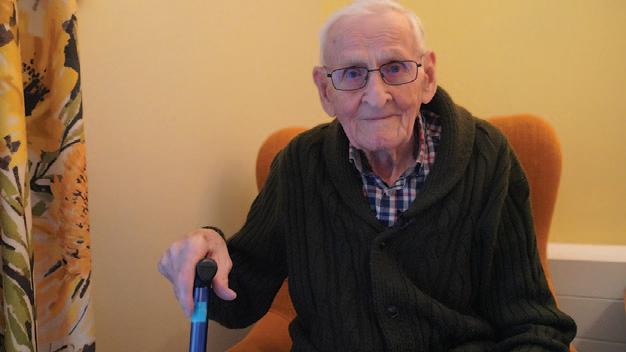

RAF veteran and resident John wants to see a future without armed conflict. He said: “People just seem to go into things without realising what they’re doing, and the consequences of what they’re doing. If I had the power to, I’d end all wars.”
Residents also feel more should be done to help and support Armed Forces personnel when they leave
the military. Michael called for better welfare, and for them to be treated with more respect. “I think that’s the least we can do, when you consider the sacrifices they have made for us,” he said.
Royal Star & Garter has also supported veterans to be heard and appreciated through its other services. Navy veteran John uses their Telephone Friendship Service fortnightly. He said the conversations allow him to speak to his volunteer about personal issues, which he doesn’t want to worry his family with. He said: “It’s nice to talk to someone who isn’t family, someone from the outside, to explain things to, and who relieves my concerns. I feel the burden and pressure that I carry relieved.” He added: “We all get lonely. There might be a time when I haven’t spoken to my children for a while, but I know that someone will call me and ask how I’m doing, which makes it a lot better.”
Royal Star & Garter is one of the charities supporting the Veteran Friendly Framework (VFF), which aims to improve the care and support given to veterans in all care homes in England. The Willows care home has been supported in achieving the Veteran Friendly Framework and sees huge benefits from this. Home Manager Julie Gregory said: “The recognition and celebrations shouldn’t stop just because veterans live in a care home. We can act as their voice and share with the community what they have achieved, ensuring they are not forgotten.”
Caley Eldred, the Director of Supporter Engagement at Royal Star & Garter, said: “We want to communicate the value of our older people, their views and their experiences. People living in adult social care are often overlooked and sidelined. Their views are relevant – they care about people having a safe place to live, they are passionate about the world being a peaceful one and they uphold the values of respect and equality. They are also positive about life in a care home and want to help us show that it can still be fun! We share the common desire to increase respect for each other in the local communities where we operate, and we hope Veterans’ Voice will contribute to this.”
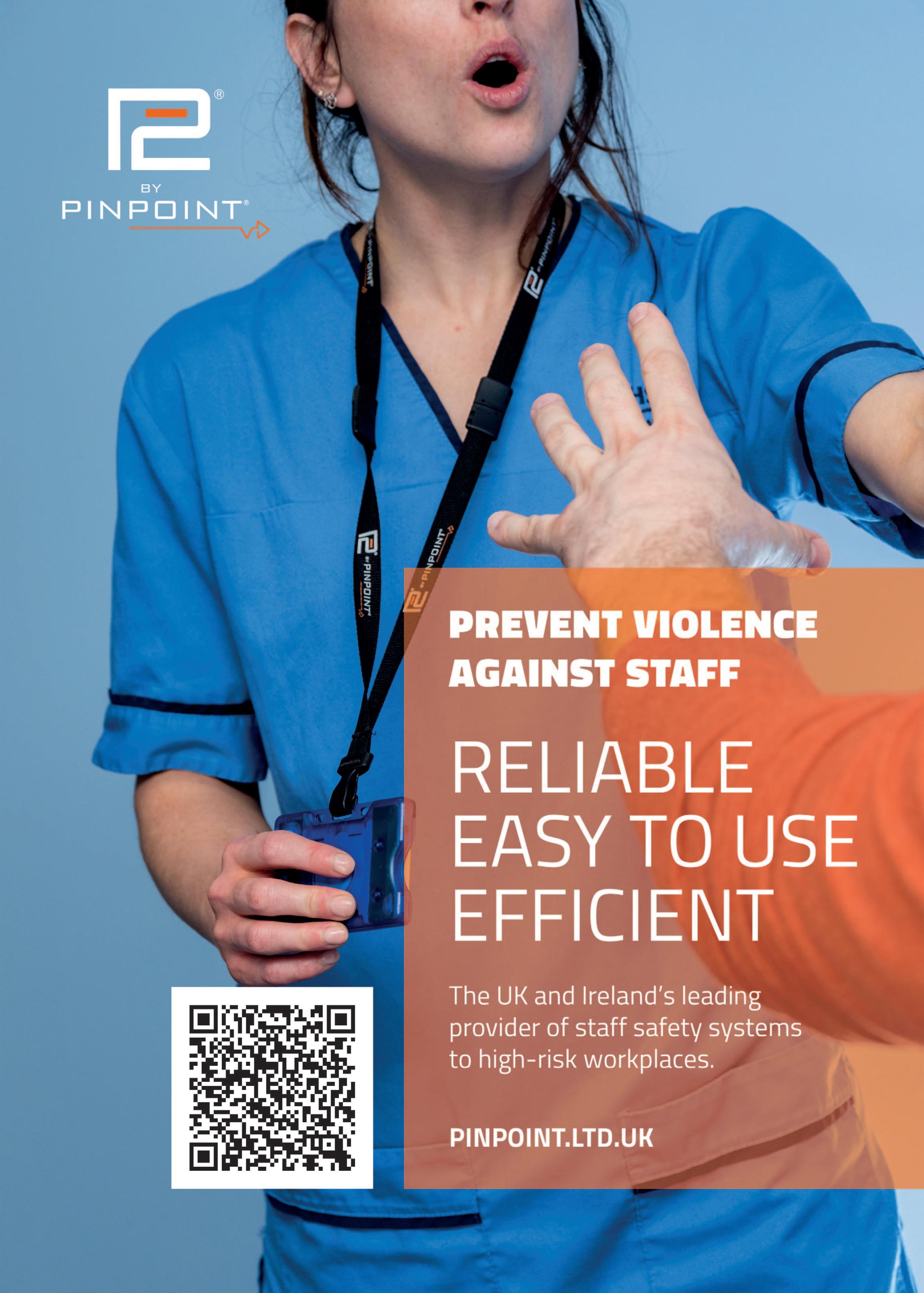
A leading care management software provider has released the findings of its 2025 Digital Social Care Record (DSCR) survey – highlighting major gaps in access to essential digital tools.
The report, published by PASS by everyLIFE, reveals that many care providers still lack access to key features such as GP Connect, electronic medication administration records (eMAR) and a friends and family portal, despite their potential to improve care quality, efficiency, and compliance.
This comes as DSCR adoption continues to rise, with government data showing that 72% of CQC-registered adult social care locations in England had a DSCR in place by July 2024 – up from 57.4% in July 2023.
While progress is being made, the survey findings highlight that simply having a DSCR is not enough, with providers needing access to the right digital tools to truly transform care delivery, especially amid ongoing challenges in recruitment, retention and funding across the sector.
The survey, completed by 447 care providers using various DSCR systems across the sector, found that confidence in digital systems is growing, with 48% of providers feeling secure in their care management technology. Many have embraced key digital tools, including digital care documentation, incident reporting and real-time care plans –demonstrating the sector’s commitment to safer, more compliant, and efficient care delivery.
However, the survey also exposes major gaps in access to essential digital tools:
• Only 38% of providers can access GP records digitally, despite GP Connect being live in England for seven years. This is a missed opportunity to improve safety with real-time access to prescriptions, allergies, and medical history.
• Just 39% use eMAR, meaning the majority still rely on non-digital medication administration, increasing the risk of errors and compliance issues.
• Nearly 40% of providers do not offer friends and family portals, despite

growing demand for transparency in care.
More broadly, core functionalities like digital rostering, GP patient data integration, eMAR, and care journey tracking remain underused, with fewer than half of providers leveraging these tools.
Overall, the findings reveal clear opportunities to improve efficiency, accuracy and safety through greater adoption of digital solutions.
Commenting on the findings, Duncan Campbell, Commercial Director at PASS and Marie Curie Advisory Board Member, said: “Better, more person-centred care should always be the goal – and technology is an affordable solution to help us get there. Our latest 2025 DSCR Survey shows great progress in digital adoption, but too many care providers still lack access to essential tools like GP Connect, eMAR, and family portals.
“I’m proud that at PASS, these features come as standard, with no extra cost to our customers. Real digital transformation is about making sure care teams have everything they need to work smarter, not harder.”
Other key findings included:
DIGITAL ROSTERING: A MISSED CHANCE TO IMPROVE EFFICIENCY
Only 30% of care providers use digital rostering, while 49% still rely on manual scheduling. This increases admin time and makes it harder to allocate staff effectively. Wider adoption could streamline workforce management and improve care continuity.
BODY MAPS: A VITAL TOOL FOR HEALTH MONITORING
42% of providers use digital body maps, while 41% do not. This means missed opportunities to track conditions like pressure ulcers. Digital body mapping enhances accuracy and early detection.
DIGITAL CHECKLISTS: A SMARTER WAY TO MANAGE COMPLIANCE
Only 37% of providers use digital checklists for onboarding and compliance, while 45% still rely on manual processes. This raises the risks of missed steps and delays. Digital tools ensure consistency and automate reminders.
24/7 SUPPORT: A SAFETY NET MANY CARE PROVIDERS LACK
42% of providers have 24/7 DSCR support, but 36% do not, leaving them vulnerable to system issues. Round-the-clock assistance reduces disruptions and ensures reliability.
CONFIDENCE IN CARE SYSTEMS: A MIXED PICTURE
48% of providers are confident in their care system, but 28% are not, and 24% are unsure. Gaps in usability and training may be affecting trust in digital tools.
Duncan continued: “The survey highlights digital adoptions within social care, while also identifying significant gaps. These areas need to be addressed to develop further efficiency, compliance, and quality of care. It is important to broaden digital solutions to deliver smarter, more integrated solutions that address changing sector needs.”
To learn more about the findings from the DSCR survey, check out www.everylifetechnologies.com/content-hub/2025-dscr-survey/ and to find out how PASS can support your care operations, visit www.everylifetechnologies.com
Around Global Recycling Day earlier this month more than 40 Care UK homes launched the pilot scheme for Generations of Change. This brings together primary school children and care home residents, encouraging them to share knowledge, learn from one another, and work together towards a more sustainable future.
By creating downloadable packs with resources for teachers, Care UK has created fun and interactive activities to help facilitate intergenerational lessons. Together, children and older people will explore topics like biodiversity and climate change and discover how everyone can contribute to making a positive difference in their community.
Topics for the educational packs range from biodiversity to food sustainability, climate change to recycling and are available for free on Care UK’s website.
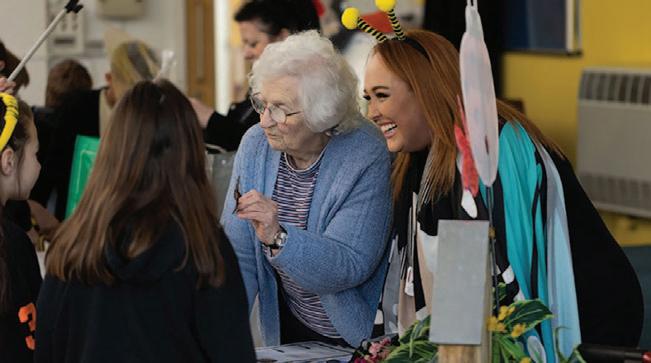
In honour of Global Recycling Day, homes from Edinburgh to Cambridgeshire’s St. Ives took part in a variety of activities to celebrate the beginning of Generations of Change. These included food markets with local schools, sowing seeds in care home gardens or allotments, upcycling old clothes and litter picking.
Generations of Change was originally the brainchild of Vicki Lambourne, the Senior Customer Relations Manager at Winchcombe Place in Newbury, who credits her home’s close relationship with the nearby Winchcombe School for the idea. The idea has now been adopted as a Care UK-wide initiative, complementing its ESG values and community commitment, as seen in their recent Harvest Festival campaign.
Tony Weedon, Care UK’s Strategic Programme Director, said: “At Care UK, we are continuing to create new ways to promote sustainability and encourage community-building. As a large provider, we take our responsibility as stewards of the environment seriously – whether this is in the village, town or borough that our individual homes are based in. “I am very excited to see how Generations of Change can bring together these two goals and support young children and older people in our communities to share knowledge and develop new skills. We know from experience that residents find spending time with children particularly valuable, and we believe the introduction of these free resources will encourage more schools to reach out to their local Care UK home and get involved.”
“I Never Thought I’d See This Again” – Droitwich
A lifetime of memories, a dream she thought was lost, and a journey that brought it all back.
Droitwich Mews Care Home has made a resident’s deeply personal wish come true as part of its new Wishing Tree initiative.
Each month, the Avery Healthcare-owned care home in Droitwich grants a wish for one of its residents, helping them reconnect with cherished moments from their past or experience something they never thought possible.
The Wishing Tree is more than just an idea, it is a promise. Residents write their wishes on paper ‘leaves’, which are then hung on the tree, each one filled with hopes, dreams, and treasured memories.
Every month, a wish is chosen and brought to life by their care home’s dedicated team, creating magical moments that remind residents they are valued and celebrated.
For Christine Smith, 84, who has lived at Droitwich Mews Care Home since June 2024, that moment came last week.
She had always dreamed of returning to RAF Cosford, where she once worked, and visiting the village where she grew up in Shifnal and Albrighton. Time had passed, places had changed, and she never thought she would see them again, but as the minibus wove through winding country lanes, Christine’s face lit up with recognition.
She pointed out places she had not seen in decades, such as the airfield where she worked, the pub where she celebrated her wedding, and the church where she stood hand-in-hand with Bryan, her husband, in 1960.

Arriving at RAF Cosford, Christine and her friends gazed in wonder at the towering aircraft. The same planes she had once known up close still stood strong.
Nostalgia filled the air as residents tried on RAF uniforms, with one resident joking, “It suits you!”
But the most emotional moment was yet to come. After lunch, the driver took a detour and the minibus pulled up outside the church where Christine had exchanged her vows many years before.
She clutched her hands to her chest, her eyes filling with tears. “I never thought I’d see this again,” she whispered.
An unexpected turn in the journey led the group to a small cottage with a familiar gate. Christine immediately recognised it as her childhood home.
Overcome with emotion, she reminisced about her early years, running through fields, climbing old hangars with friends, and dancing to music on a transistor radio.
Christine returned to Droitwich Mews Care Home overcome with joy, still talking about her journey the next morning.
“I never thought I would ever see these places again, the Wishing Tree has definitely made my wishes come true. Thank you so much,” said Christine.
Deputy Manager at Droitwich Mews Care Home said, “An emotional day for everyone, it was just such an honour to be a part of making her wish come true. A real pleasure to spend this quality time with Christine”.

In what has been called the “largest welfare reforms for a generation” the government has this week announced proposed changes to the welfare system which include changes to PIP, Work Capability Assessments and Universal Credit as part of a drive on getting more people into work and making £5bn worth of savings.
The new measures are designed to ensure a welfare system that is “fit for purpose and available for future generations” – opening up, the government say, employment opportunities, boosting economic growth and tackling the spiralling benefits bill, while also ensuring those who cannot work get the support, they need as part of the government’s Plan for Change.
This will, according to Work and Pensions Secretary Liz Kendall, the end years of inaction, which has led to one in eight young people not currently in work, education or training and 2.8 million people economically inactive due to long term sickness – one of the highest rates in the G7.
The number of people receiving one of the main types of health and disability benefit, Personal Independence Payments (PIP), has also risen rapidly and is becoming unsustainable. The National Care Forum (NCF) – has responded to the publication of the government’s Green Paper on reforming the benefits system.
Liz Jones, Policy Director at the National Care Forum said: “While we welcome the government’s ambition to support more people into work or to stay in work, the sheer scale of the envisioned £5bn of accompanying cuts is extremely concerning for everyone relying on PIP – a payment designed to help with the costs caused by a disability – and will lead to unintended consequences in terms of access to social care services.”
“Many people use their PIP to help pay for adult social care support and social care charges from their local authorities. The Green Paper states that DHSC is planning to carry out research on the link between the adult social care system and PIP. This link must be fully understood before such far-reaching reforms are implemented. We must also recognise that there will always be people who need the support of a well-functioning social security system who cannot work for a variety of reasons.”
“We worry that the ambition to reduce costs will undermine the
drive to get more people into work as it doesn’t deal with the root problems. The government’s own analysis, as well as those by the Resolution Foundation and Joseph Rowntree Foundation, highlight growing levels of sickness together with poor mental and physical health – a cut to welfare doesn’t solve these underlying issues.”
“If the government’s ambition is to support more people with learning and physical disabilities into work, it must recognise the power of adult social care to maintain people’s health and wellbeing, as well as support people into work, to return to work and to remain in work. Government should consider how it can make sustained and significant investment in adult social care as a key part of the nation’s infrastructure to get Britain working and unlock growth.”
“As one of the largest employers across the country, adult social care will be key to the success of the measures in the Employment Rights Bill as well as the Green Paper in ensuring that working conditions enable people to thrive and stay healthy. Any investment should reflect this, as well as the additional cost pressures incurred by the unfunded increase in employer’s National Insurance Contributions from April.”
“Cuts in social security support will not, in themselves, drive people into work but do risk driving people into poverty without providing the necessary help to support them into work and to enable employers to employ them.”
Work and Pensions Secretary Liz Kendall said: “Our social security system must be there for all of us when we need it, now and into the future. That means helping people who can work to do so, protecting those most in need, and delivering respect and dignity for all.”
“Millions of people have been locked out of work, and we can do better for them. Disabled people and those with health conditions who can work deserve the same choices and chances as everyone else.”
“That’s why we’re introducing the most far-reaching reforms in a generation, with £1 billion a year being invested in tailored support that can be adapted to meet their changing circumstances –including their changing health – while also scrapping the failed Work Capability Assessment.”
“This will mean fairness for disabled people and those with long term health conditions, but also for the taxpayers who fund it as these measures bring down the benefits bill.”
“At the same time, we will ensure that our welfare system protects people. There will always be some people who cannot work because of their disability or health condition. Protecting people in need is a principle we will never compromise on.”

Staff and residents at Elm Bank care home in Kettering are celebrating because their wonderful Regional Directors, Claire Brewer and Isabela Andriuca, from Barchester’s Central Division, are stepping completely out of their comfort zones to compete in the Barchester Charitable Foundation Cook Off 2025.
Swapping their business suits for chefs’ whites, Claire and Isabela are going head to head with two Regional Directors from each of Barchester’s four other divisions to cook up a storm and raise a vital funds for Barchester’s Charitable Foundation. The Foundation helps connect vulnerable people and those living with a disability to community groups in their local area by providing grants to improve mobility and quality of life. Each year the Foundation distributes thousands of pounds to indi-
viduals, small community groups and charities across England, Scotland and Wales. In 2024 the Foundation achieved a donation milestone of £335,000 which enabled the charity to provide vital help to a staggering 239 small groups and charities, plus 104 individuals in one year alone.
Isabela and Claire are keeping their cards very close to their chests regarding what they will be cooking but they have been practising hard. Claire comments:
“Isabela and I are passionate about the Foundation so we both jumped at the chance to be able to raise funds and give back. We both love cooking, I am selftaught because I think it is so important for my kids to eat well.” Isabela adds:
“We’re both very competitive so really want to win, we will give it our very best shot! The pride of the division is at stake!”
General Manager of Elm Bank care home, Marvellous Bindura, said: “We are all so proud of Claire and Isabela for taking part in this challenge, they really are amazing – is there nothing they can’t do!
Their dishes look absolutely fantastic and they will raise so much money for the Foundation, we think they are absolute super stars!





Caring for someone with dementia means finding ways to connect, even when words fail. A favourite song from their youth, the feel of a textured fabric, or the gentle glow of soft lighting, these small sensory experiences can spark recognition, comfort, and joy. With dementia cases on the rise, care homes are embracing sensory therapies to help residents feel more engaged and at ease in their surroundings.
According to Alzheimer’s Society, an estimated 55 million people were living with dementia in 2024, with numbers projected to reach 139 million by 2050. As the condition becomes more common, care providers must continue exploring new ways to improve residents’ quality of life. One of the key ways to do this is through sensory care - providing mental stimulation in a way that is calming, engaging, and tailored to each individual.
Research shows that providing sensory care for older adults living with mild to moderate dementia can do wonders for their mental well-being. In late 2024, we introduced a specialised sensory room at Belvedere House for residents with dementia. The interactive space uses projections to offer a variety of activities, including games and arts. These features are designed to stimulate, engage, and enhance the cognitive skills of impacted residents, as well as being fun.
Technology in dementia care is showing great results, but care must be tailored to each individual, there's no one-size-fits-all solution. Interactive sensory experiences can make a real difference in dementia care, helping to bring comfort, spark memories and encourage engagement. Dementia can be incredibly isolating, so creating opportunities for social interaction is essential. At our care home, we’ve seen first-hand how games and activities bring residents together in ways that feel natural and enjoyable. In some cases, residents in later stages of dementia, who had become withdrawn, have shown noticeable improvements in mood and behaviour, attentiveness and interaction with their surroundings.
Alongside our new sensory room, we continue to offer music sessions and live performances, both of which have proven to be incredibly valuable for our residents. The therapeutic benefits of music for individuals living with dementia are well-documented. Our ability to listen is one of the most powerful senses we have, and so music can serve as a powerful prompt for reminiscence and stirring up memories. It also reduces stress and feelings of isolation while allowing residents to express their feelings and ideas in ways

By David Dominy, CEO at Royal Alfred Seafarers' Society
that don’t require verbal communication.
To further encourage engagement and social interaction the Society, with support from partners, is investing in interactive screens that offer a variety of activities and games to stimulate, engage, and enhance the cognitive skills of impacted residents. They also provide easily accessible ways to make calls to loved ones. Providing a variety of options supports the tailoring of our care to the needs and preferences of the individuals.
Recognising and accepting the brain changes that cause dementia can help carers to adopt suitable responses and methods of communication. Whether through music- in all its forms- art, or interactive games, these alternative forms of expression can help bridge communication gaps that oftentimes arise due to dementia.
LESSONS FROM
Providing great dementia care isn’t just about meeting daily needs, it’s about understanding the condition, adapting to challenges, and helping residents feel safe, supported, and valued. That’s why well-trained staff are at the heart of truly person-centred dementia care. Care homes must make sure their teams have the specialised knowledge and practical skills needed to support residents with dementia. When staff understand not just the physical needs but also the emotional and cognitive challenges of dementia, they can provide the right care, create meaningful moments and significantly improve residents’ quality of life.
In 2011, we opened the UK’s first specialist dementia unit for seafarers at our Belvedere House nursing home, after staff identified that 40 per cent of residents at the time had some form of dementia or cognitive impairment. The care unit has provided valuable insights into the benefits of early diagnosis and various types of therapy, physical and mental.
During this time our dedicated care workers have implemented various techniques to support our residents, including the use of memory boxes and personalised one-on-one therapy sessions. In recognition of the diverse needs of our residents, specialised training even extends to our catering team. This ensures that residents requiring texture-modified diets receive appropriate and nutritious meals tailored to their needs. Coloured food plates at mealtimes have also seen great success, encouraging independence and reducing confusion and stress.
CONTINUED COGNITIVE STIMULATION
By providing cognitive stimulation through various sensory experiences, care facilities can offer meaningful interactions and engagement opportunities for their residents.
As dementia care continues to evolve, integrating sensory-based therapies will become even more essential. At the Royal Alfred Seafarers' Society, we are committed to continuing to provide innovative, resident-centred care that ensuring that those we support receive dignity, joy, and connection every day.
Chacombe Park Care Home in Chacombe, Banbury was full of animal magic when the lovely miniature ponies; Lollipop and Tinkerbelle trotted in to surprise the residents.
Residents at Chacombe Park were super excited to see their new little pony friends roaming around their home as the team from Lollipop Ponies Parties paid a visit. Activities Coordinator; Morgan Dowie said: “Today has
been so very special for all our residents, the ponies put a spring in all our steps!”
General Manager Shaju Paul said: “Our residents have really enjoyed their unusual visitors today. Our residents love all animals, the enjoyment and therapeutic influence animals can have on people is immediate, meeting Lollipop and Tinkerbelle today put the biggest of smiles on all our faces.”

Adopt A Grandparent (AAG) is proud to announce new partnerships with both Care England and the National Activity Providers Association (NAPA) –two of the most influential organisations in the UK care sector. These collaborations mark a significant step forward in expanding intergenerational connections across care homes nationwide, ensuring more residents benefit from companionship, conversation, and meaningful social engagement. With so many older adults in the UK experiencing chronic loneliness, AAG’s work is more vital than ever. By partnering with these leading organisations, the charity aims to increase access to its volunteer programme, offering care homes a fully supported way to enrich the lives of their residents.
A MOVEMENT BACKED BY INDUSTRY LEADERS

The National Activity Providers Association (NAPA) is the UK’s leading activity and engagement charity, working to improve quality of life through meaningful activities in care settings. Through this partnership, NAPA will support care homes in integrating AAG into their activity programmes, helping residents build relationships that enhance their mental and emotional wellbeing.
Meanwhile, Care England – the representative body for care providers across England – advocates for innovative solutions that improve care services and resident experiences. By becoming a Supporter Member of Care England, AAG is now positioned as a key resource for care providers looking to tackle loneliness and prioritise social connection.
THE AAG DIFFERENCE: A SIMPLE, EFFECTIVE SOLUTION FOR CARE HOMES
AAG provides care homes with an easy-to-implement, fully safeguarded programme that manually matches residents with volunteers based on shared interests. These friendships are nurtured through a
secure AI-powered platform, ensuring calls are safe, engaging, and beneficial to residents’ wellbeing.
CARE HOMES THAT SIGN UP GAIN ACCESS TO:
A structured, fully managed initiative that seamlessly integrates into existing activities.
One-on-one video calls and ongoing engagement to create lasting social bonds.
A proven approach to reducing loneliness, improving cognitive health, and increasing resident happiness.
Endorsement from leading care sector organisations, demonstrating a commitment to innovation and resident wellbeing.
Shaleeza Hasham, Founder and CEO of Adopt A Grandparent, said:
“We are thrilled to be working with both Care England and NAPA – two organisations that share our commitment to improving quality of life for older adults. Loneliness should never be a normal part of ageing, and by joining forces with these sector leaders, we are making it easier than ever for care homes to introduce our programme and create meaningful connections for their residents. Together, we can ensure that no older person feels forgotten.”
AAG’s partnerships with NAPA and Care England mark a turning point in how care homes approach social engagement, bringing together industry expertise, volunteer support, and cutting-edge technology to tackle one of the most pressing public health challenges of our time.
HOW CARE HOMES CAN GET INVOLVED
MPs have overturned an exemption for adult social care providers from the forthcoming increase in employer national insurance contributions (NICs), in what sector leaders have described as a “devastating blow”.
During a two-hour debate, the Exchequer Secretary James Murray MP (Labour, Ealing North) repeatedly dismissed concerns about the bill’s impact.
The tabled amendments, proposed by the Liberal Democrats in the House of Lords sought to reduce National Insurance contributions to 13.8% for specified employers, including care providers, hospices, and charities with turnovers under £1 million.
Despite the clear need for relief, the House of Commons voted to dismiss the amendments by 307 to 182, delivering a crushing setback to the social care sector.

Nadra Ahmed CBE, Exec Co Chair of the National Care Association on behalf of Providers Unite, commented: “Today, we bear witness to a devastating blow that seals the fate of thousands of care providers across our nation. In a callous act of indifference, the government has dismantled the core principles and ethos of the Care Act 2014, abandoning millions who depend on vital support. This is indeed a dark day for community based care not only a ruthless assault on those we protect and employ, but on the very fabric of our democracy.”
“This is intolerable, and as a result, we will take further action to challenge this devastating defeat for the millions who depend on us for vital support. All previous attempts to remain diplomatic and constructive will be set aside. We will mobilise the more than 4,000 organisations already part of Providers Unite to confront the defeat of the NICs amendments, urging them to lobby their political representatives and apply significant pressure on local authorities. We call on thousands more care and support providers to join us in ensuring that the most marginalised members of our communities are protected from this lack of compassion by our elected representatives.”
Care England condemned the House of Commons’ vote, saying: “This vote was not a free choice for MPs, as Labour’s whips ensured they toed the party line, leaving little room for dissent. Unable to vote with their conscience, many instead voted either with their feet, or by abstaining, refusing to stand by as the govern-
WE CALL FOR:
ment pushed ahead with yet another devastating blow to social care. This deliberate suppression of debate has denied the sector the urgent support it so desperately needs.”
Professor Martin Green OBE, Chief Executive of Care England, said: “Today, we bear witness to a devastating blow that seals the fate of thousands of care providers across our nation. In a callous act of indifference, the government has dismantled the core principles and ethos of the Care Act, abandoning millions who depend on vital support. This is indeed a dark day for community-based care, not only a ruthless assault on those we protect and employ, but on the very fabric of our democracy.”
Care England is urging the government to reconsider its position and introduce a targeted relief package to protect social care providers from financial collapse.
• The Treasury to urgently revisit the financial support options Care England has presented, ensuring care providers receive the necessary funding to remain viable.
• Local authorities and Integrated Care Boards to commit to sustainable fee rates that reflect the true cost of care, factoring in these additional financial pressures, and to confirm these rates in a timely manner to provide certainty for providers.
• MPs to push for an urgent debate on a long-term funding solution for social care – one that addresses workforce shortages, inflationary pressures, and the growing demand for complex care – and to ensure the Spring Budget includes provisions that mitigate the impact of these changes.
Liz Jones, National Care Forum Policy Director, said: “Today the government has chosen to ignore the very clear warnings from care and support providers across the nation, as well as the very considered House of Lords amendments to the National Insurance Contributions (Secondary Class 1 Contributions) Bill.”
“In choosing to vote down the amendments that would have protected care and support providers from the devastating impact of the employer’s National Insurance Contribution changes, the government inflicts a devastating blow on already fragile, underfunded and undervalued essential public services which millions of people, and their families, depend on for vital support. This is a dark day for our sector, the people we employ and the people we support.”
A warm welcome to all our new readers! Some of you will be receiving a copy of THE CARER for the first time, and we are delighted to introduce ourselves.
Who are we? THE CARER is a bi-monthly, free-to-trade publication dedicated to the adult social care sector, available in both print and digital formats. Every Wednesday, we also produce a weekly digital issue, delivering the latest news, industry insights, and stories straight to your inbox.
If you’d like to stay up to date with the latest developments in residential and nursing care, you can sign

Actor Brian Cox, CBE, sat down with Jordan Adams, who is part of the ‘FTD Brothers’, for an emotional conversation that left a strong impression on Brian.
Jordan, 29, knows first-hand how devastating dementia can be, as his mum died from frontotemporal dementia at just 52. Jordan, and his brother Cian, both carry a rare inherited gene that means they will develop dementia symptoms in their 40s.
Both Brian and Jordan, Ambassadors of the charity, have come together for this moving film to support the Omaze Million Pound House Draw, Scotland. The partnership is raising funds to speed up the search for a cure.
Reflecting on his open conversation with Brian, Jordan said: “It was a once-in-a-lifetime experience sitting down with Brian and sharing my story with him, to support this fantastic campaign between Alzheimer’s Research UK and Omaze.
“Brian was very compassionate. As well as listening to my story, he also shared his own experience
with dementia within his family, which just goes to show that anyone can be impacted by this devastating condition.”
“Sharing my story to raise awareness and support dementia research has opened up some incredible opportunities for me, like this one with Omaze.
“The money raised from this partnership will do so much to help ensure other families won’t be devastated by dementia like my family has been.”
The Omaze draw will fund the Alzheimer’s Research UK Drug Discovery team. This is a team of dedicated researchers who are working tirelessly to speed up the development of desperately needed dementia treatments and bring us closer to a cure.
Actor Brian Cox said: “I am full of admiration for Jordan. Not many people of his age would have the courage to accept their diagnosis the way he has. This has taken huge courage on his part and that is something one has to admire and have respect for.”
Alzheimer’s Research Chief Executive, Hilary Evans-Newton, said: “We are grateful to Brian Cox and Jordan Adams for supporting Alzheimer’s Research UK and for sharing their personal experiences.”
“We hope it inspires more open conversations about dementia and the need for research.”
“Right now, there are no treatments available on the NHS to slow, stop or prevent dementia. But the support of Omaze and everyone who takes part will help to speed up the search for new treatments, bringing us closer to a cure.”
up for free at www.thecareruk.com
We truly hope you enjoy reading THE CARER! However, if for any reason you do not wish to receive a print edition, simply email us distribution@thecareruk.com with your postcode, and we will remove you from our mailing list immediately.
Thank you for joining us—we look forward to keeping you informed, inspired, and engaged with the latest from the world of social care.

Caring for a loved one is a journey of commitment, love and dedication, but it also comes with profound challenge and responsibility.

Whether it’s elderly relatives, individuals with dementia, people with disabilities, or those with complex medical needs, ensuring their safety – especially in emergencies – is a constant concern. Your priority is always their safety and well-being. But what happens when you can’t be there?
If a person with dementia wanders, will responders know who they are and who to contact? If someone with epilepsy, diabetes, or a severe allergy experiences a medical crisis, will 昀rst responders have the right information to act quickly and safely?
MiCode, a British-made, NHS-backed innovation, understands these concerns. It offers a simple yet powerful solution designed to bring peace of mind to carers and protect those they love.

A Carer’s Story at the Heart of MiCode
MiCode wasn’t conceived in a boardroom; it was born from a place of love and necessity. Professor James Ohene-Djan, a leading technologist from Goldsmiths, University of London, and his sister Professor Louise Brown developed MiCode after witnessing the challenges faced by their brother, Anthony, who lived with multiple sclerosis (MS).



As Anthony’s condition progressed, communicating his medical needs became increasingly dif昀cult. James and Louise saw 昀rsthand how a lack of instantly accessible medical details could put vulnerable individuals at risk. They used their expertise to create MiCode – a simple, effective, and affordable way to ensure people always have their vital medical information at hand. It’s a solution built by carers, for carers.
What is MiCode, and How Does it Help?
MiCode is a secure QR code system that provides immediate access to essential medical and emergency contact information. Unlike traditional medical ID bracelets, which can only hold a few words, MiCode acts as a digital lifeline and allows 昀rst responders, paramedics, and you to access a complete, up-to-date medical pro昀le in seconds.
Each MiCode securely stores:
• Emergency contacts: Ensuring the right people are called 昀rst – including you.
• Medical conditions: Allowing paramedics and carers to make informed decisions.
• Allergy and medication details: Preventing potentially dangerous treatment errors.
• Care instructions: Supporting continuity of care across different carers and settings.
• Instant translation: Ensuring accessibility in diverse communities and while traveling abroad.
Designed for Real Life, Backed by the NHS
MiCode is a proudly British company, using cutting-edge British technology to enhance safety and ef昀ciency in healthcare. It has been developed in close collaboration with the NHS, with a particular focus on supporting children, older adults, and individuals with complex care needs.
Unlike many healthcare solutions that require expensive subscriptions or complicated apps, MiCode has been designed to be:
• Affordable: At just £2 per month or £20 annually, MiCode is accessible to individuals, families, and care organisations.
• Easy to use: No apps, logins, or complicated passwords—just a simple scan with any smartphone.
• Practical for real-world emergencies: Whether at home, in a care facility, or traveling, medical and emergency details are always accessible.
MiCode can be seamlessly integrated into daily life, making it a 昀exible and convenient tool for those receiving care, their families, and professional caregivers.
• Wearable options: MiCode can be worn as a bracelet, pendant, or keyring, ensuring it is always available in an emergency.
• Mobile integration: MiCode can be displayed on a mobile phone screen for instant access.
• Cards and stickers: Ideal for placement in wallets, on mobility aids, or in homes, ensuring carers and emergency responders can retrieve information immediately.
• Clothing and pre-printed items: MiCodes can be integrated into uniforms, lanyards, and ID badges, making them particularly bene昀cial for care home residents and individuals prone to wandering or confusion.
Unlike many digital health systems that require Wi-Fi, apps, or login credentials, MiCode is designed to work instantly with any smartphone camera. This makes it particularly useful for those who may not be comfortable with technology or who need a reliable, always-accessible solution.
For family carers, MiCode provides invaluable peace of mind. If something happens and you are not present, you can trust that 昀rst responders will have all the necessary information to provide the best possible care and contact you immediately.
For professional carers and care companies, MiCode ensures:
• Faster emergency response – Information is available instantly, without the need to search through 昀les or records.
• Improved communication between care teams – Every carer and responder has access to the same critical information, ensuring consistency in care.
• Reduced risk of medication errors – MiCode provides real-time medication details, preventing dangerous mistakes.
• Lower operational costs – At just £20 per year per person, MiCode is an affordable alternative to complex digital health record systems.
MiCode is already being adopted by care homes, assisted living providers, and NHS services, contributing to a safer and more ef昀cient care environment.

MiCode Can Save Lives
Emergencies happen when least expected. Being prepared can mean the difference between life and death.
For families, MiCode offers reassurance that their loved ones are protected, even when they are not around.
For carers, it is a simple, affordable, and lifesaving tool that ensures 昀rst responders and healthcare providers have immediate access to accurate medical information.
For care companies, it is a scalale, costeffective solution that enhances patient safety, reduces risk, and improves communication between care teams.
And for those who rely on care, MiCode is a lifeline—ensuring that in any emergency, help arrives quickly, accurately, and ef昀ciently.
MiCode isn’t just technology; it’s a way to empower you, the carer, and protect the ones you love.

Learn more and 昀nd out how MiCode can bring peace of mind to your caring journey at micode.uk.
View an Explainer video for Carers at https://tinyurl.com/cr6mu8cd
In a remarkable display of solidarity and passion, care providers, organisations and spokespeople from across the UK gathered at Westminster for a vibrant and uplifting day of action organised by ProvidersUnite
The event, which was attended by The Carer editor Peter Adams, highlighted the sector’s deep concerns over the upcoming increases in National Insurance and the National Minimum Wage — set to take effect in April without additional government support. It followed a vote in parliament rejecting a proposed amendment by the House of Lords to exempt adult social care from the Chancellor’s tax hikes.




Yet, far from being a sombre occasion, the protest was a joyous and spirited gathering, filled with camaraderie and a shared sense of purpose.
As demonstrators made their voices heard, they were met with resounding support from the public, with passing cars, lorries, buses, and taxis enthusiastically honking in solidarity.
More than just a protest, the event became a powerful recognition and celebration of the dedication, resilience, and respect that the care sector continues to inspire nationwide.

















Care England, the leading voice of adult social care providers in England, has issued an urgent call to action regarding the financial challenges facing the adult social care sector outlined in the latest Skills for Care Report. Today, it has been revealed that 58% of care workers are currently paid below the upcoming National Living Wage (NLW), highlighting the financial strain providers will face as they increase staff pay to keep up with the change, as well as try to compete with other sectors, and offer pay progression for senior workers. Earlier this year, Care England published their annual Sector Pulse Check in collaboration with Hft, which revealed that that 85% of providers said that local authority fee increases did not cover the costs of a higher NLW, underscoring the severe funding gap and the financial strain on providers who are struggling to deliver high-quality care while also ensuring their workforce is paid fairly. This funding shortfall is a critical factor hindering providers’ ability to offer competitive salaries and invest in workforce development. This, alongside the government’s recent job-tax, which has seen the increase in Employer’s National Insurance contributions, and the increase in costs and delayed processes in utilising international recruitment; providers are faced with constant challenges. Therefore, to relieve some of this pressure, the government needs to commit to an adequate funding solution to help ensure providers can stay afloat and continue to provide the high-quality care expected.
Professor Martin Green OBE, CEO of Care England, commented:

ever, let’s be clear that there is no funding to support this increase, which will continue to stretch an already overstretched sector. The sector is crying out for an adequate funding solution from the government, as without this, many providers will be pushed to the point of collapse. Providers are running to try and keep up with the National Living Wage increases, however, they are standing still due to competition from other sectors, and the lack of pay progression they can provide to their staff due to funding constraints. Care providers are caught between rising wage costs and insufficient money to fund them. Many are already struggling to recruit and retain staff, and with further financial pressures, the situation is only going to worsen. This is not just a problem for the providers themselves – it is a direct threat to the quality of care that millions rely on”.
The Skills for Care Report encapsulates the concerns within the workforce. In December 2024, there was only a 4p pay difference between individuals with over five years of experience and those with just one year. This stark discrepancy underscores the ongoing workforce crisis. Without adequate pay progression reflecting years of service, many employees may become disillusioned and seek alternative employment opportunities.
“Over recent years the workforce crisis in the adult social care sector has deepened. The annual increase in wage is vital for the millions of workers in social care. We know pay has been a longstanding battle, how-
The Skills for Care report reveals the urgent need for government action to review local authority funding, alongside a commitment to an increase in funding and support for the social care sector to ensure the longterm sustainability of these services. If care providers are to deliver the high-quality care that people depend on, they must be adequately funded to do so – starting with the ability to recognise the current workforce crisis.
An ‘incredibly brave’ 102-year-old veteran of the wartime Auxiliary Fire Service has been officially honoured for risking her life to save others during the terrifying Bristol Blitz.
Great great-grandmother Ula Rigg was the centre of attention as a regional fire chief awarded her a World War Two Defence medal ‘recognising her war effort for the Civil Defence’.
The ceremony, which was kept as a surprise from her until the last moment, took place at Colten Care’s Salisbury care home Braemar Lodge where Ula has lived for the past three years. Ula’s daughter Debbie told her there was ‘something happening downstairs’ and brought her down from her bedroom.
On entering the home’s foyer, Ula was ‘clapped in’ by a gathering of family, friends, uniformed fire service personnel, fellow residents and Braemar Lodge team members, with clear sight of a fire tender parked outside.

The Chief Fire Officer of Dorset & Wiltshire Fire and Rescue, Andy Cole, spoke of her ‘incredible bravery’ as he presented the medal on behalf of firefighters in Avonmouth where Ula was based in the war.” Debbie, who had applied for the ‘long overdue’ award for her mother, said:
“To see her sitting there and receiving the medal brought tears to my eyes. I knew how much it would mean to mum after 80 years.”
Chief Fire Officer Cole said: “It was an honour to present the Defence medal on behalf of my colleagues at Avon Fire & Rescue Service recognising Ula’s war effort for the Civil Defence. It was incredible to listen to her talk about her wartime service and experiences during the time she served for the Auxiliary Fire Service in Avonmouth. At a time when the public were sheltering from the bombing during the Blitz, Ula demonstrated incredible bravery, supporting the war effort by ensuring vital communications were in place across Bristol. Ula explained she will always remember witnessing many tragic events and great devastation but also spoke fondly of happier memories working in the Fire Service. Her service is something both Ula and her family are rightly extremely proud of, and I’m delighted it has been recognised with this award.” Graham Ballard, Companionship Team Leader at Braemar Lodge, said: “Ula was working above ground when others were underground. She helped to make sure people and resources were protected and fire services were in the right locations to tackle fires caused by the bombs. She is a truly remarkable lady and was clearly thrilled with her presentation.”
Ula’s Defence medal has been specially engraved with the name and image of King George VI, the monarch at the time of the war.
The Independent Care Group (ICG) has welcomed the Government’s commitment to allocate additional funding for social care but is calling for urgent action to ensure the support reaches providers and those who rely on these vital services.
ICG Chair Mike Padgham emphasised the critical interdependence between social care and the NHS, stressing that delays in delivering financial support could push more care providers into financial

underscores the necessity for immediate government action to deliver the promised funding.
The ICG also welcomed the decision to abolish NHS England as a step towards reducing bureaucracy within the health and care system. However, we believe further action is needed to streamline processes within social care, particularly in reducing red tape in Local Authorities and Integrated Care Boards (ICBs). Cutting unnecessary bureaucracy will help ensure that funding reaches frontline services more efficiently and that care providers can focus on delivering high-quality care rather than navigating excessive administrative burdens.
Sir Andrew Dilnot has also criticised the Government’s approach, calling it “bonkers” to reform the NHS without simultaneously reforming social care. He rightly points out that the two systems are interdependent, and any meaningful reform must be addressed together to be
Care England, the largest and most diverse representative body for independent care providers, have instructed Aston Brooke Solicitors, the respected sector lawyers, to begin a Judicial Review on the imposition of higher Employers National Insurance Contributions.
This move is in response to the recent vote to impose NI contribution increases and to reject the House of Lords amendment.
Professor Martin Green OBE, Chief Executive of Care England, says:
“It is clear that the Government is not listening to the sector and has not acknowledged the body of evidence that shows the enormous impact these charges will have on care providers, and their ability to deliver care and support to the citizens who desperately need it. Since it took power, this government has delivered
a series of blows to the care sector and there is a fundamental lack of understanding about the importance of our sector, and its social and economic contribution to local communities.”
“ The Chancellor said that she delivered a budget for growth, but her actions in imposing increases in national insurance contributions will leave many organisations on the brink of bankruptcy. This policy will also make a mockery of the commitment not to increase taxes for working people because many of those hard-working and committed care staff will be without a job because of this policy.”
“It is clear that this Government will not listen to the considered advice of the House of Lords, so our last resort is to call them to account through the courts.”
The Government has launched an important evidence review of the state of cyber security in the care sector. The state of cyber security in adult social care provides critical insights into the challenges faced by care providers and highlights areas for improvement.
This report outlines the progress made in raising awareness and strengthening defences, while also identifying gaps that still need to be addressed.
The project was conducted by Ipsos UK in partnership with the Institute of Public Care at Oxford Brookes University between July 2023 and May 2024.
According to the report, an estimated 4 in 5 care providers (79%) had used some well-established approaches to identify cyber threats within the last 12 months (17% did not use any measures and 4% did not know if they had).

The report revealed that access to cyber security expertise provided by Better Security, Better Care through the Digital Care Hub was consistently associated with better cyber security practices when compared with the average.
Care providers who accessed this expertise:
• had better awareness of the likely impact of a cyber incident
• were more likely to have various rules, controls, policies, and procedures in place to manage cyber security day-to-day and respond to incidents
• were more positive about training and staff awareness on cyber security.
Stephen Kinnock MP, Minister of State for Social Care, emphasised the importance of having a stronger evidence base on the level of risk facing the care sector, stating:
“The adult social care cyber security landscape report provides this and outlines how the work of the Better Security, Better Care programme, a grant-funded DHSC programme, has brought cyber security up the agenda for care providers.”
“Whilst this is a positive step in the right direction, the report has highlighted that there is still work to be done in order to realise the strategic aims of the health and care cyber security strategy to 2030. The
government is committed to continuous investment in digital and cyber security for the adult social care system. We will continue to build on the work of the Better Security, Better Care Programme, and work with providers to increase standards and adopt the National Cyber Security Centre’s (NCSC) Cyber Assessment Framework.”
“Given the financial challenges facing the sector, heightened cyber security is of the utmost importance to prevent both harm to those receiving care and support, and increased financial costs from cyber incidents.”
“I want to thank the hard work of all care providers who continue to invest resources into the safety and security of those working in and drawing on care. The government recognises the value of cyber security within adult social care and its importance in protecting the wider system, including the NHS.”
Michelle Corrigan, Programme Director of the Digital Care Hub, welcomed the recognition of the Better Security, Better Care programme and the ongoing government support, stating:
“This report provides vital evidence and will enable us to improve the support Digital Care Hub offers to the sector. It is encouraging to see the impact of the Better Security, Better Care programme acknowledged in this report, highlighting the progress made in bringing cyber security to the forefront for care providers. We welcome the government’s commitment to continued investment in digital and cyber security, as this remains a critical issue for the sector.”
“Our focus remains on supporting care providers to not only understand the nature of cyber security risks but also to implement good practices in their daily operations. Cyber security is not just about policies and compliance—it is about embedding safer ways of working that protect the people receiving care and those providing it. We will continue to work alongside providers to ensure they have the knowledge, tools, and confidence to strengthen their cyber resilience.”
Digital Care Hub has published a summary of the key findings and implications of the report.
The full report, The state of cyber security in adult social care, is available on Gov.UK website.
The government has outlined plans to integrate social care more effectively within the healthcare system to enhance patient outcomes and improve value for money.
Health Secretary Wes Streeting has highlighted the importance of allocating NHS resources strategically, ensuring that social care services play a greater role in supporting individuals who no longer require hospital treatment.
Currently, social care is primarily funded by local councils. However, delays in arranging suitable care options often result in thousands of people remaining in hospital beds despite being medically fit for discharge. This contributes to additional strain on NHS services, with an estimated one in seven hospital beds occupied by individuals who could be cared for elsewhere.

Challenges such as securing placements in residential care homes, arranging community support, and facilitating rehabilitation services often hinder timely patient discharges. The knock-on effect of inadequate social care provision can lead to increased hospital admissions and greater demand for GP services, further burdening the NHS.
Speaking on the BBC’s Panorama programme, Mr Streeting expressed his commitment to enhancing social care provision, stating:
“I want to direct more NHS resources through social care because it leads to better outcomes for patients and represents better value for taxpayers.”
While specific funding details have yet to be confirmed, the Health Secretary indicated that a long-term strategy would incorporate both NHS and social care services, ensuring a more cohesive approach to patient support.
He emphasised that financial investment alone is not the solution, stating: “You can’t just keep pouring increasing amounts of taxpayers’ money into a system that isn’t structured to use it efficiently. The system
itself needs to change.”
The forthcoming 10-year health plan is expected to address these concerns, focusing on ways to improve collaboration between health and social care services. This initiative aims to enhance patient well-being, reduce hospital overcrowding, and create a more sustainable healthcare system for the future.
Dr Nichola Stefanou, Chief Executive Officer, Healthcare Management Trust, said: “Social care is not merely complementary to the NHS, it is the foundation and the key to its success. Social care in in many guises provides services as vital as those contained within the NHS and enables so many of us to live better lives with improved health outcomes. Without proper funding, and a clear plan for reform, both systems will fail, with patients, communities and smaller providers bearing the burden”
“The imbalance between NHS and social care funding creates a system that undermines itself. Investing heavily in acute services without corresponding support for social care will not allow the NHS to operate efficiently. Social care, when properly resourced, provides reablement and rehabilitation that keeps patients healthy and at home, reducing hospital admissions, ensuring appropriate bed flow and freeing up NHS resources for critical care.”
“But instead, currently, we have a system that is at the mercy of increased national insurance costs and unreliable funding from local authorities through contract uplifts, which will undoubtedly be fatal to many small providers.”
“A reallocation of funding to give better support to social care services is therefore welcomed. It will enable us to increase the capacity and quality of social care, so patients can remain in their communities, reducing hospital admissions and allowing individuals to access care within a home-based environment. However, the key is to ensure there is enough funding to go around so we will have to wait and see if this comes to fruition and makes the positive impact we so desperately need.”

New survey insights reveal the far-reaching impact caregiving can have on physical and mental well-being, with over half (54%) of caregivers reporting weekly back, joint or muscle pain, and 1 in 5 (19%) experiencing daily stress or anxiety.[i] Dr Dawn Harper shares her tips to help cope.
There are approximately 4.7 million unpaid carers in the UK,[ii] defined as those who provide unpaid care for someone who is ill, disabled, older, has mental health issues or struggles with addiction. However, this figure excludes the many who regularly care for children, neighbours or friends and family needing support beyond the traditional definitions. Carers UK estimates that the number of unpaid carers could be as high as 10.6 million, highlighting a significant lack of personal and societal recognition of what it truly means to provide care.[iii]
A new survey, commissioned by GOPO® Joint Health – a leading supplement proven to reduce pain and stiffness and improve mobility – polled 1,001 self-defined caregivers. The findings reveal the true impact of caregiving on mental, emotional and physical health.
Over one-third (37%) have experienced significant strain, discomfort or injury to their joints as a result of assisting or lifting the person they care for, and almost half (47%) frequently endure persistent aches, stiffness or pain that lingers long after caregiving tasks.i As a result, one-third (32%) rely heavily on pain medication, putting their own long-term health at risk.
The mental toll of caregiving is profound, with almost half (46%) of caregivers feeling emotionally drained by the relentless stress it brings. One in seven (13%) rely on support services for their well-being, while nearly half (44%) experience loneliness or isolation at least once a week, often facing the demands of caregiving alone.
Despite these challenges, almost half (49%) of respondents cannot remember the last time they practiced self-care, admitting that their own needs always come last.i While caregivers devote themselves to others, acknowledging the importance of self-care, and setting aside time for their own well-being is vital.
Dr Dawn Harper, formerly a caregiver to her mother, NHS doctor for over 30 years and author of ‘Live Well to 101’, comments: “Caregiving is a labour of love, but the selfless nature of the role puts many caregivers at serious risk of poor health. As a GP I see first-hand the impact that caring can have on both physical and mental ill health. To continue supporting others, it’s vital to care for yourself first. Just like the safety advice on an aeroplane – put on your own oxygen mask before helping others. Prioritising your own wellbeing ensures you have the strength, resilience and capacity to provide the care your loved ones need in the long-term.”
Dr Dawn Harper provides her top tips to support caregivers’ health and well-being: Seek support from peers: “It can be easy to lose your identity when providing care, so it’s important to connect with peers who are in a similar situation. If you are unable to leave the house often, online forums or virtual coffee sessions can provide an outlet to enable you to open up to someone who understands exactly
what you’re going through. Their acceptance and understanding can be a great way to support your emotional health and leave you feeling less alone.”
Schedule self-care: “Caregiving often leaves little time for personal well-being, but self-care isn’t a luxury, it’s a necessity. Schedule self-care just like any essential appointment and if you’re struggling to find the time, start with small manageable breaks of just 5-10 minutes and commit to doing one thing that makes you feel recharged. This could be as simple as having a cup of tea in silence or reading a few chapters of your favourite book.”
Build your mental resilience: “Mental resilience helps caregivers manage stress, maintain emotional balance and continue providing care without burning out. Incorporate techniques such as mindfulness, deep breathing, yoga or meditation, all of which can be practiced in as little as 15 minutes. If you are struggling with your mental health, make sure to reach out to mental health helplines or listening services, or discuss your feelings with your GP or pharmacist.”
Prioritise your physical health: “Caregiving is a physically demanding role, and these survey findings reveal the true toll caregiving can take on your physical health. Protect your joints and posture by using proper lifting techniques when assisting with mobility, and address any aches and pains early to help prevent chronic conditions from appearing later down the line. A joint health supplement such as the galactolipid, GOPO, a compound derived from rose-hip, may be of great benefit, with research indicating that it can effectively relieve joint pain.[iv] The natural anti-inflammatory properties of GOPO make it a viable replacement to pain killers,iv without the risk of harmful side effects, and a sustainable way to manage pain long-term.”
Extensive studies involving over 400 patients with chronic pain conditions, such as osteoarthritis, have shown that GOPO® produces significant and consistent pain relief and improved joint function. In one study, 8 out of 10 patients reported a significant reduction in pain after just 3 weeks of GOPO®.[v]
GOPO® Joint Health is available from Boots, Amazon, and independent chemists and retailers nationwide. Visit www.gopo.co.uk for further information.
[i] GOPO® Joint Health survey on 1,001 caregivers in the UK. January 2025.
[ii] The Kings Fund. 2024. What are unpaid carers, who are they and how often do they provide care? Available at: https://www.kingsfund.org.uk/insight-and-analysis/data-and-charts/unpaid-carersnutshell#:~:text=According%20to%20the%202021%20Census,females%20from%20the%202011%20Census. (Accessed: January 2024). [iii] Carers UK. 2023. Annual Report 2022-2023. Available at: https://www.carersuk.org/media/ynfpnjwk/carers-uk-annual-report-22_23 (Accessed: January 2025).
[iv] Winther, K et al. “A powder made from seeds and shells of a rose-hip subspecies (Rosa canina) reduces symptoms of knee and hip osteoarthritis: a randomized, double-blind, placebo-controlled clinical trial.” Scandinavian journal of rheumatology vol. 34,4 (2005)
[v] Winther, K et al. “A powder made from seeds and shells of a rose-hip subspecies (Rosa canina) reduces symptoms of knee and hip osteoarthritis: a randomized, double-blind, placebo-controlled clinical trial.” Scandinavian journal of rheumatology vol. 34,4 (2005)
[vi] Rein E, Kharazmi A, Winther K. A herbal remedy, Hyben Vital (stand. Powder of a subspecies of Rosa canina fruits), reduces pain and improves general wellbeing in patients with OA – a double-blind, placebo-controlled, randomised trial. Phytomedicine 2004.
[vii] Christensen R et al. Does the hip powder of Rose canina (rosehip) reduce pain in osteoarthritis patients? – a meta-analysis of randomised controlled trials, Osteoarthritis Cartilage (2008)
[viii] Schwager J, Richard N, Wolfram S. Anti-inflammatory and chondro-protective effects of rosehip powder and its constituent galactolipids GOPO Poster presentation at the World Congress of Osteoarthritis (OARSI) 2008
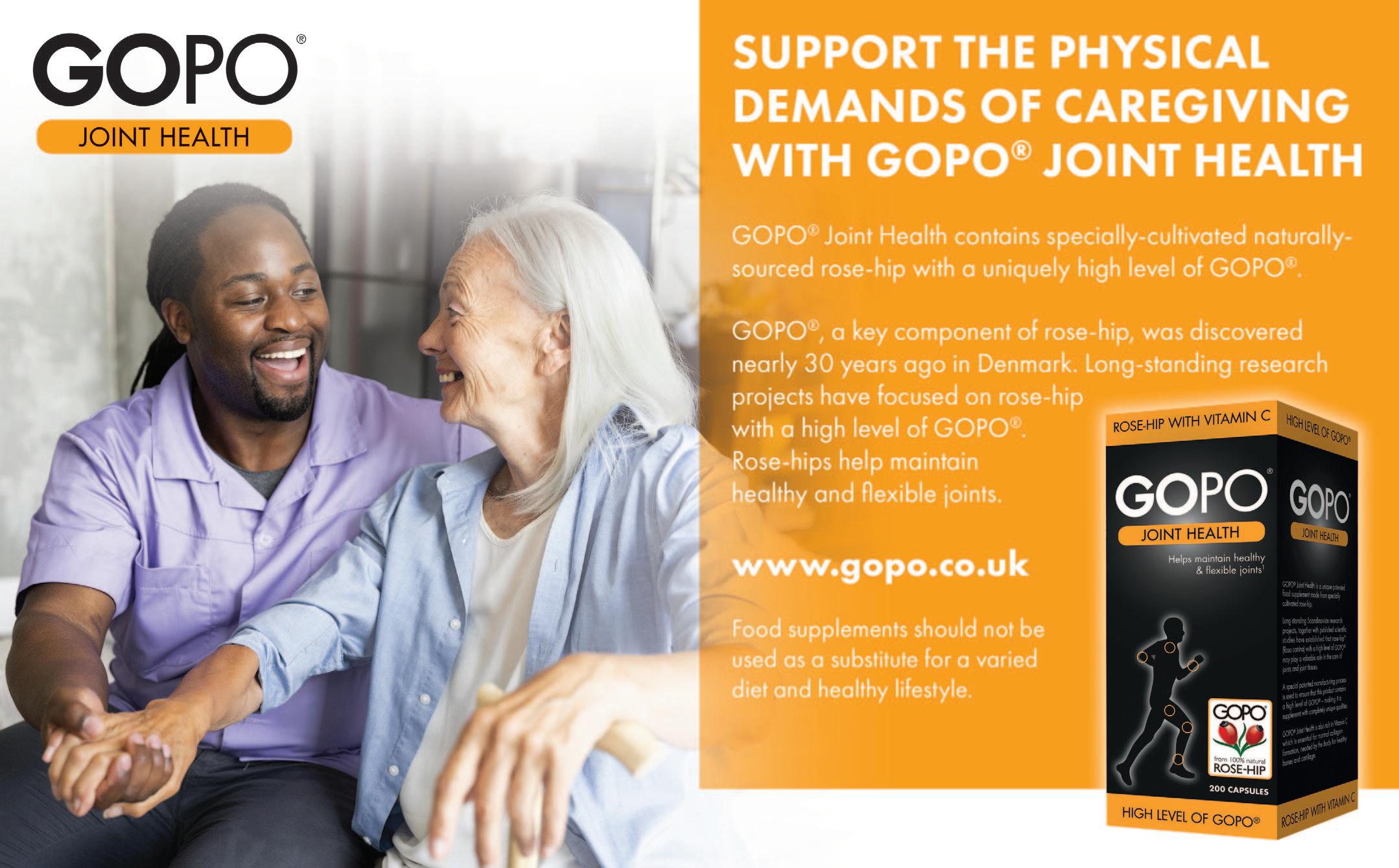
A staggering new global survey of care workers reveals a deepening staffing crisis in the health and care sectors, with nearly 70% of workers frequently understaffed and over a third (36.4%) saying they are always working short-handed.
Released on the fifth anniversary of the W.H.O.’s COVID-19 pandemic declaration, the UNI Global Union report—based on responses from 11,233 workers across 63 countries—exposes a care system still in freefall.
Despite being hailed as heroes, care workers face chronic understaffing, poverty wages, and surging workplace violence, driving many out of the profession and leaving patients at risk.
Workers without union protections are affected by this trend even more intensely. The same failures that cost tens of thousands of lives during the pandemic remain dangerously ignored.
UNI warns that these conditions are driving workers away from the sector, exacerbating a crisis that governments and employers have failed to address. The survey shows that union membership and collective bargaining significantly improve worker retention and satisfaction.
Safe staffing levels are essential for high-quality care and safer work environments, but chronic shortages in hospitals and care homes undermine patient health – even causing preventable deaths. For care workers, understaffing leads to poor morale, increased workplace violence and injury rates, and high turnover.
“Five years after the pandemic, care workers are still being overworked, underpaid and exposed to dangerous conditions,” said Christy Hoffman, General Secretary of UNI Global Union. “This report is a wakeup call. Without immediate action to raise wages, improve staffing levels, and combat workplace violence, care systems will collapse.”
Increased public funding for the care sector to ensure quality services, fair pay and a workforce that can meet growing demands.
“There is no shortage of care workers—there is a shortage of care workers willing to endure low pay, chronic understaffing and unsafe conditions,” said Alan Sable, Head of Care for UNI Global Union. “The care staffing crisis cannot be solved simply by training new workers or recruiting migrant care workers. Unless we address the core issues

driving people out of the sector—low wages, understaffing and widespread violence and harassment—the cycle of worker shortages and declining care quality will continue.”
UNI Global Union is calling on governments and employers to act now with the following urgent reforms:
• Higher wages and better benefits to make care jobs sustainable and retain workers.
• Mandatory safe staffing levels to prevent burnout and protect patient care.
• Stronger protections against workplace violence and harassment, including ratification and enforcement of ILO Convention 190.
• Fair treatment and legal protections for migrant workers, who face disproportionate discrimination and unsafe conditions.
• Support for union representation and collective bargaining, which improve working conditions and job sustainability.
• Increased public funding for the care sector to ensure quality services, fair pay and a workforce that can meet growing demands.
WORKER TESTIMONIES: “WE’RE FAILING—AND NO ONE CARES”
Real-life accounts from frontline workers expose the human toll of this crisis:
United Kingdom ( Hospital worker) “People being bullied and people being racist in our department, and it’s always brushed under the carpet, and I believe this is done because we are so short-staffed.”
New Zeland (Caregiver, Aged Care Facility) – “I was sexually assaulted twice by a resident because I wasn’t listened to or protected by my manager or my work colleagues. That occurred because of being short staffed and I ended up having to provide care to the person who sexually assaulted me a year prior.”
Kenya (Hospital Nurse) – “It should not be like this. Working with so little equipment, resources, drugs and with such high expectations in the populace. We’re failing, badly. And the government doesn’t care.”
Canada (Aged Care Worker) – “Every government has promised to make Healthcare a priority, that definitely has not happened. I had hoped that after the horrible living conditions shown during covid in long term care that things would improve. They have not other than the extra paperwork and political bullshit. I want to see us just take care of these people. We need the staff and support to do that!”
Austria (Nurse, Aged Care Facility) – “I was really looking forward to this job. But reality caught up with me very quickly. I’m shocked at what the government/country has done with the healthcare system. Everyone has said that a massive wave of pensions is coming, but fewer and fewer people have been trained. I now know 8 colleagues who have given up the nursing profession (these colleagues had too much heart and passion for this profession, and that was their downfall).”
United Kingdom ( Health care assistant) “I get paid £1 more than minimum wage to be assaulted daily. The level of staff turnover is so high they struggle to replace them.”
UNI Global Union said its report makes one thing clear: “Without urgent action, care systems – already strained by an aging population and still under threat from another pandemic – will crumble, and lives will be lost. The COVID-19 pandemic exposed deep, structural failures in healthcare—failures that led to tens of thousands of preventable deaths. Five years later, those failures remain dangerously ignored.”

People who live in care homes are more at risk of malnutrition, and when this is neglected the consequences can be serious. Malnutrition harms people’s health, reduces their quality of life, and increases the risk of falls and infections, which each come with associated time, resource and financial costs. It is therefore critical that comprehensive nutritional care is considered a fundamental part of the overall care package that care home residents receive.
Malnutrition occurs when a person’s diet does not contain the right amount of nutrients, or the body is unable to absorb or use these. One of the most significant challenges in addressing malnutrition is the widespread misunderstanding surrounding this issue, which sometimes results in it being overlooked and untreated. The prevalence of malnutrition in care homes is concerning; the NHS reports that 35% of patients admitted to care homes will be affected by malnourishment, with many already in this state upon arrival.1 Furthermore, surveys led by the charity the British Association for Parenteral and Enteral Nutrition (BAPEN) have repeatedly demonstrated that malnutrition affects up to 3 million people living in the community and nearly one in four people admitted to care homes, most of whom are at high risk.2 There is a common misconception that unintentional weight loss is an inevitable consequence of ageing and disease. However, with the right identification and management, malnutrition risk can be avoided or slowed.
SPOTTING THE SIGNS OF MALNUTRITION
Care professionals, including carers and nursing staff, play a crucial role in identifying and managing malnutrition, ensuring that residents care receive the appropriate support and interventions. Malnutrition often develops gradually, so it can be difficult to spot at first. Some common signs include losing appetite, unintended weight loss (look out for clothes or rings becoming loose), feeling tired and lacking energy, or finding everyday tasks harder to manage. You might also notice changes in your residents such as struggling to walk as far as usual, feeling down or sluggish, and having trouble concentrating. Moreover, dehydration is common issue that often goes together with malnutrition. Not drinking enough can lead to problems like confusion, urinary infections, and even falls.
It's also important to be aware of risk factors, as some people are more likely to suffer from malnutrition and dehydration than others. Older adults, especially those over 65, are particularly vulnerable. Chronic health conditions like diabetes, dementia, or kidney disease increase the risk, as do social issues like isolation. With more than 50% of over 65’s having swallowing problems, it is important to consider whether a modified texture diet is required and whether it requires fortification - seeking advice from speech and language therapists may be necessary for some residents.2
When malnutrition takes place, it can weaken the immune system and make illnesses worse, often trapping people in a cycle of poor health and slow recovery. Detecting malnutrition early makes all the differ-
ence. One of the most widely used tools is called the Malnutrition Universal Screening Tool (‘MUST’). It helps identify who’s at risk by looking at things like Body Mass Index (BMI), recent weight loss, and whether someone has been eating enough during illness. Depending on their risk level, residents can then get personalised care plans to help them recover or stay well. Integrating ‘MUST’ screenings upon arrival to a care home and at regular intervals (ideally monthly) is an effective way to spot the signs of malnutrition early, and therefore be in a position to implement a nutritional care plan. It is important to remember though that screening should only take place if there is an intent to treat this. For some people it may not be appropriate to intervene with nutritional treatment particularly at the end of life. In such cases clear documentation of discussions about this should be made.
MANAGEMENT OF MALNUTRITION
The fundamentals of managing malnutrition lie in recognising those at risk and implementing effective measures. Care home staff can encourage residents to eat more nutrient-rich foods, enjoy snacks, try fortified meals and support hand-feeding as needed. This “Food First” approach often works well, but sometimes a dietitian’s advice is needed. They might suggest oral nutritional supplements (ONS) for those with poor appetites. For residents who struggle to eat normally, tube feeding might be appropriate, depending on medical needs. Care homes can reduce the risk dehydration by ensuring residents always have access to drinks, offering a variety of options with support and prompting as needed. Keeping a close eye on fluid intake especially during hot weather or illness is important. It’s also worth considering the dexterity of your residents, and if they’d find it easier to consume their food or drink in a different way, e.g. a bowl rather than a plate, specialist cutlery, or a straw in a cup.
Early detection and personalised care, underscored by teamwork and commitment, are key to tackling malnutrition and dehydration. Proper training for care home staff is critical in combating malnutrition, and care workers need to know how to spot the warning signs, use tools like ‘MUST’ effectively, and offer meals that cater to each resident’s food preferences.
It’s important to remember that you’re not alone in addressing this issue. There are several organisations that provide resources and education to support those in care, whether you are a working in a care setting, or simply supporting friends or relatives. Helpful tools to suit your needs can be found from BAPEN, the Malnutrition Task Force, Age UK, the Malnutrition Pathway, and the British Dietetic Association have produced helpful guidance of nutrition and catering in the ‘Care Home Digest’.3 By investing time and resources to screening, assessment and management of nutritional care, care homes can improve residents’ wellbeing and reduce the strain on the wider healthcare system. In doing so, we can help prevent a cycle of poor health and ensure those in care get the essential and effective care they need.
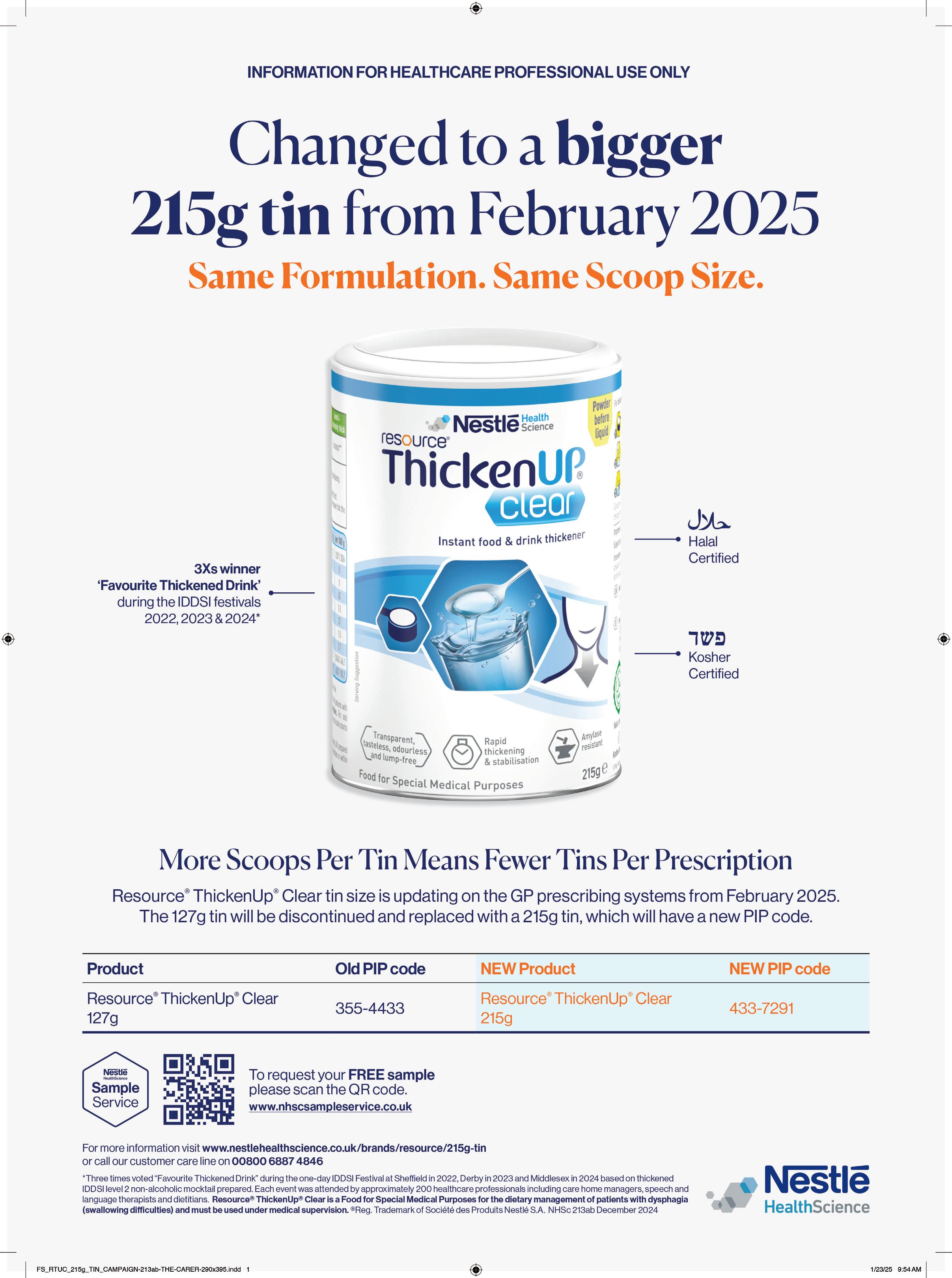


A family business has launched the UK’s first frozen nutritional supplement, ideal for care home residents who may be struggling to eat or drink.
icesupp are 100% plant-based frozen supplements, enriched with key vitamins, minerals, protein and calories, delivered in ice lolly formats to provide an easy-to-consume source of nutrition.

Amy Smith and her partner Robert Upton got the idea when they realised the lack of options for Amy’s father Ray as he struggled to build and maintain his weight during bowel cancer treatment.
Managing a conventional diet was very difficult, and the nutritional supplements available on prescription were unpalatable - too thick and sickly. However, Ray did discover that ice lollies were soothing and easier to consume.
“We were frustrated that the ice lollies Dad was having were just filled with sugar and water, and didn’t provide the nutrition and quality calories that he needed to keep his weight and strength up,” says Amy.
“The idea for icesupp was born – and it became our mission to create something that would combine the nutritional elements of a supplement shake with the more palatable form of a soothing iced refreshment.”
BAPEN’s Malnutrition and Nutritional Care Survey (2023) highlighted that nearly well over half (48%) of adults screened across UK health and care settings were at risk of disease-related malnutrition. This was particularly high amongst individuals with cancer, gastrointestinal conditions respiratory conditions, frailty and neurological diseases – so this is a very real issue for carers and families across the UK.
Following two funding rounds, Amy and Rob worked Reading University’s Food Science Department and a team of specialist advisors including top dietitians, an oncologist and a GP to create their unique, first-tomarket products, which come in two flavours – Mango & Passionfruit and Mixed Berries. 100% plant-based, each 86ml supplement pouch contains 5g of protein, 2.5g of fibre and 150 calories -
helping those who are struggling to eat to build strength and energy. A box of 12 products costs £23.75 from icesupp or Amazon. The products are shipped in ambient liquid form to be conveniently frozen then deliver the soothing sorbet-like iced consistency.
Nick Dutton, of Primrose Bank Care Home, says: "Helping those we care for to maintain and increase their nutritional intake is no easy task, made even more challenging when coupled with other dietary requirements, palliative care needs and the general challenges the care sector faces.
“When we came across icesuspp we were interested straight away. Having seen our own relatives struggling to eat well during palliative care and facing malnutrition and knowing the difficulties faced with different nutritional supplements and changing taste, we knew that a different way to deliver nutrients and flavour was a great idea.
“icesupps taste really good and we have had brilliant feedback from everyone in the home, residents, families and staff alike. We love that they are easy to store and also easy to eat without needing lots of preparation to make them enjoyable like some ONS.
“It’s great to have another tool for our team to use to improve our residents’ lives."


Amy concludes: “We have created an iced supplement that soothes and nourishes, helping to provide a moment of refreshing relief for those in need. Our goal is to help families like ours, who have experienced the devastating effects of dramatic weight loss and malnutrition, which can impact anyone, however those that are particularly at risk include those with an illness like our Dad such as cancer, and those aged over the age of 65, especially if they are in a care home or have been recently admitted to hospital.”
Dietitian Corrine Toyn says: “Malnutrition can be caused by range of factors. In the case of Ray, it was the side effects of the illness and his treatment, which is very common – but we know it is a real issue in care homes, along with dehydration. Oral nutrition supplements have been part of the solution to malnutrition for a while, as long as patients find them palatable and are compliant, but the majority of the ‘ready to drink’ supplements are highly concentrated, with a thick consistency that can be difficult to consume. Improving the flavour, mouth-feel and variety is vital to prevent patients’ taste fatigue, provide choice, and ultimately improve their quality of life. icesupp is such a brilliant idea, created with love and expertise, to respond to a real problem. It’s been incredible to see the reviews from customers, saying that icesupp tastes great and is easy to consume.”
For further information, email info@icesupp.com or visit the website at www.icesupp.com
Heathcare professionals can access the sample service at www.icesupp.com/pages/the-healthcare-professionals-hub

Taylor & Taylor, a group of family-owned residential care homes approached food procurement experts, allmanhall to achieve scalable cost savings and efficiencies to support their growth plans. They needed to ensure no detrimental impact to the excellent quality of their food offering and their residents’ dining pleasure.
Their desire was to achieve a 5% food cost saving and to ensure ongoing effective management of catering budgets and invoicing. Operationally, access to reports and insights were key, as was ease of ordering and management of stock and deliveries.
allmanhall undertook a like-for-like benchmark and identified achievable food cost savings of 11.4% - more than double the initial objective!
allmanhall delivered tech demos of the catering control platform for Taylor and Taylor, ensuring it met their needs and provided training for the team. As well as providing useful operational functionality like stock taking and standing orders, the catering control platform proposed would also give access to management reports and facilitate central billing and conversion of all supplier invoices in to 1 per month. Samples and on-site supplier meetings were also arranged on behalf of the homes, to confirm that the quality was to the required standard.
allmanhall have also supported Taylor and Taylor with the launch of a community engagement event for one of their newest homes.
A few months into the contract, the actual results were found to be an 18% food cost saving! You can watch this short video on You Tube to find out more… www.youtube.com/watch?v=e2QrrmaiG1Y
“From day 1, the care and attention provided by allmanhall has been exceptional. The team truly listen to us, to what our challenges are and are always willing to help in any way they can. Their approach is thorough and responsive, meaning we feel fully supported. Everyone we’ve met from allmanhall has been hands-on, down to earth, genuine and considerate.
We’ve been impressed by the savings we’ve already seen, the flexibility regarding suppliers and by the excellent quality. The consolidation of invoices into 1 per month is a huge win.
We have relationships and contact with people across the allmanhall team – all there to help and to advise or resolve depending on what we need. With challenges around labour shortages and food inflation, this is hugely valued. It frees up the team and gives us peace of mind.
We would wholeheartedly recommend allmanhall’s services to others in the care sector and look forward to continuing to grow our offering and provide outstanding food for our residents, with allmanhall as our trusted partners.”
allmanhall is an owner-managed, award-winning and trusted food procurement partner for care organisations across the UK. We help clients with a range of needs, including cost savings, administrative efficiencies, supplier management, dietetics and nutrition support, and sustainability goals. Get in touch to find out more:
Email: hello@allmanhall.co.uk
Telephone: 01225 745520
Website: allmanhall.co.uk
LinkedIn: @allmanhall


By Derek Aaronson, Founder & CEO of
Hart Home Group (www.harthomegroup.co.uk)

Infection control and prevention are critical components in safeguarding the health and well-being of individuals in medical, commercial, and domestic environments.
For the independent nursing and residential care home sector, maintaining stringent infection control measures is not just a matter of compliance, but a fundamental responsibility to ensure the safety of vulnerable residents. As the world continues to grapple with new and evolving health threats, the importance of infection prevention cannot be overstated.
THE
For nursing and residential care homes, infection control is especially crucial. Residents often have weakened immune systems due to age or pre-existing conditions, making them more susceptible to infections. In such settings, even a minor lapse in hygiene protocols can lead to the rapid spread of pathogens, which can have devastating consequences. Healthcare-associated infections (HAIs) continue to be a significant risk in care homes, leading to longer hospital stays, higher medical costs, and, in severe cases, death.
Therefore, infection control in care homes requires a combination of effective policies, thorough cleaning routines, and specialised equipment. Staff must be well-trained in infection prevention, and robust systems need to be in place to manage outbreaks when they occur. However, achieving a high standard of hygiene in care homes comes with its own set of challenges.
INFECTION CONTROL IN CARE HOMES
THE
Maintaining high levels of hygiene in care homes can be difficult for several reasons. The close proximity of residents, especially in shared rooms, communal spaces, and bathrooms, increases the risk of cross-contamination. Frequent touching of high-contact surfaces such as handrails, doorknobs, and shared equipment can facilitate the spread of germs. In addition, staff turnover and the demanding nature of care work mean that infection control protocols may not always be followed consistently.
The traditional reliance on manual cleaning methods can also be timeconsuming and may not always be effective in eradicating harmful bacteria and viruses. With the rise of antimicrobial-resistant organisms (AROs), which are more difficult to treat, care homes must adopt more advanced solutions to combat the spread of infection.
SOLUTIONS TO ENHANCE INFECTION PREVENTION IN CARE HOMES
The solution to these challenges lies in a combination of better practices, staff training, and, crucially, the use of advanced infection control technologies and equipment. Specialised hospital-grade fixtures, such as antimicrobial door handles, bed rails, and mobility aids, are invaluable in preventing the spread of infection in care homes. These fixtures are designed with non-porous materials that are easy to clean and resistant to microbial growth, ensuring that harmful pathogens have fewer places to thrive.
In addition, the use of touchless technologies is gaining traction in care homes as a way to reduce human contact with frequently touched surfaces. For example, touchless faucets, soap dispensers, and hand sanitisers can significantly minimise the risk of cross-contamination. These innovations not only make it easier to maintain hygiene but also improve the overall user experience for both staff and residents, especially for those with limited mobility.
Innovative cleaning solutions, such as UV-C sterilisation devices, are also helping care homes maintain higher standards of hygiene. UV-C light has been shown to be effective at killing bacteria, viruses, and fungi on surfaces and in the air , providing an added layer of protection that manual cleaning alone cannot guarantee.
The role of design and product innovation in infection control is crucial. Products designed with infection prevention in mind—such as hospitalgrade furniture, non-porous flooring, and antimicrobial textiles—play a crucial role in reducing the potential for cross-contamination in care homes. By choosing products made from materials that are resistant to bacterial growth and easier to sanitise, care homes can significantly reduce the risk of infections spreading.
Mobility aids, including walkers, wheelchairs, and lift chairs, are another area where innovation is making a difference. Many of these products now come with antimicrobial coatings that help reduce the risk of pathogens accumulating on surfaces frequently touched by both residents and staff.
These small changes in the design of everyday equipment can contribute to a cleaner, safer environment for both residents and caregivers. Moreover, the growing use of digital solutions, such as automated temperature monitoring, air quality control systems, and remote monitoring devices, is transforming infection control in care homes. These technologies allow staff to track and manage infection risks more efficiently, making it easier to identify potential outbreaks before they escalate. EMERGING TRENDS: TOUCHLESS TECHNOLOGY AND SUSTAINABLE MATERIALS
As the infection control industry evolves, there are two key trends that are gaining momentum: the integration of touchless technology and the use of sustainable materials. The increasing adoption of touchless systems, such as motion-activated doors and automated sanitation stations, is helping to prevent the transmission of pathogens, especially in hightraffic areas. These technologies not only improve infection control but also enhance the overall user experience by reducing the need for physical interaction, which is particularly beneficial in care settings where residents may have limited mobility or dexterity.
Sustainability is another important consideration in infection prevention. The use of environmentally friendly materials—such as biodegradable cleaning products, sustainable textiles, and recyclable medical supplies— ensures that infection control measures are both effective and responsible. The growing demand for eco-friendly solutions in care homes is part of a larger global movement towards sustainability, where reducing environmental impact goes hand-in-hand with enhancing hygiene standards. Infection control and prevention are vital to ensuring the health and safety of residents in care homes. While the challenges of maintaining hygiene in these environments are significant, the solutions are becoming increasingly effective with advancements in technology and product innovation. From hospital-grade fixtures and antimicrobial mobility aids to touchless technology and sustainable materials, these innovations are helping to reduce cross-contamination and improve overall safety. As the sector continues to evolve, adopting these innovations will be key to enhancing infection prevention protocols and safeguarding the health of vulnerable individuals across nursing and residential care homes. Through a combination of best practices, innovation, and thoughtful design, care homes can create a safer, cleaner, and more resilient environment for residents and staff alike.
How can buyers of cleaning chemicals find sustainable solutions that are also effective and safe to use. The Cleaning & Hygiene Suppliers Association (CHSA) has published a White Paper designed to help: The Evolution and Regulation of Cleaning Chemicals.
Buyers and end users of cleaning chemicals want environmentally sustainable, safe and effective cleaning chemicals. Environmental mes-
sages can be seductive, particularly when coupled with highly competitive prices. In the regulated arena of cleaning chemicals, it is difficult to produce products that are effective, have a minimal impact on the environment and are sustainable. It takes years of investment and testing to get the products right and clear the regulatory hurdles. It’s not surprising, therefore, that some organisations are looking for short cuts.

They argue technology is moving so fast there is no time for independent verification or regulation. Essentially, they are suggesting the need for some kind of environmentally sustainable solutions outweighs the need to know if the solution is indeed environmentally sustainable, if it works or how to use it to be certain it is safe.
Regulations, however, matter. They guarantee safety. They underpin transparency and ensure consistency. They provide a framework for comparison, so a buyer really knows if they are getting the product or solution they need. They also provide accountability, giving buyers a route to recourse if needed. In short, they underwrite an ethical approach.
The CHSA’s White Paper was written by Peter Thistlethwaite, Technical Manager – Cosmetics and Biocides at MSL Solution Providers. Peter is a Microbiologist and MSL Solution Providers offers an integrated regulatory and laboratory testing service. Its in-house accredited microbiology and virology laboratories provide a comprehensive range of standard tests, including efficacy testing against bacteria, fungi,
spores, viruses, mycobacteria, legionella, and algae.

The White Paper explains the evolution of cleaning chemicals. It explains how testing systems with recognised methodologies were introduced to “to prove chemicals were effective but hand-in-hand they gave a way to remove fraudulent products, offering better protections”. Peter explains in the White Paper, “Regulations are intended to ensure a cleaning product is safe for the user and the environment when used correctly. The aim of enforcing regulatory requirements is to ensure products on the market can be trusted and that the companies selling them maintain the highest standards of integrity.”
Peter continues: “Product innovation means testing and regulatory requirements in the biocide market are becoming more complex, and the costs to enter markets are rising. This is expected to lead to a rise in fraudulent products, bypassing or ignoring regulations. Many are making claims about safety and efficacy without the proper technical support from correct testing. They are also using eco-friendly language to appeal to environmentally conscious consumers. Buyers need to beware.” @CHSACleaning www.CHSA.co.uk
Angloplas are a UK manufacturer who specialise in producing dispensers for the health and hygiene industry. Although these are designed to keep the workplace tidy and uncluttered they are, more importantly, built knowing the control of healthcareassociated infections (HCAIs) are a priority for healthcare providers, and who are employing a combination of infection prevention and control strategies, including hand hygiene, cleaning, training and the adoption of new technologies, to tackle the problem.

As a result, a wide range of infection control products and technologies are emerging on the market, including antimicrobial technology. Angloplas’ range of dispensers are produced in the world’s
first proven Antimicrobial PVC with silver ion technology and which is exclusive to Angloplas. This helps reduce the risk of cross infection by stopping the growth of bacteria and mould and works continuously for the lifetime of the product, reducing levels of bacteria such as MRSA, E Coli, Legionella, Salmonella and mould by up to 99.99%. For non-clinical environments Angloplas has recently launched its new Budget Range of products which are made to the same exacting standards as the antimicrobial protected ones but with lower price tags.
You can order Angloplas products directly from its website at www.angloplas.co.uk

Ensuring strict hygiene standards in care homes is a complex yet essential task, particularly when it comes to laundry processes. With infection control a top priority, operators must comply with stringent regulations, including CQC guidelines and WRAS Category 5 requirements. The latter classifies care environments as high risk due to the potential contamination of water supplies, necessitating specialist equipment and backflow prevention measures to safeguard residents and staff. Failure to meet these standards can not only compromise infection control but also lead to regulatory penalties and reputational damage.
Laundry plays a critical role in infection prevention, yet many care homes still rely on domestic machines that are not fit for purpose. Unlike commercial alternatives, these machines do not achieve the necessary wash temperatures, cycle durations, or thermal disinfection standards required to remove harmful pathogens effectively. This not only increases infection risks but also puts facilities at risk of non-compliance. Furthermore, improper segregation of laundry—such as mixing soiled items with general loads—can accelerate the spread of infections, a concern that has only intensified in recent

years. Best practice guidance advises that care homes implement a clear separation of clean and contaminated laundry, supported by colour-coded processes to avoid cross-contamination.
Forbes Professional, an expert in commercial laundry solutions, advises care home operators to invest in WRAS-approved, commercial-grade washing machines and sluice systems designed specifically for healthcare environments. Miele’s hygiene-specific functionality, for example, ensures that thermal disinfection is achieved within every cycle, offering protection against bacteria and viruses. Additionally, hot water feeds, appropriate drainage, and compliance with Category 5 backflow prevention are crucial in preventing contamination. With evolving compliance requirements and the ever-present risk of infection outbreaks, care homes need to ensure that their laundry operations are fully up to standard. Forbes provides expert guidance and tailored site surveys to help care operators navigate these challenges, ensuring their facilities remain both
for residents and staff alike.
We have recently set up a specialist facility in St. Neots, near Cambridge, in which we are going ahead with this specialist refurbishment programme. This programme involves purchasing existing machines, and replacing the parts on them, so that they are as good as new, whilst retaining the look and feel that existed before, but with a massively increased lifespan, and a warranty on the machines that’s as good as a warranty on a new machine to go with the refurbishment too.

Our refurbishment programme in our specialist facility includes stripping down the machines, and giving them a check-over, to see which parts, if any, can be carried over the refurbishment. Lavamac will only carry over the highest-quality parts from the machine from pre to post
info@laundrytec.com www.lavamac.eu


Pinpoint ltd, the UK’s leading provider of staff alarm systems to high-risk workplaces, has seen its P2 System installed in the UK’s first safe drug consumption facility, The Thistle.
The facility opened its doors on 13 January 2025 to provide a clean, safe space for the public to use drugs safely under clinical supervision. It also provides drug users with access to a wide range of treatment and support.
Pinpoint’s P2 Staff Attack System was chosen as the preferred staff safety alarm system to ensure the swift delivery of assistance in high-risk medical situations. Access to the Pinpoint P2 System ensures help can be summoned quickly providing staff with the peace of mind that help is forthcoming when they need it most.
Staff members at the Thistle will be given a personal alarm, or P2 PIT, at the start of each shift which can be activated if required with the simple press of a button.

Once activated, the P2 PIT communicates with receivers located throughout the building, which in turn notifies display devices of the exact location and severity of the alarm call. This provides vital information to enable colleagues to respond appropriately.
Daniel Waring, CEO of Pinpoint Limited, said:
“Pinpoint is proud to be part of this UK first Safer Drug Consumption Facility. Having worked with The Hunter Street Health Centre, where The Thistle is based, since 2003, we are well aware of the challenges staff may face in their day-to-day duties.
“The P2 System, chosen for its precision, reliability and durability, will ensure staff can access a response when they need it most, allowing them to carry out their duties without fear and provide the highest quality of care.”
Visit http://pinpoint.ltd.uk for further information or see the advert on page 19.
Skopos Studio is a new design library idea from Skopos, enabling interior designers for Care to pick from a large range of designs to suit their project.
Categorised under different design types, such as ‘Botanical and floral, textures, stripes and checks’ this format provides choice for customers to select their end use and appropriate flame retardant base-cloth, and then select the designs and colourways which can bring their schemes to life.
The Studio collection provides a easy ‘go-to’ option containing design inspiration to create a Caring‘Home from Home’ experience. Skopos have a long history in print, with over 50 years of design experience which shines through in the Studio binder, with samples of all designs available via the

website.
Designs in Skopos Studio have been developed to work hand in hand with our beautiful accent collections and upholstery fabrics for a cross-section of projects. Choose from our fabric-only solution or a full-service option, including measure, product make-up (curtains, cushions, blinds and bed-throws) and installation. If you require something unique, our Bespoke service can offer custom colour options for a minimum meterage.
View the complete collection: www.skoposfabrics.com/studio-prints See the advert on page 4 for more information.
Chiltern Water & Environment was established in 1991 by Robert Hunt after gaining 25 years' experience as an operational and analytical scientist in the water supply industry. The company gained engineering and further management knowledge when David Hunt joined in 2012. Since then, other water industry professionals have added to the breadth of knowledge and experience within the company.
We have always provided high-quality consultancy, testing and remedial services in a professional but personable manner. Our steady growth has reflected our clients' trust in our services. Our current clients include large housing associations, pharmaceutical companies and facilities management companies, as well as individual landlords and small businesses. We ensure all our customers receive the same level of care and attention to detail.


Duty Holders of all commercial and public building premises are legally required to assess the risk from legionella to anyone using the water systems and put in place legionella control measures if required. The HSE has produced ACoP L8 and HSG274 as guidance for Duty Holders obligations.
We have clients throughout the South East, London and the Midlands, and carry out water tests nationally and internationally. We currently provide regular water sampling and testing for over 500 sites.
Tel: 01844 347678
Email: info@chilternwater.co.uk www.chilternwater.co.uk
See the advert on page 21 for more information.
Consort Claudgen’s innovation in the electric heating industry takes another leap forward by introducing Wi-Fi-enabled heaters to their low surface temperature (LST) range. These cutting-edge heaters offer unparalleled convenience and efficiency.
The heaters connect directly to Wi-Fi, enabling users to control heating through the digital control panel on the heater or via the Consort Connect app. With a comprehensive 7-day timer, which allows 24 individual heating periods per day, and features such as a lock function, open window detection, and custom automation, users can tailor their heating needs to their preferences.
Adding to the ease of use, users can view the energy consumption statistics of
all connected heaters, providing insights into usage patterns and potential savings. The LST heaters with Wi-Fi and occupancy sensors have a self-learning control ability. They utilise in-built occupancy sensors to detect and learn a user’s weekly presence in a room, creating an intuitive heating schedule. When the space is unoccupied, the heater conserves energy by switching to a setback temperature or frost protection mode.
BIM (Building Information Modelling) objects for the heaters are available for download from Consort’s website. 01646 692172 | sales@consortepl.com | www.consortepl.com
See the advert on page 5 for more information..
CareZips® Classic are patented, easy dressing unisex adaptive pants designed for older and disabled people suffering with problems associated with continence, mobility, mental function and cognition. Suitable for persons living in care institutions, receiving care at home or living independently at home, CareZips® Classic enable people to dress themselves or with assistance from carers.
CareZips® Classic feature patented 3-zipper system, which opens the front of the pants from the waist to the knees for quicker access during toileting, continence pads changes and personal hygiene. The forward positioning of the two side zippers lessens pressure on sensitive hip areas, helping to eliminate discomfort. The third zipper facilitates simple full frontal opening for faster more dignified diaper changes, catheter adjustments, personal cleansing and hygiene routines.
CareZips® Classic have many benefits for the older and disabled users and their carers:
• People dressing themselves enjoy the practical functionality and versatility of the
CareZips® Classic, all day comfort and easy garment care.
• People dependent on assisted dressing appreciate quick easy dressing process with less stress, embarrassment and greater dignity offered by CareZips® Classic.
• CareZips® Classic offer practical gains to the carers, helping them to provide better care, whilst reducing physical efforts and saving valuable time.
CareZips® Classic are unisex, available in 6 sizes and 3 practical colours (i.e. black, charcoal and navy). Tapered fit at the ankles gives a tidy appearance. Made from breathable moisture-wicking 4-way stretchy crease-free and easy-care durable fabric, CareZips® Classic are comfortable, practical and conveniently functional.
For more information, contact Win Health Medical Ltd - 01835 864866www.win-health.com
See the advert on page 3 for further information on Win Health’s product range.

At Little Islands, we understand the power of nostalgia in bringing comfort and joy to care home residents. Familiar surroundings, evocative sights, and meaningful sensory experiences can unlock treasured memories, sparking conversation and connection. For years, we have been crafting bespoke themed rooms and areas that do exactly that—transporting residents back to fond moments in their lives. However, bespoke designs often come at a premium, making them inaccessible for some care homes.
That’s why we have developed a range of standard themed packages, making it easier than ever for care homes to create high-quality, engaging spaces that foster reminiscence. Many homes have the capability to build themed areas themselves but sourcing appropriate and authentic content can be a challenge. Too often, well-intentioned efforts result in spaces that feel more like children’s play areas rather than immersive environments tailored for adults.

Our themed packages take the guesswork out of the process. Each package includes everything needed to transform a space, allowing your maintenance and care staff to set it up with ease. Most homes already have suitable furniture and decorative items to complement the theme, but we also offer optional extras to enhance and expand each setting as required.
Whether it’s a traditional British high street, a 1950s tearoom, or a classic seaside retreat, Little Islands’ thoughtfully designed themes ensure that your residents can enjoy a truly meaningful and immersive
Since our founding in 2010, Activities to Share has been dedicated to enhancing the lives of those in care by providing thoughtfully designed activity products. Our mission is to support activity coordinators in delivering uplifting, engaging experiences that foster connection, joy, and well-being.
We achieve this by listening closely to your feedback and evolving with your needs. Whether over the phone, via email, WhatsApp, or Live Chat on our website, our team is always ready to offer advice and help you find just the right products to bring your ideas to life.
While we embrace the convenience of technology to expand our resources and share knowledge, we remain firm believers in the irreplaceable power of sensory
experience. By stimulating multiple senses in a focused direction, these environments help trigger happy memories, encourage social interaction, and improve overall well-being.
With our themed packages, creating an engaging reminiscence space has never been easier or more affordable. Let’s bring back those cherished moments—together.
Our S.M.A.R.T. Room packages include:
• Traditional flame effect stove (For H&S the heat element is
• Double sided railway wall clock
• Themed Railway game and jigsaw puzzle
• Interior design Specification sheet
Contact us today on 01282 869802 or via hello@littleislands.org to discuss how we can help transform your care home.
See the advert on page 5 for more information.


MOWOOT II – proven solution to chronic constipation without medication
Developed by a team of doctors and other healthcare professionals, MOWOOT II performs gentle abdominal massage to speed up intestinal passage in people experiencing chronic constipation.
Clinically proven, safe and effective, relaxing and side-effects free, MOWOOT II Abdominal Massage Therapy System combats constipation and provides soothing relief to affected people. Easy to use and comfortable, the MOWOOT II treats and manages constipation in people with spinal cord injuries, multiple sclerosis sufferers, Parkinson’s Disease patients and people with constipation related to prescription medication. MOWOOT II also helps to relieve idiopathic constipation experienced by menopausal and post-
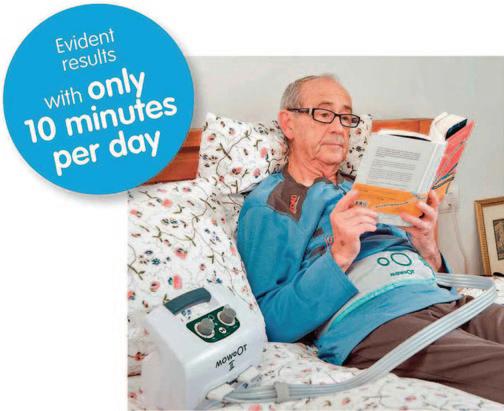
menopausal women and older and elderly people. In clinical studies MOWOOT II increased evacuation frequency, softened stools, improved regularity, reduced gasses, relieved bloating and eased off abdominal discomfort. 10 to 20 minutes daily of relaxing abdominal massage with MOWOOT II rapidly reduces symptoms of constipation.
Evident results are experienced only a few days after the first treatment. Regular abdominal massage with MOOWOOT II ensures lasting health benefits and better quality of life.
MOWOOT II – effective solution to chronic constipation for better quality of life!
Supplied by Win Health Medical Ltd - 01835 864866 - www.win-health.com See page 3 of this issue for other Win Health products.
engagement. That’s why we continue to make our Reminiscence Kits and Sensory Bags with real, tactile items that stimulate the senses. Some experiences—like popping bubbles for the splash, breathing in a familiar scent, or piecing together a puzzle with others—simply can’t be replicated on a screen. These sensory moments are invaluable in encouraging storytelling, sparking memories, and fostering conversation.
Our values remain rooted in this commitment to meaningful connection. We’re here to partner with you—the professionals on the front lines of care—to create a sense of structure, well-being, and fun for those who need it most.
Are you longing for your activity diary to be full? Look no further www.activitiestoshare.co.uk are here for you! See the advert on page 23 or: customers@activitiestoshare.co.uk
0117 966 6761 07900 6751 50
REM have been manufacturing furniture for the Hair & Beauty Sector for over 100 years and are now considered to be one of the largest manufacturers in both the UK & Europe. Our exclusive designs and meticulous British workmanship offer customers a wide range of furniture for every conceivable Salon environment. Understanding the growing requirement for Care & Residential Home Salons the REM Design Team have produced the Pendle Care range for the small, compact Care Home Salon. This new range includes ergonomically designed, height adjustable styling chairs and

the Pendle Easy Wash Unit with two ceramic basins allowing frontwash with wheelchair access and a tilting backwash basin for the more able clientele. Should the need arise, our experienced Design Team can help you create a stimulating Salon environment for your clients. The REM Salon Interior Design Package which includes 2D and 3D AutoCad plans and visuals can be ordered for only £295 +VAT and is fully refundable on an order placement of £3000 or more. Contact us on 01282 619977 or email sales@rem.co.uk See the advert on page 17 for details.
The Oxford Up is an active manual stand aid, supporting assisted standing, seated transfers, and patient rehabilitation. Suitable for clients who require some assistance when standing but are able to participate and contribute effort to the process, the Up can also be deployed as a useful rehabilitation aid.
With a safe working load rating of 200kg (31st), the Up quickly disassembles into three separate components, significantly easing storage requirements and onward transportation. Reassembly takes a matter of seconds, and its ready for use again.

A large multi-point push handle aids manoeuvrability for the caregiver, and the foot push pad pro-
vides a means of generating forward momentum when moving a patient. Optimum positioning of the swing-away seat pads and knee support help ensure comfort for the patient. Adjustable leg opening allows closer access around furniture, promoting improved patient positioning and general ease of use. Additionally, the enclosed footplate ensures no accidental foot or toe entrapment associated with mechanical components.
Where additional seated support is required, the Oxford Deluxe Standing sling (With Clips) is fully compatible with the Up and available in three standard sizes: small, medium, and large. For more information including how and where to purchase, please contact the Oxford customer services team on 0344 811 1158 send an email to info@joerns.co.uk or visit our website at www.joerns.co.uk
In the landscape of residential and nursing care, one issue stands out for its significant impact on resident wellbeing and the quality of care provided: fall prevention.
Falls are a major concern in care homes, with older residents being three times more likely to fall than those living in their own homes. This heightened risk is attributed to factors such as physical frailty, long-term conditions, physical inactivity, multiple medications, and the unfamiliarity of new surroundings.
The statistics are alarming. Every day, there are 2,799 calls for fallrelated injuries, and almost £1 billion has been spent on ambulance calls for falls over the past four years.
This not only underscores the urgent need for effective fall prevention strategies but also highlights the broader implications for healthcare systems and society at large.
Falls have far-reaching consequences that can be categorized into physical and psychological effects. Physically, falls can result in immobility, incontinence, cuts, bruises, soft tissue injuries, fractures, respiratory infections, head injuries, dislocations, pressure injuries, dehydration, hypothermia, and even fatality.
Psychologically, the impact can be just as severe, leading to feelings of uselessness, increased dependency, emotional stress, loss of con-
trol, social isolation, fear of further falls, low self-esteem, embarrassment, anxiety, depression, loss of confidence, and carer stress.
The fear of falling can create a vicious cycle where the fear itself contributes to an increased risk of falls.
Despite the common belief that falls are an inevitable part of ageing, this is not the case. Most people over 65 do not fall each year, and falls are often the result of identifiable risk factors. By recognising and addressing these risk factors, we can significantly reduce the incidence of falls and their associated consequences.
Falls prevention is about recognising a person's risk factors and, where possible, removing or reducing them. While the risk of falling can never be completely eliminated, a multifactorial falls risk screen (MFRS) can help identify and mitigate these risks. This includes assessing environmental risks within the care home.
In your care home, the emphasis should be on anticipating and preventing falls, rather than simply managing falls once they have occurred.
According to studies, the main risk factors associated with falling among older people living in long-term care homes are: history of falling; poor vision; use of multiple medications; chronic diseases; use of walking aids; vertigo; and balance problems. Women had a higher
risk of falling than men.
To effectively prevent falls in care environments, a comprehensive approach is required. This involves regular training for staff on fall prevention techniques, the use of appropriate safety equipment, and the implementation of best practices tailored to the needs of each resident. Environmental modifications, such as ensuring adequate lighting, removing trip hazards, and installing handrails, are also crucial.
Tips in prevention include:
Keep active
Individualised exercise plan
Consider referrals with physiotherapists and occupational therapists
Make sure the mobility/walking aids are adequate.
In conclusion, fall prevention is not just about reducing the number of falls but also about enhancing the overall quality of life for residents. By taking proactive steps to identify and mitigate risk factors, we can ensure that our care homes are safe and nurturing environments where residents can thrive without the constant fear of falling. Most instances leading to falls in the elderly are related to their living environment; but by following simple tips and providing assistive equipment, the risk of falls can be significantly reduced.
Fall Savers®, are an experienced market leading healthcare provider of resident safety solutions for over 15 years.

FALL SAVERS ® WIRELESS MONITOR
Eliminate all cables with our new generation falls management solutions!
Upgrade your falls programme with the latest technology from Fall Savers®.
The NEW Fall Savers® Wireless eliminates the cord between the monitor and sensor pad. This results in less work for nursing staff, improved safety for patients and reduced wear and tear on sensor pads. Wireless advantages include the ability to use one monitor with two sensor pads simultaneously and support for many new wireless devices.
BENEFITS INCLUDE:
Safer for patients; less work for staff
Bed and chair pads available
One monitor works with two sensor pads
Integrates with most nurse call systems
A variety of options, including: Call button Pager
®FLOOR SENSOR PAD
The TreadNought® Floor Sensor Pad is built to last with a durable construction that far out lasts the competition. Our anti-bacterial floor sensor pad is compatible with most nurse call systems or can be used with a portable pager to sound an alert when a person steps on to the sensor pad. Caregivers typically place the sensor pad at the bedside, in a doorway or other locations to monitor persons at risk for falls or wandering. An optional anti-slip mesh reduces the potential for slippage on hard surface floors.
FEATURES INCLUDE:
Connects directly to most nurse call systems
High Quality anti-bacterial Floor Sensor Pad
Large Size Pad: Measures (L) 91cm x (H) 61cm
Options (sold separately):
Anti-slip mesh for hard surface floors
See the advert on this page for further details or visit www.fallsavers.co.uk.


In the post pandemic world, we have all seen the effects of supply chain problems with the invasion of Ukraine and other alarming global factors, ever increasing costs of living and other more local issues which have driven up the rate of inflation over the last few years. The impact of this meant that most manufacturers of electronic products had to increase their prices as costs spiralled. This, of course, has impacted the end user. The most dramatic impact has been on the Care Industry. An industry that has lacked the support it desperately needs in these trying times.
Courtney Thorne, at the same time, took a strategic decision to take a close look at our core products, right down to component level, the objective being to make us less vulnerable to future global supply chain issues, and to reduce the cost of each product with the amin of ensuring that we deliver the same high quality product at a cost protected price. We had to ensure that this would happen without jeopardising the superb lev-

els of support we provide to our valued customer base.
This ground up review involved all departments from Research and Development right through to the Field Service team (and everything in-between). This in-depth collaboration took time as we had to ensure that each and every element was refined, perfected and tested to our (and our customers) rigorous requirements.
Whilst many organisations have limited-time or end of product line offers, we are very pleased to announce a price reduction on our core Connect and Connect Health Nurse Call system ranges. With flexible terms, full integration with Care Apps, celebrated service delivery and the most reliable and robust solution now at a new lower price, there has never been a better time to talk to us about a new nurse call system.
For more information email us at: info@c-t.co.uk or see the advert on this page.
Blaucomm’s Nurse Call Messaging Service (NMS) is the market leading solution to remove the dependency on noisy nurse call panels and pagers, through its intelligent software, which delivers the alerts straight to the care staff who need them.
Care homes are rapidly introducing smartphones for digital care planning and eMarnow, the same devices can be used to receive the nurse call alerts they need for the residents under their care.
Furthermore, Blaucomm NMS is deeply linked into Person Centred Software MCM, so call bell data is linked straight to care plans. This unlocks a huge benefit to care homes to enhance the staff performance with how they accept and respond to residents, which ultimately promotes better response times and visibility for management to audit their performance.

The best part is that Blaucomm NMS links into your existing nurse call system - we work with all major
brands such as Aidcall, ARM, Courtney Thorne, C-TEC, ENS, Intercall, Medicare, SAS and TeleAlarm.
Care operators are constantly recognising Blaucomm NMS for its reliability and dependability to their care operations, which is why we’ve been chosen time and time again over other solutions.
Head of IT Trudi Harrow at WCS Care had this to say about Blaucomm NMS:
“We find Blaucomm is a genuinely fantastic company with a reliable product. "We would highly recommend this to anybody who wants to replace expensive pagers and silence those annoyingly loud nurse call screens!”
To find out more about Blaucomm NMS, visit
www.blaucomm.co.uk/healthcare
See the advert page 5 for more details.
Medpage Limited has collaborated with a leading UK manufacturer of crash mats to deliver a cost-effective tool for falls management strategies. The inclusion of the new TumbleCare full-length pressure mat sensor ensures that should a patient tumble out of bed, an alarm signal is generated to alert care staff to the incident, resulting in a recordable improvement to patient safety and service.
Crash mats act as a protective barrier, absorbing the impact of a fall and reducing the risk of serious injuries when a person tumbles out of bed. Beneficial for individuals who are at high risk of falling, such as older adults, patients recovering from surgery, or those with neurological conditions such as epilepsy.

Falls can pose significant risks, especially in healthcare settings and senior care facilities. Every year, thousands of people suffer injuries due to falls from beds and other furniture. To prevent these accidents and ensure the safety of patients and residents, it is essential to implement effective falls and safety management strategies.
Further details can be obtained by telephoning 01536 264 869 or emailing sales@easylinkuk.co.uk
See the advert on page 2 for details.

Cyber security is an increasing concern in social care, with data breaches, phishing scams, and cyber attacks putting sensitive information and essential services at risk. However, learning about cyber security can often feel overwhelming, full of jargon, and difficult to apply to everyday situations. That’s where the Digital Care Hub’s new Cyber Game comes in—an engaging, interactive way for adult social care providers to learn vital cyber security skills.
Learning doesn’t have to be dull. In social care, where training is essential but time is scarce, gamification—using game-like elements such as quizzes, rewards, and interactive challenges—makes learning more engaging and memorable. It provides a safe space to learn and make mistakes, increasing engagement, motivation, and knowledge retention. Gamification also allows for instant feedback and supports long-term behaviour change, making it an effective tool for cyber security training.
THE FIRST-EVER CYBER GAME FOR SOCIAL CARE
The Digital Care Hub has launched the first-ever Cyber Game designed specifically for adult social care providers. It offers a fun and practical way to learn about cyber security and data protection, helping care managers, care workers, and other staff members develop the skills they need to keep their organisation safe.
The Cyber Game takes players through real-world scenarios relevant

to social care settings, making it easier to recognise and respond to cyber risks in a safe environment. Whether it’s identifying a phishing email, ensuring secure data sharing, or responding to a cyber incident, players gain hands-on experience that translates directly to their work environment.
One of the biggest challenges in cyber security training is making it relatable. The Cyber Game brings cyber risks to life through realistic characters and workplace situations. Players can take on the role of a registered manager, a data protection lead, or a care worker, each facing different cyber threats.
Each scenario is based on real cyber incidents that have affected
social care providers. The goal is to manage the crisis effectively—containing the damage, notifying the right people, and implementing steps to prevent future incidents. Decisions impact security, time, and cost, requiring players to balance risk and consequences.
WHY GAMIFY CYBER SECURITY TRAINING?
Daniel O’Shaughnessy, from the Digital Care Hub, explains:
“We created the Cyber Game to make cyber security training more accessible and engaging. Gamification encourages active participation and helps staff retain information better, making learning feel rewarding and practical.”
WHAT CARE STAFF SAY
Care staff who tested the game found the scenarios helpful and realistic:
“These are good scenarios – typical and indicative of what may occur and give people an idea of what they need to be thinking about.”
Through interactive decision-making, players experience the consequences of their choices, reinforcing key lessons in a way that traditional training cannot.
TRY THE CYBER GAME TODAY!
The Cyber Game is available online, completely free to play. It’s a great way for care providers to improve their cyber security awareness in an engaging and practical way.
Play the game online at: www.digitalcarehub.co.uk/cyber-game
The delivery of safe care is the paramount responsibility of social care providers. Central to achieving this is the governance framework adopted by service providers. And at the core of this framework are policies and procedures. These enable the provider to comply – and evidence compliance –with relevant legislation and regulations, as well as facilitating best practices, supporting business needs, and assisting in recognising and managing risks.
Providers have a legal duty of care to the people they employ. Policies and procedures should provide clear guidelines to staff on how the organisation operates, as well as informing them of best practices and processes to be followed.

Policies should be reviewed annually as a minimum to ensure they are still fit for purpose and align with legal and regulatory requirements. They should be reviewed not only by
employees of the business, but also by experts in various subject matters (e.g., infection control or medicines management).
For many small- to medium-sized providers, there may not be the in-house skills, knowledge, and experience to complete such a robust annual review. Many choose instead to purchase their policies and procedures from a reputable provider like W&P Compliance & Training, who will also complete reviews and ensure their policies and procedures remain up to date. This way a provider not only ensures they remain compliant; they also benefit from best practice policies and procedures that provide a solid foundation for safe working practices and – ultimately – protect and support service users and staff. Ben Erskine – Director at W&P Compliance & Training www.wandptraining.co.uk | Tel: 01305 767104 See the advert on page 2 for further information.

Training care home staff is vital for delivering high-quality care, especially when managing complex resident needs such as dementia, frailty, and mental health challenges. However, traditional methods often fall short in engaging staff, leaving critical gaps in understanding and preparedness. Innovative approaches, such as game-based learning and peer-to-peer collaboration, are revolutionising training, particularly in addressing the ethical and legal challenges of restrictive practices.
Restrictive practices—measures that limit an individual’s freedom—are sometimes necessary to ensure safety. However, they must be applied with great care, adhering to legal frameworks and ethical guidelines to protect residents’ dignity. A groundbreaking digital training resource, co-designed by Queen’s University Belfast and Focus Games, exemplifies this innovation. The resource uses interactive, expert-driven content to help staff navigate restrictive practices responsibly and effectively.
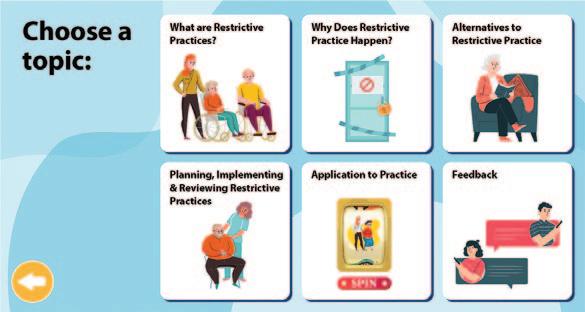
Game-based learning plays a central role, transforming topics like restrictive practices into engaging,
real-world scenarios. Simulations allow staff to explore ethical dilemmas, practice decision-making, and test alternative solutions in a safe, low-pressure environment. This approach enhances critical thinking, teamwork, and retention of essential knowledge.
Peer-to-peer learning further strengthens the training by encouraging staff to share experiences and insights, fostering collaboration and practical problem-solving. This creates a dynamic learning environment where staff feel supported and empowered to deliver compassionate care.
By integrating these modern approaches, care homes can elevate training into a meaningful experience, equipping staff to balance safety with residents’ autonomy and dignity. At Focus Games, we are proud to offer tools designed to empower care home teams through innovative training. Visit www.FocusGames.com or email info@focusgames.com to learn more about our Restrictive Practice resource and how it can enhance care home outcomes for residents and staff alike. For further information see the advert on the front of this issue
By Chris Sparling, Senior Director,

In the care industry, reputation is everything. Choosing a care facility or in-home provider is a deeply personal decision based on location, budget and individual needs. It’s also based on trust. Families rely on providers to deliver quality care, so a strong reputation is essential. In the UK, adult care homes are rated by official bodies like the Care Quality Commission (CQC) and by residents and their families. However, as the CQC undergoes reform, personal feedback and reviews have become critical in offering an unfiltered view of the resident experience.
Selecting a care facility or in-home provider is a deeply personal decision based on trust, location, budget, and individual needs. Families rely on providers to deliver quality care, so a strong reputation is essential.
EMERGING TRENDS IN THE CARE INDUSTRY
The growing reliance on authentic reviews offers facilities an opportunity to set themselves apart and offer the insights prospective patients seek. Yet, a recent research report reveals that in-home care providers average just nine reviews annually, with the top 20% receiving fourteen reviews. This indicates a gap in review engagement that providers can turn into an opportunity.
The difference between a trusted care facility and a questionable
one often comes down to how effectively a provider manages its reputation. Managing various listings and online reviews can weigh heavy on a facility with stretched resources.
ENCOURAGING AUTHENTIC REVIEWS
The true measure of reputation comes from the experiences shared by current and former residents and their families. Proactively soliciting feedback is powerful - 22% of the public report they leave reviews when asked. A steady flow of fresh feedback prevents outdated sentiment from impacting perception. In a market with such high demand for care home places, this could have serious consequences.
Reviews need to be managed and cultivated as part of continuous improvement within customer service, as they’re one of the primary indicators of quality.
BUILDING TRUST WITHIN THE COMMUNITY
It is important that reviews are managed transparently, so providers can build trust with their current and future patients. The same report found that top-performing care providers respond to over 80% of reviews, while the industry average lags at 68%. However, these numbers drop significantly for negative reviews, which is a missed opportunity.
Acknowledging both positive and negative feedback is crucial for building credibility. Doing this will reassure prospects that a facility is open to listening and proactively addressing concerns. Filtering reviews to exclude the negative ones presents an unrealistic image and will deter prospects evaluating whether a facility is the right one for them.
PROMOTING RESIDENT AND FAMILY SATISFACTION
Responding to online feedback is an extension of customer service quality, and many prospective patients seek this level of engagement. By providing thoughtful and timely responses, care providers can
increase customer satisfaction and strengthen their overall reputation.
Facilities that listen to residents and their families, and take proactive steps see improved satisfaction and stronger relationships with those they serve. Addressing negative reviews can even turn challenges into positive outcomes.
Industry leading providers are already leveraging technology to maximise the impact of online reviews. Many automate review responses, ensuring that every reviewer feels respected and appreciated. This approach also eases the pressure on internal resources by streamlining the feedback response process.
Moreover, facilities can use data from reviews to identify strengths and weaknesses, addressing areas of concern proactively. For those with smaller budgets, data-backed insights help allocate funds effectively, so that the focus remains on what matters most to residents and families. Whether that’s staff excellence or a provider’s welcoming environment, marketers should highlight these strengths in their promotional materials, and use customer feedback as a way to validate them.
Care providers should embody their commitment to people-centred service in their online interactions, regardless of whether feedback is positive or negative. Reputation management is a crucial part of this commitment, as it ensures that patients feel valued and heard, while offering sought-after insights to those trying to make big decisions.
With the right tools and strategies in place, care providers can harness the power of online reviews to build trust, improve satisfaction, and build a lasting reputation that resonates with both current and future residents.

In an age where data breaches and cyberattacks are increasingly common, cybersecurity is a critical priority for all organisations, including nonprofits and charities. Protecting sensitive data—such as donor records and beneficiary details—is a round-the-clock responsibility that demands both organisation and vigilance. This is where Security Operations Centre (SOC) systems come into play, offering a powerful way to strengthen your defences, even on a tight budget. WHAT IS A SOC SYSTEM?
A Security Operations Centre (SOC) is a centralised framework—often a combination of software, tools, and processes—designed to monitor, protect, and manage an organisation’s information systems and networks against cyber threats. Whether through in-house teams or external ser-
vices, a SOC uses advanced technologies to detect, analyse, respond to, and prevent cybersecurity incidents in real-time. Why Are SOC Systems Important?
The consequences of a successful cyberattack can be catastrophic, from financial losses to reputational damage, and the risks are growing each year. Cybersecurity is no longer a one-off task but a complex, ongoing effort requiring expertise, proactive monitoring, and rapid response capabilities. For nonprofits and charities, where budgets are often stretched thin, a SOC system offers an efficient solution. It provides 24/7 network monitoring, identifies vulnerabilities before they’re exploited, and helps mitigate threats swiftly, reducing the likelihood of a breach.
BENEFITS OF SOC SYSTEMS FOR NONPROFITS AND CHARITIES
1. Proactive Threat Detection and Response: Equipped with sophisticated tools, SOCs can spot potential risks early and respond immediately, minimising damage.
2. Compliance Support: By monitoring data protection practices, SOC systems help charities meet standards like GDPR or CQC requirements, avoiding costly penalties.
3. Unified Security Management: Many SOC solutions integrate with popular antivirus and network security tools, letting you oversee everything from a single platform.
4. Scalable for All Sizes: Whether your organisation is large or small, SOC systems can adapt to your needs.
SES SOC FREE SYSTEM OFFER
SES Computers, with over 20 years of success in the healthcare sector, believes it’s time to give back. We’re excited to announce a unique opportunity for UK charities and nonprofits: free access to our Security Operations Centre (SOC) services.
No
By Philip Douglas, founder and CEO of Compleat Software

As the CEO of Compleat Software, I have worked closely with care providers and understand the challenges they face, as well as the growing demand for AIdriven solutions reshaping the sector. With rising costs, workforce shortages, and increasing demand for quality care, AI has moved beyond being a trend; it is now essential for sustainability and efficiency.
Recognising this urgency, the UK government has launched initiatives to accelerate AI adoption in healthcare and care homes. The recently announced AI Opportunities Action Plan aims to integrate AI across public services, including the NHS, modernising patient care and streamlining operations. Investments in AI-driven diagnostics, workforce planning, and predictive analytics are already helping to improve health outcomes while reducing pressure on frontline staff.
However, care providers also face financial pressures due to policy changes, such as the National Insurance rise, which significantly impacts workforce costs and operational budgets. The increased employer contributions make it more expensive to recruit and retain staff, worsening an already strained sector. While AI can help mitigate some of these cost pressures through automation and efficiency gains, the sector needs more strategic financial support from the government to ensure AI adoption remains viable.
The recent National Insurance rise has placed additional financial strain on the care sector, which is already grappling with underfunding and workforce shortages. Care providers must now contribute more to employer National Insurance payments, increasing staffing costs at a time when recruitment and retention are critical challenges. This policy change directly affects operational budgets, forcing care homes and domiciliary care services to reallocate resources from patient care to cover additional tax burdens.
AI-driven automation offers a potential solution by reducing administrative workloads and optimising workforce planning. AI-powered HR management tools can help forecast staffing needs and prevent over-reliance on expensive agency workers. Similarly, AI-driven procurement and financial management systems can identify cost-saving opportunities, making it easier for care providers to navigate these financial pressures while maintaining service quality.
Care organisations have long struggled with manual processes that consume valuable time and resources. Whether managing procurement, staffing, or patient care, outdated systems often lead to inefficiencies and high costs. AI is now enabling care professionals to focus on what matters
most, delivering high-quality care. By automating routine tasks, AI improves efficiency, allowing staff to dedicate more time to patient wellbeing rather than administrative burdens.
NHS England Abolition – What This Means for Healthcare Procurement
Keir Starmer’s proposed abolition of NHS England signals a major shift in the structure of healthcare delivery and procurement. While details remain under discussion, the potential restructuring could have significant implications for how care providers source medical supplies, manage contracts, and integrate AI-driven solutions into their operations. A decentralised approach to procurement could offer more flexibility but may also lead to inconsistencies in funding and support for AI adoption across different regions.
For care providers, this change underscores the importance of AI-driven procurement systems that can quickly adapt to evolving regulations and supply chain challenges. AI-powered platforms can streamline vendor management, track spending trends, and ensure compliance with new procurement policies, helping care organisations navigate this transition more effectively.
AI FOR WORKFORCE PLANNING AND HR MANAGEMENT
Staff shortages and high turnover rates have long been challenges in healthcare. AI-powered predictive analytics are now assisting HR teams in anticipating workforce needs, reducing staff turnover, and improving job satisfaction. AI-driven tools also streamline shift planning, ensuring optimal staffing levels and reducing the strain on care professionals. Virtual assistants are further relieving administrative burdens by handling routine HR inquiries, allowing staff to focus on more meaningful work.
ENHANCING PATIENT CARE THROUGH AI
Beyond finance, AI is transforming patient care. Electronic health records (EHRs) powered by AI can detect health risks early and recommend proactive interventions. By analysing patient data in real time, healthcare professionals can make faster, more informed decisions, reducing hospital readmissions and improving patient outcomes. AI-driven care management tools allow care facilities to maintain high service levels while optimising costs.
AI-POWERED VIRTUAL ASSISTANTS AND PATIENT ENGAGEMENT
AI-powered virtual assistants are also improving patient engagement. These tools help with medication reminders, appointment scheduling, and answering health-related queries, providing round-the-clock support. By handling these routine interactions, AI reduces the strain on caregivers, enabling them to focus on more complex patient needs. The result is a
more efficient system where patients receive timely assistance while care professionals are freed from repetitive administrative tasks.
PREDICTIVE ANALYTICS IN PREVENTATIVE CARE
One of the most exciting AI applications in healthcare is predictive analytics for preventative care. AI can analyse vast amounts of patient data to identify individuals at risk of developing serious health conditions. Early intervention helps reduce hospitalisation rates and improves long-term health outcomes. Some care facilities have already prevented emergency hospital visits by detecting subtle behavioural changes that might otherwise go unnoticed. This proactive approach not only saves lives but also alleviates financial pressure on healthcare providers.
AI FOR INDEPENDENT LIVING AND REMOTE MONITORING
The UK government is also investing in AI-driven technology to support independent living. AI-powered sensors can monitor daily activities in care homes, identifying unusual patterns and alerting caregivers when needed. This technology helps vulnerable individuals live independently for longer while reducing the burden on residential care services.
AI has also revolutionised remote monitoring and telemedicine. Wearable health devices now use AI to track patient vitals in real time, allowing healthcare professionals to identify potential health concerns before they escalate. This proactive approach is particularly valuable for elderly patients and those with chronic conditions, reducing hospital visits and improving overall patient wellbeing.
The future of AI in healthcare is vast, with continuous advancements reshaping the sector. From robotic caregivers assisting with daily tasks to AI-driven mental health support systems, innovation is driving a smarter, more efficient, and compassionate care model. Organisations that embrace AI today will be at the forefront of this transformation, positioning themselves as leaders in the evolving care landscape.
For care providers considering AI adoption, now is the time to act. AI’s ability to optimise processes and elevate care quality is already evident, and as technology advances, it will become an integral part of delivering high-quality care in an increasingly demanding world.
By leveraging AI, we are not just reducing costs; we are enabling a future where care professionals can focus on what truly matters: improving the lives of those they serve. The care sector is evolving rapidly, and AI is at the heart of this transformation. Those who embrace it now will shape the future of healthcare for generations to come.


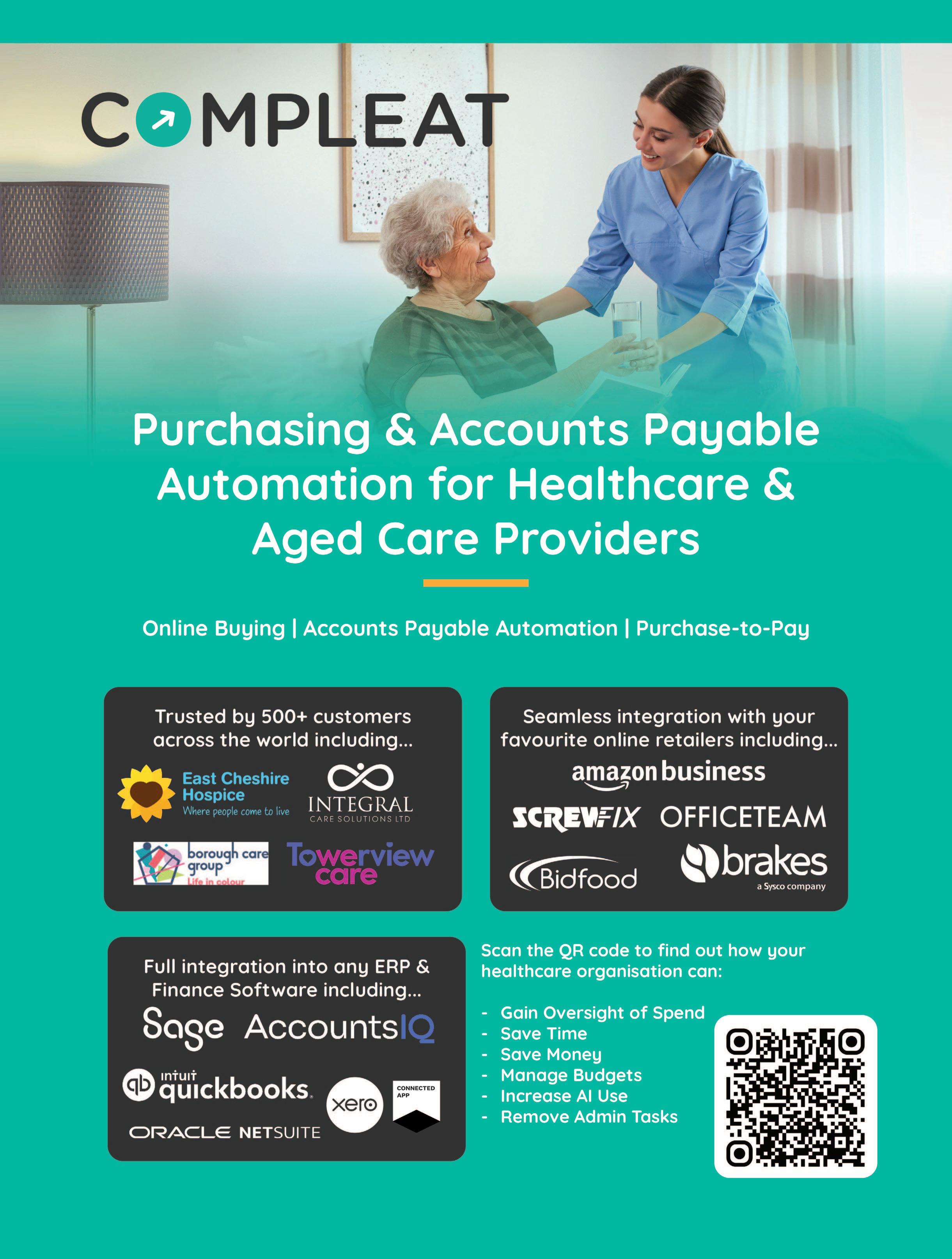
The social care sector is evolving at an unprecedented pace, driven by increasing demand, tightened budgets, and the need to deliver exceptional care outcomes. At the heart of this shift lies digital transformation—a holistic approach to overhauling care operations, processes, and culture through the integration of modern technologies.
Far from simply replacing manual tasks, digital transformation reimagines how organisations operate. Tools like Digital Social Care Records (DSCRs) represent just the beginning. By adopting interoperable systems and cloud-based solutions, care providers can achieve seamless coordination across departments, optimise resource allocation, and ensure high-quality care. Processes such as care planning, rostering, compliance reporting, and data management become more efficient, freeing up teams to focus on providing person-centred care.
Digital solutions also offer significant benefits. Faster service delivery reduced administrative burdens, and more informed decision-making results in better care experiences for service users and care providers alike. For instance, interoperability enables real-time data sharing across platforms, reducing errors while providing a unified view of the organisation’s operations. This empowers leadership to make critical decisions backed by accurate, holistic insights. Additionally, tools like single sign-on (SSO) and multi-factor authentication bolster security, ensuring confidential data remains protected while reducing day-to-day inefficiencies for users.
PASS supports over 1,000 care providers every day, giving them access to market leading care management tools hand in hand with unlimited 24/7/365 support from our dedicated and friendly PASS team.

Assured by NHS Transformation Directorate, PASS provides a secure platform that allows you to plan, record and evidence the care you deliver. The only assured solution built specifically for the home care sector, it provides comprehensive real-time functionality and allows you to share progress against outcomes with customisable, exportable reports.
CARE PLANNING AND ROSTERING FROM A SINGLE PLATFORM

For social care providers, the move toward digitalisation represents an investment in long-term sustainability. Enhanced efficiency helps reduce operational costs, allowing resources to be reinvested in vital areas such as workforce development or service user engagement. Standardised digital frameworks also simplify the complexities of acquiring new services or locations, ensuring continuity of care during periods of growth. Choosing a digital partner who understands the complexities of care is essential to navigating this transformation successfully and tailoring solutions to the unique needs of the sector.
However, the path to digital transformation requires a clear roadmap. Providers must assess their needs, define a vision, and secure stakeholder buy-in. Selecting the right software and delivering effective training is equally critical to ensuring a smooth transition. Continuous monitoring and adjustment allow providers to refine their approach, fostering a culture of improvement and resilience.
By adopting integrated intuitive software solutions, social care providers can not only stay ahead of industry challenges but also lead the way in delivering exceptional, sustainable services. Digital transformation may not solve every challenge, but its potential to enhance care quality, operational efficiency, and financial health is undeniable.
Download our guide to digital transformation with the QR code.
To meet the wider needs of the PASS community All-in-one PASS has recently been launched , bringing advanced rostering functionality to our established digital care planning platform. As a result advanced staff scheduling, payroll and invoicing functionality is now seamlessly linked with care planning and reporting, reducing the technical complexity, risk and overhead associated with integrating two separate systems.
As a result, PASS now provides an all-in-one suite of digital care management tools, available from a single platform, designed to:
Save you time
Increase the efficiency of your teams
• Improve the quality of care
Deliver better outcomes

Our commitment to the continual evolution of PASS is further illustrated by the addition of GP Connect. The first product of its type to offer this feature, PASS is still one of only a handful of digital care
management solutions to have completed this NHS Digital integration, and is the only one offering it to the home care market.
PASS GP Connect provides authorised social care staff with realtime access to their client’s GP records. It makes medical information available when and where it is needed, leading to improvements in both care safety and outcomes:
Visibility of allergies, vaccinations and medications, especially useful for clients unable to reliably share their personal information
Using medical information to inform care planning
Ensuring that the right medication is delivered to the right person in the timeliest manner. In one case, this allowed the administration of antibiotics on a Friday evening, aiding the service user’s swift recovery from infection
Available to all PASS users at no additional cost, PASS GP Connect is significantly more efficient than waiting for a GP response. It’s also a positive step forward on the path to the DHSC’s goal for widespread digitally enabled care and is in full alignment with their ambition for joined up care for everyone.
Get in touch: www.everylifetechnologies.com hello@everylifetechnologies.com





By Fozia Iqbal, Senior Business Immigration Solicitor at

Reports of exploitation, including unfair wages and poor working conditions, have drawn increased government attention to the treatment of overseas workers in the care sector. With a critical staff shortage, many businesses depend on international recruitment to fill vacancies, adding to concerns about worker welfare.
The Home Office has intensified its crackdown on non-compliant employers, with severe consequences for those who fail to meet legal and ethical obligations. Compliance with immigration and employment laws is no longer just an administrative requirement but an essential strategy for protecting business operations, reputations, and, most importantly, the wellbeing of workers.
To hire overseas care workers legally, care business owners must navigate a complex regulatory framework. They must obtain a sponsor licence issued by the Home Office, through which they can sponsor overseas health and care workers for a Skilled Worker visa, which is the primary route for recruitment, but this visa comes with strict sponsorship obligations. Employers must make sure that all hired workers have valid visas and are working in compliance with their visa restrictions and their sponsorship. Employers would need to implement correct right to work check policies and ensure they are meeting minimum salary requirements, can provide work that meets the contractual hours of work offered, and the employees are undertaking duties which fall strictly within the role for which they have been sponsored.
Additionally, all employers must ensure that their employees’ employment conditions align with legal requirements, for instance, providing safe working environments, adequate training, and following proper recruitment procedures. Fundamentally, overseas workers must receive their full rights and entitlements such as fair pay, breaks and leave, with no discrimination. Any deviation from these standards can place a business at significant risk.
THE GOVERNMENT’S CRACKDOWN ON NON-COMPLIANCE
The UK government is taking decisive action against care providers who fail to protect overseas staff. Increased inspections and audits are being carried out, with penalties ranging from significant fines to licence revocations and outright business closures. Employers found guilty of exploitation or modern slavery
offences face criminal prosecution, and businesses that lose their sponsor licences will lose their sponsored workers and be unable to hire overseas staff in the future.
In addition to heightened inspections, the Home Office is working closely with other regulatory bodies to share intelligence and data on non-compliant practices. This collaboration enhances the government’s ability to detect irregularities and enforce penalties swiftly, ensuring that any rogue employer faces immediate consequences. Such coordinated efforts not only deter potential offenders but also reassure compliant businesses that the sector is being rigorously monitored.
This increased enforcement underscores the necessity for care home owners to maintain high standards of employment practice. Failing to comply with legal obligations does not only jeopardise individual businesses but also tarnishes the reputation of the sector as a whole.
ETHICAL EMPLOYMENT:
Beyond legal obligations, treating overseas workers ethically is a crucial element of running a successful business. Providing fair pay, ensuring reasonable working hours, and fostering a safe and supportive environment contribute to higher job satisfaction and better staff retention. In an industry where continuity of care is essential, a stable and motivated workforce is invaluable.
Ethical employment also enhances a business’s reputation. Care businesses known for fair treatment of staff find it easier to attract both workers and clients. By proactively adopting fair employment practices, organisations safeguard their operations from legal risks and cultivate a more committed and engaged workforce.
To protect your business and your staff, you should regularly review your employment practices. By conducting internal audits, training staff on compliance obligations, and seeking professional legal guidance, you can help ensure ongoing adherence to the law. Being proactive in compliance not only mitigates legal and financial risks but also encourages a positive workplace culture.
Looking to the future, it is vital for care providers to establish a culture of continuous improvement in compliance. Regular training sessions, clear communication of legal updates, and robust internal controls can help your business stay ahead of regulatory changes. Embracing technology to monitor recruitment and employment processes further supports transparency and accountability, ultimately benefiting both your staff and the reputation of your business.
As the government continues its strict stance on non-compliance, you should take immediate action to ensure your recruitment and employment processes align with legal and ethical standards. Now is the time to assess your business’s current practices, implement necessary improvements, and secure the future of your business by treating overseas workers with the fairness and dignity they deserve.
By Katarina Morgan, Associate Solicitor at Taylor
Walton Solicitors (www.taylorwalton.co.uk)

An issue which frequently arises for care home operators is when they need to make a financial claim against the estate of a deceased resident for unpaid or outstanding fees. This can be complicated if the former resident was married but most of their assets are tied up in the marital home which their spouse still lives in. Another common situation is where there are insufficient funds left in the estate and the former resident would have qualified for Local Authority funding had they survived.
To manage these situations effectively, it is best practice to maintain good records of the contractual terms agreed, of fees due and invoices raised and what is outstanding. This helps prevent parties disputing the quantity of the bills, or where executors were unaware of what had been agreed.
It is hoped the care home operator has a good rapport with the deceased’s family so they can sensitively approach them with the outstanding invoices and ask them to be included as debts of the Estate. This helps probate practitioners and will assist with debt recovery when the Grant of probate has been obtained. Thankfully in recent months it is now a faster process following the delays which built up following the Covid pandemic. If the deceased owned a property (either under marriage or not), then there may be a right to pursue the debt against their asset. It would need to be considered if they died with a Will, whether a life interest trust was created under that Will (i.e. if people are still living in the house), and how the property was
owned and how much of it was owned by the deceased, whether there is any outstanding mortgage or equity release scheme in place. It is for this reason why good contractual terms need to be set out clearly and what happens in these circumstances.
If there are insufficient funds in the Estate, then the Estate will be insolvent. This means that the debts will be paid in a certain order:
o Secured creditors: mortgages or secured loans
o Funeral expenses: reasonable and proportionate to the size of the Estate
o Testamentary expenses: administrative costs
o Preferred and preferential debts: employee wages for example (not likely to apply)
o Unsecured creditors: care home fees, bank loans, other debts
o Interest on unsecured loans
o Deferred debts: informal loans between family members
If Local Authority funding may have been available, then the administrator of the deceased’s Estate (executor or administrator) may be able to make a retrospective claim. They will have to apply to the Integrated Care Board (ICB) which is the NHS body that assesses eligibility for NHS Continuing Healthcare funding where there is a need. That person will need to contact the ICB for guidance on how to deal with previously unassessed periods of care. It is likely that this may take a number of weeks if not months to be resolved and it would likely to be challenged given the universal squeeze on public budgets. Prevention of debts building up is always the best option, but it is not always avoidable. Ultimately having good, clear contractual terms which explain what has been agreed in terms of fees and when they can expect to be recovered and how is essential for every care home operator. Each case will of course depend on its
On-Demand Pay is now offered by almost a third of care providers in the UK. But why?
For many employees, payday isn’t just about receiving their earnings –it’s about catching up. Covering overdue bills, managing unexpected expenses, and paying off debts such as credit cards. With nearly 1 in 4 workers unable to pay an unexpected bill of just £100, financial stress is a growing challenge directly impacting businesses and their employees alike.
On-Demand Pay, also known as Earned Wage Access, allows staff to access some of their earned wages before payday. All without impacting their employer’s cashflow or payroll processes.

In addition to supporting staff, there are many tangible business benefits for care providers who opt to introduce this fast-growing employee benefit. Notably, by rewarding overtime more quickly you incentivise uptake; significantly lowering agency spending as in-house staff are motivated to cover more of the shift rota themselves.
HELPING EMPLOYERS HELP THEIR EMPLOYEES
Level are On-Demand Pay specialists for the care sector, working with the likes of Agincare, Home
Instead, Bluebird, Hollybank Trust and Bracebridge Care Group, to name a few. We understand the unique
challenges of the sector – from managing high staff turnover, to the nuances of franchising and dealing with agencies.
“We are really loving Level so far and our staff have nothing but praise for it. It’s also helping to cover our rotas as staff now have instant access to any overtime they may do rather than having to wait” – Bluebird Care. On-Demand Pay helps employees manage their finances without resorting to costly overdrafts, credit cards, or payday loans. For example, one of Agincare’s carers said that:
“Things have been a struggle as I'm a single parent. When I had a car issue it became very useful to be able to access my pay early.” SEAMLESS INTEGRATION WITH PAYROLL & WORKFORCE
Level’s On-Demand Pay is a market-leading solution. With existing integrations with many of the UK’s leading HR, rota and payroll systems, Level can offer a fully automated solution. Integrations with software like Sona, IRIS, Birdie, SAP, Humanforce and Planday make the setup and go-live process quick, simple and easy. This means you can offer staff flexibility without adding an extra administrative burden on your payroll team. For further information, visit www.levelft.com
"23 years, operating 4 Devon Nursing homes, has been pretty tough, as anyone in social care, knows, only too well. And if it was hard already, after 2024 budget, it's just got harder.

Anyway, at heart, I am just customer of Eden Alternative, and it was a stroke of luck to come across this whilst on holiday in New Zealand in 2009. It started in USA in 1994 and now runs in 22 countries.
The fact that I am now involved with this not-for-profit organisation (in the UK area) came about when one of the 2 main UK directors died suddenly just before Covid. But it's something I have run with for 11 years to help make 'vision' a reality, not a struggle. So, being both a customer and helping the admin seems quite natural.
It is a modern philosophy of care, but moreover, it's a pro-
gramme that is straight forward, tried and tested for 30 years and really works.
Its member care organisations generally become trainers for their own teams, and run it themselves. The programme is run in person over 2-3 days or online 1 hr a wk for 7 weeks. You choose. It addresses loneliness, helplessness and boredom and operates through 10 principles to underpin 7 critical domains of wellbeing.
Moreover, it's effective, transformational and really works. As residents, and team members wellbeing, matter so much , it's a must, in my opinion.
Geoffrey Cox Southernhealthcare.co.uk eden-alternative.co.uk"

Global assists clients throughout the U.K. who specialise in the healthcare sector to achieve their objectives of purchase, development and refinance.

We have organised over £1.8bn for clients in the past 30 years, providing clients with competitively priced funding to refinance existing debt, ease cashflow and develop businesses further.
From helping clients make their first purchase through to allowing groups to grow significantly in size we assist at every stage of your business expansion. Every proposal is individual and deserves to be treated that way, so we hope you will allow us to be of assistance to you and call us to chat through your plans and requirements, I am sure we will be able to tailor a facility to your requirements.
Call us on 01242 227172 or e-mail us at enquiries@globalbusinessfinance.net
